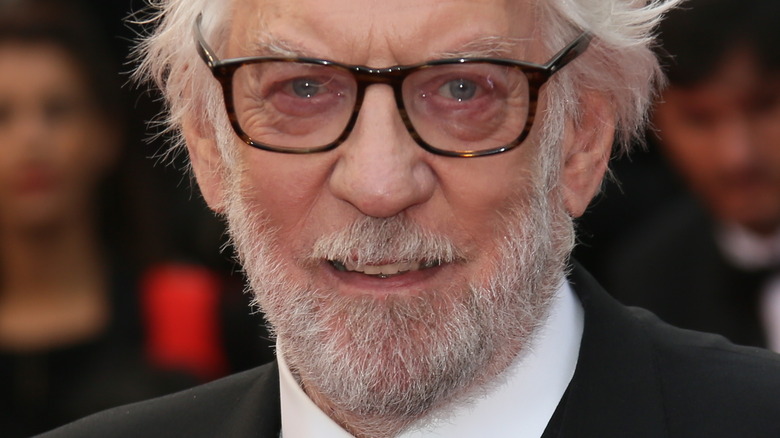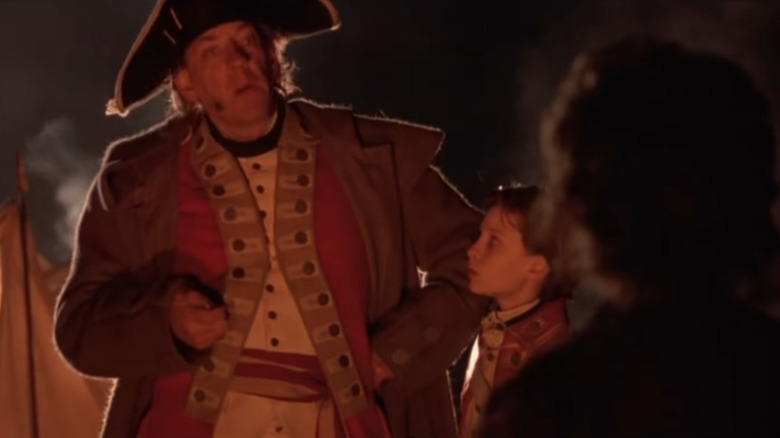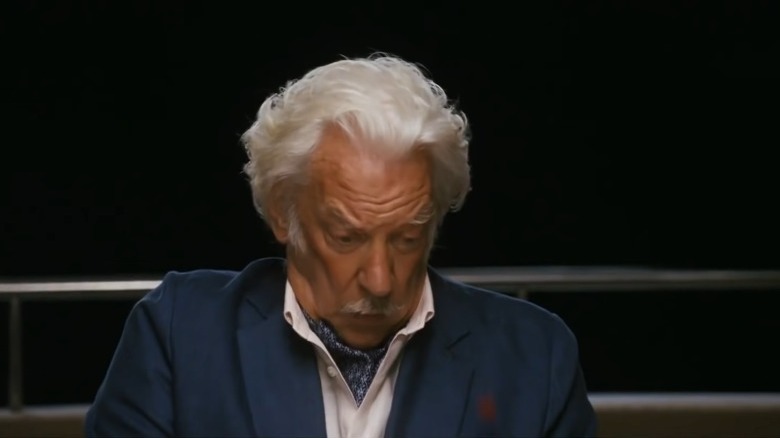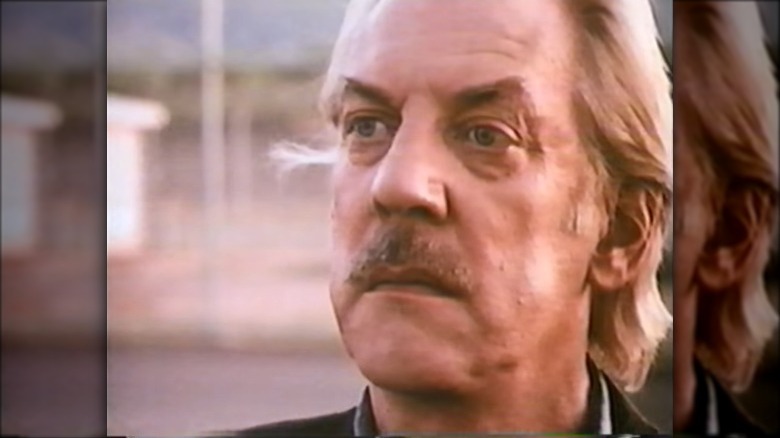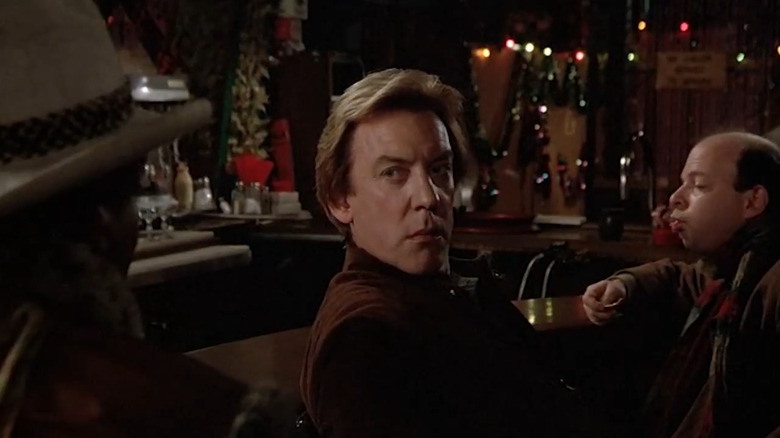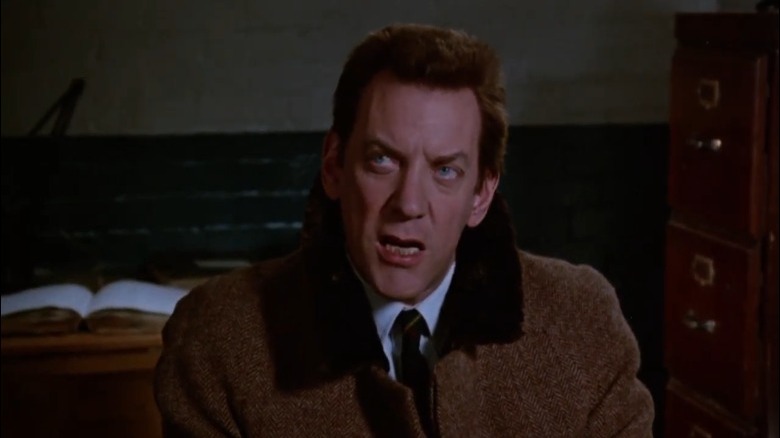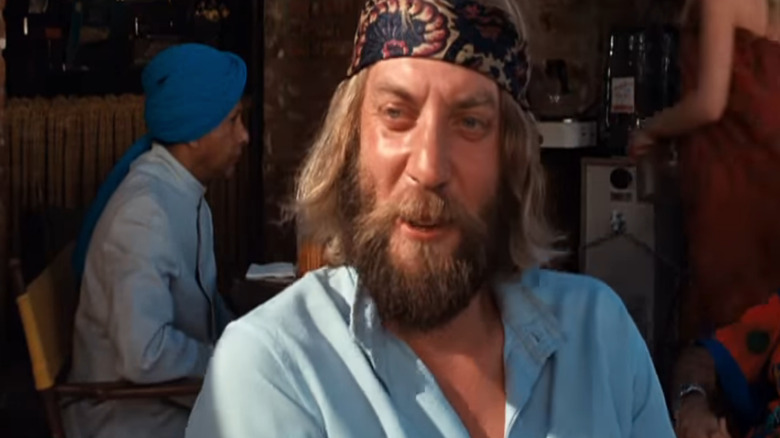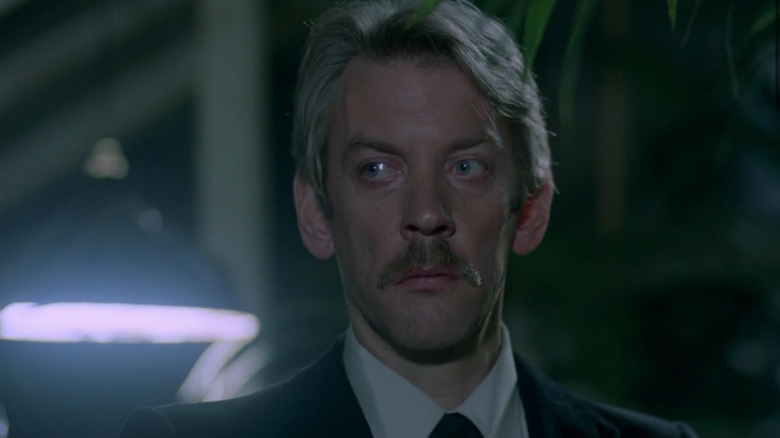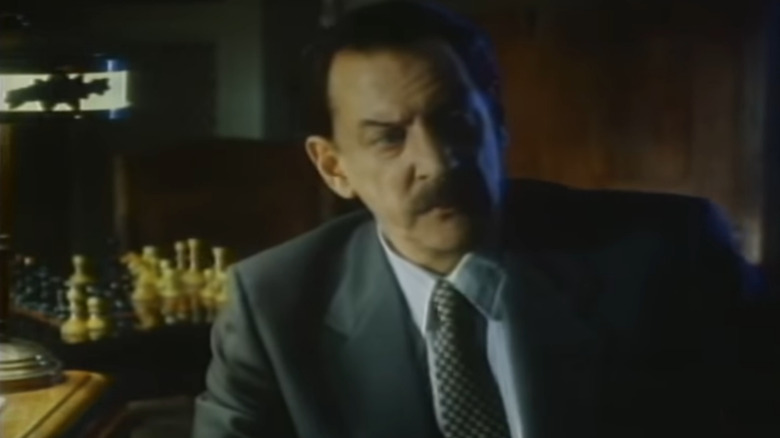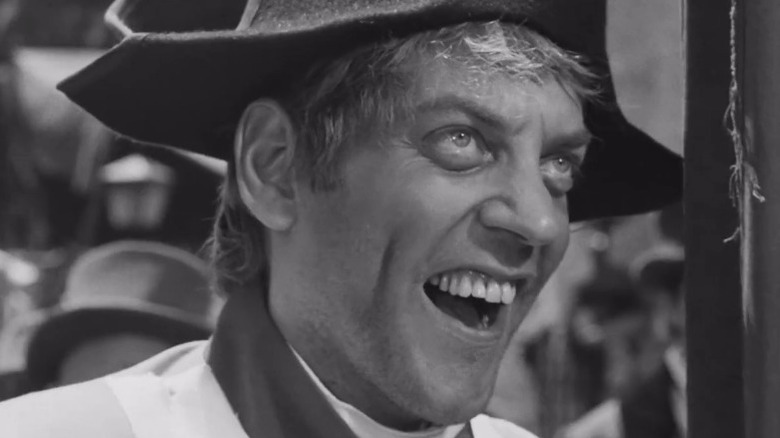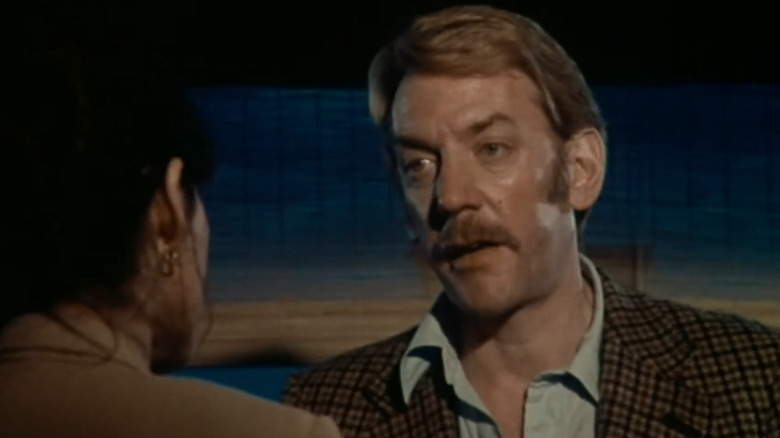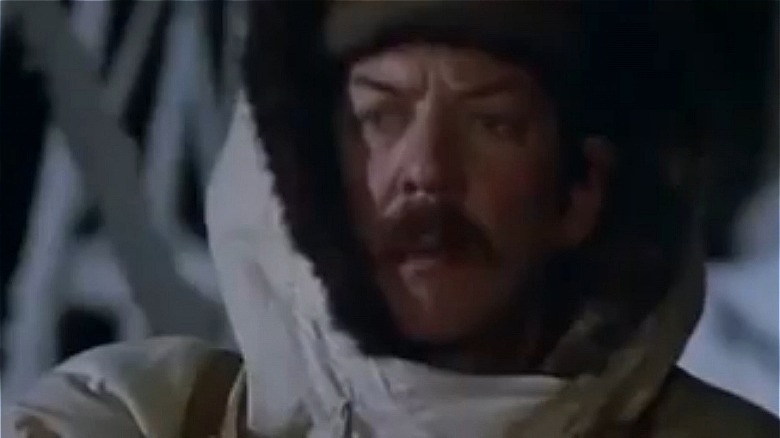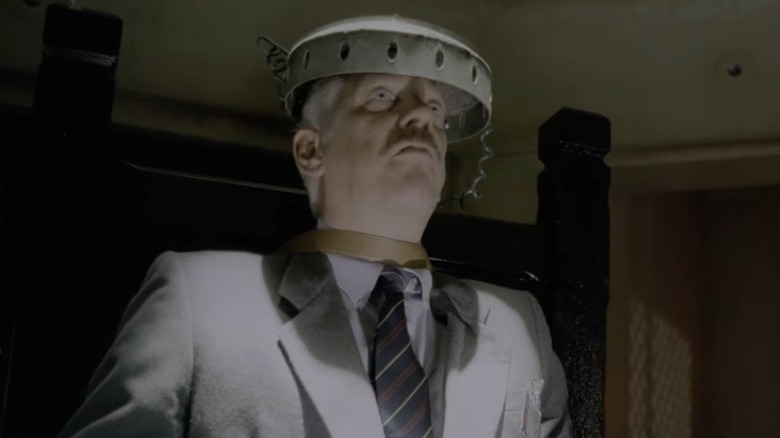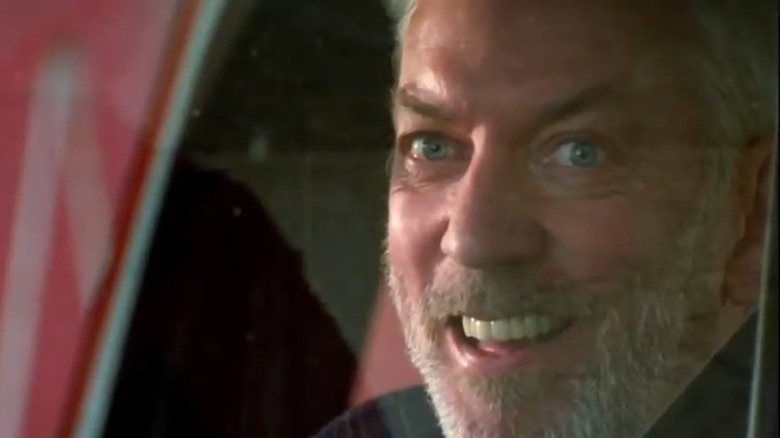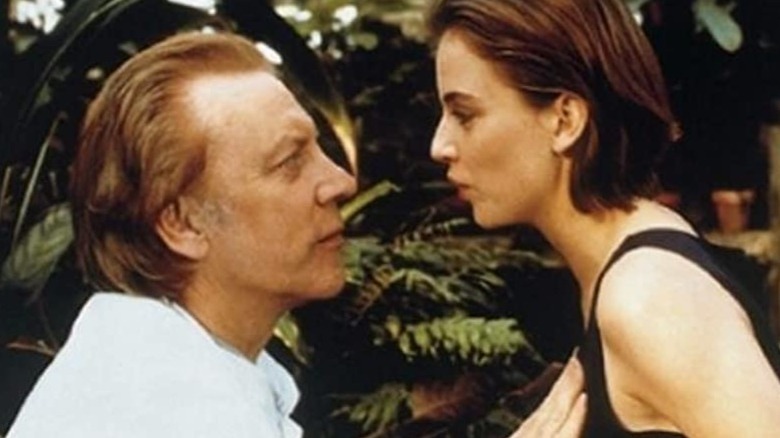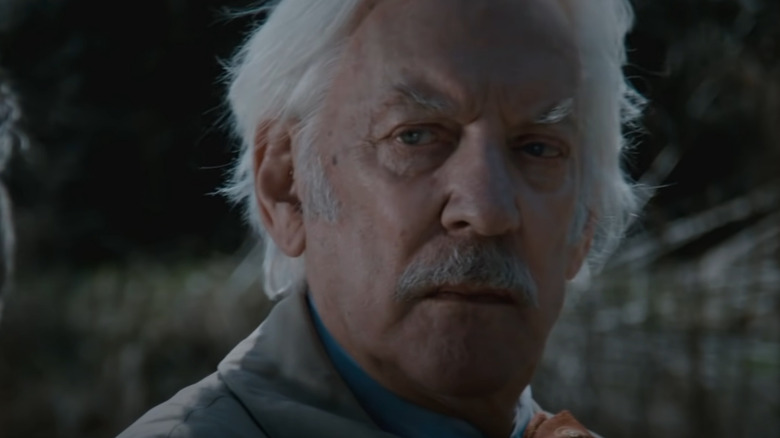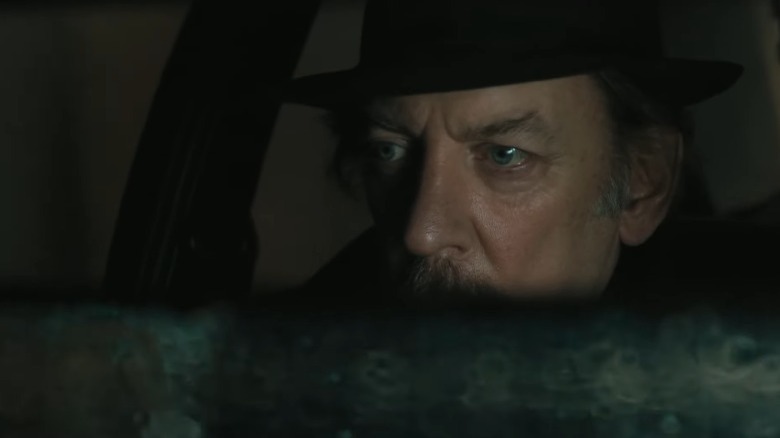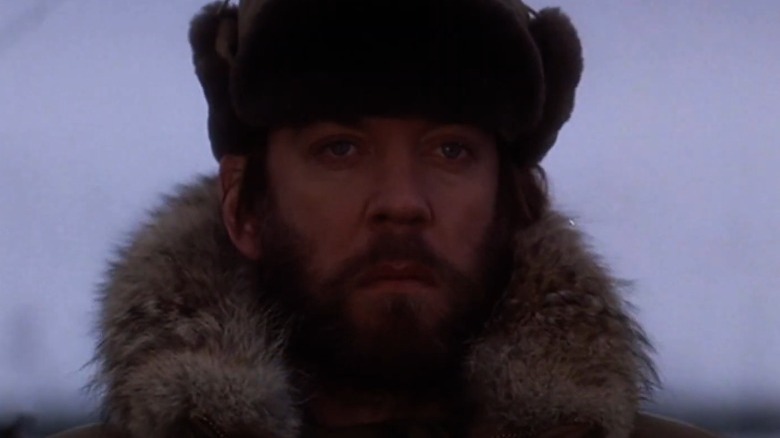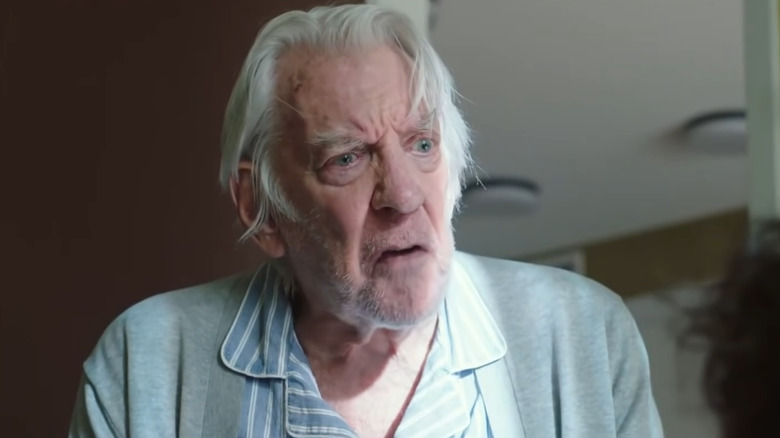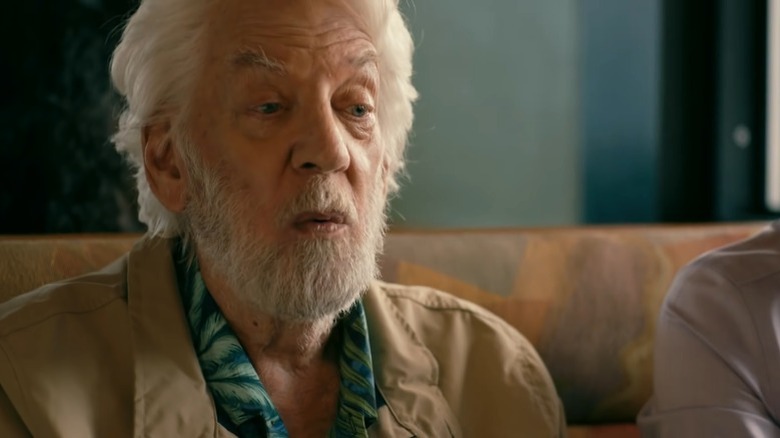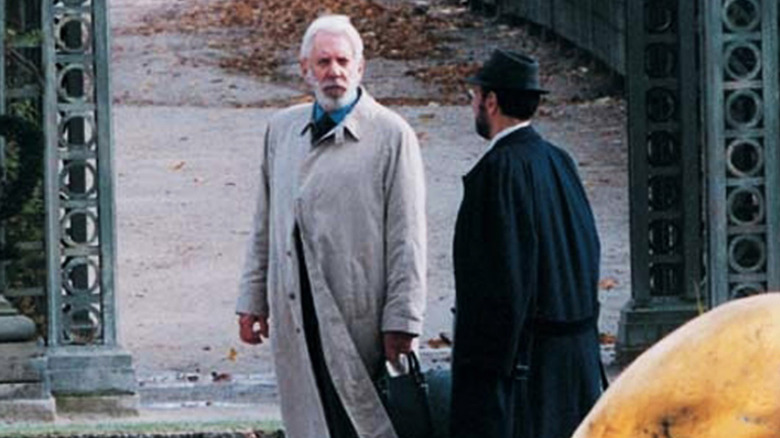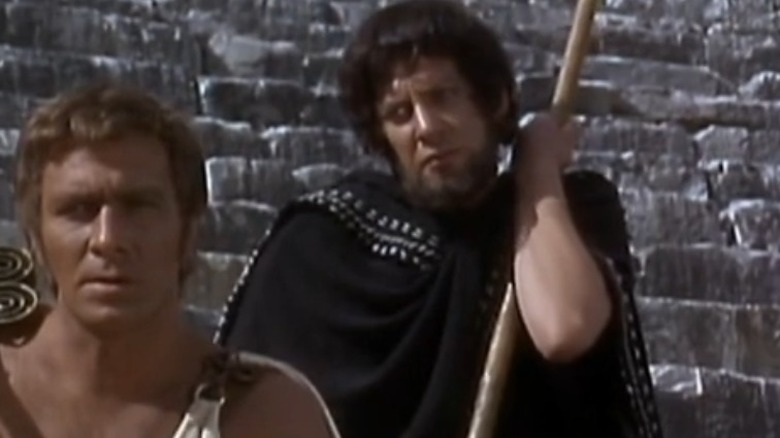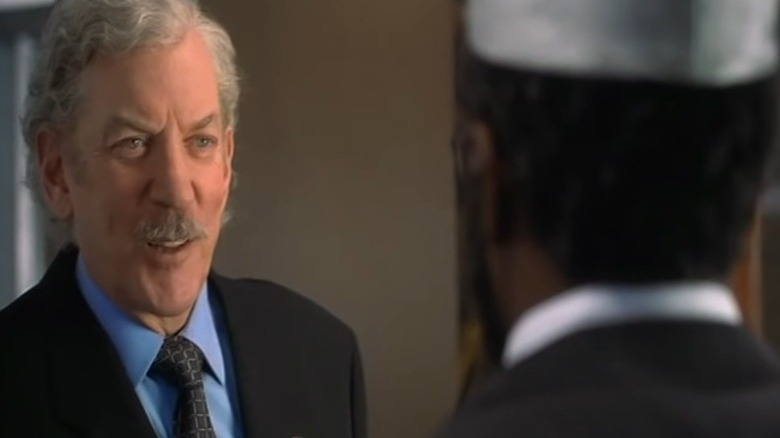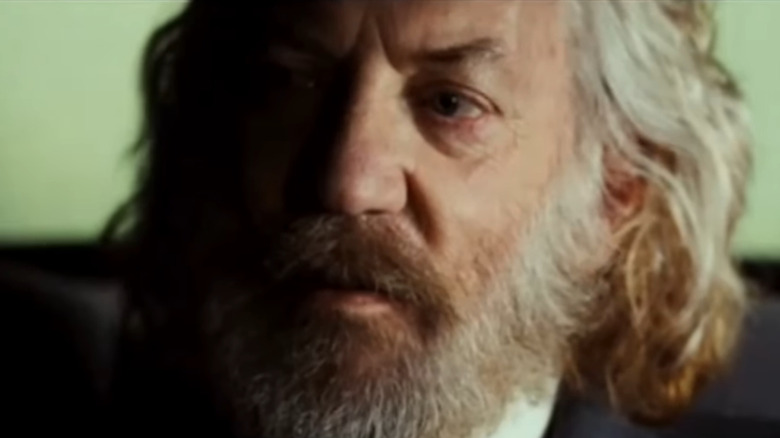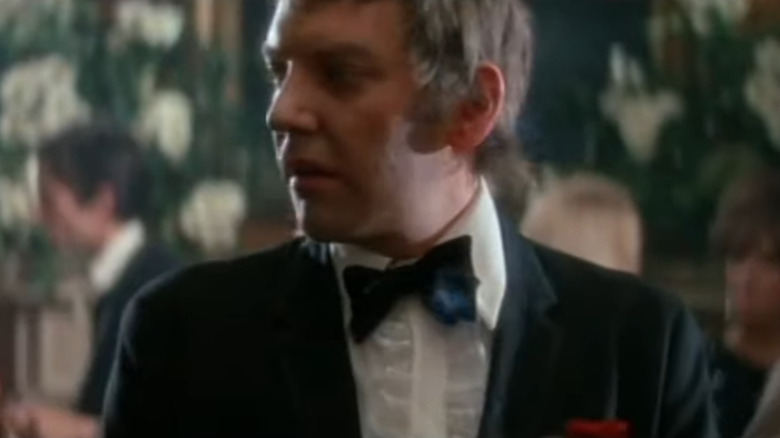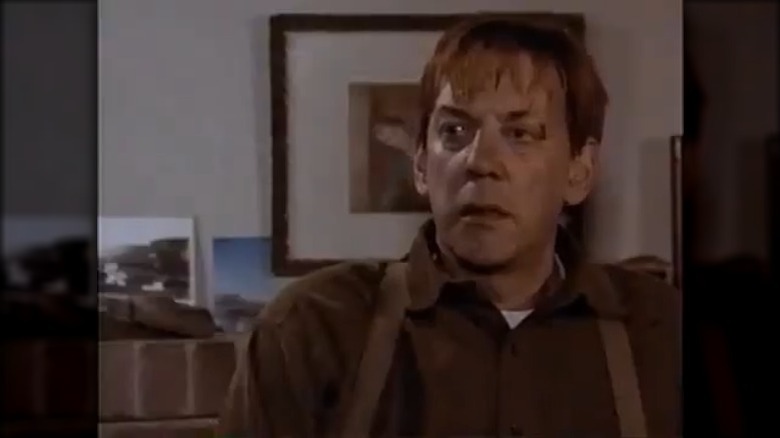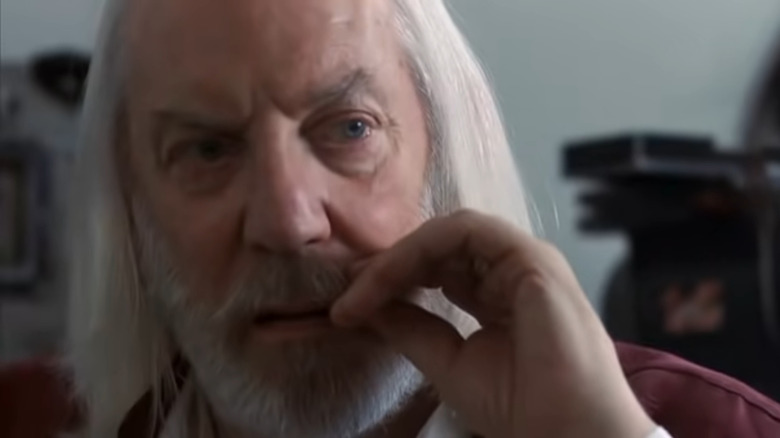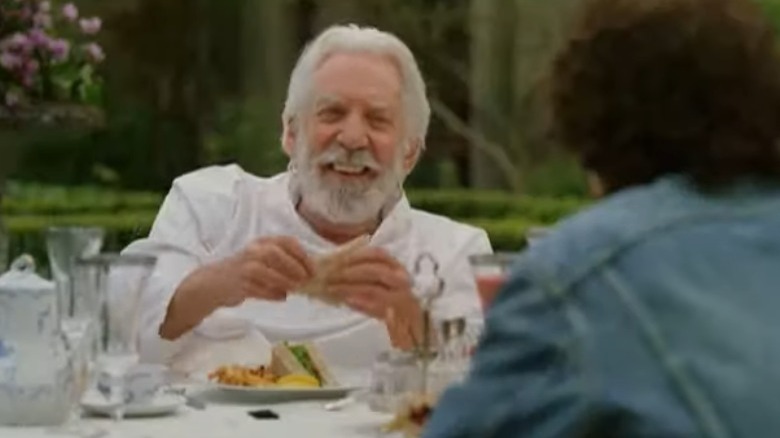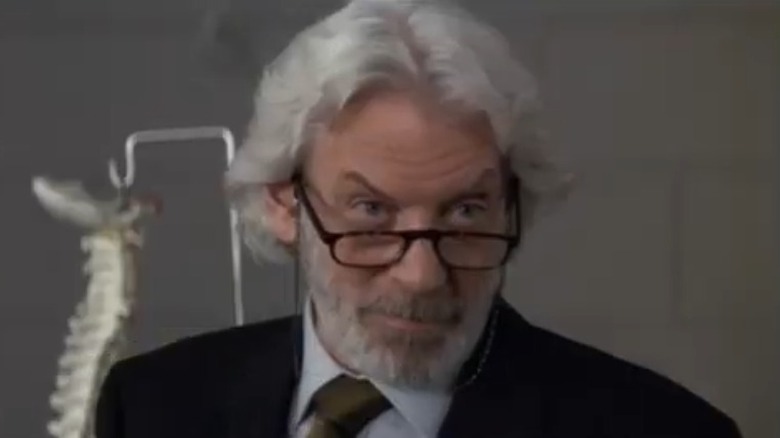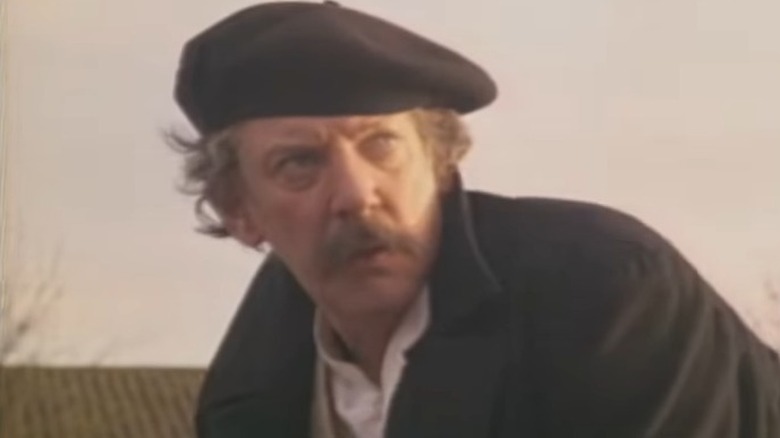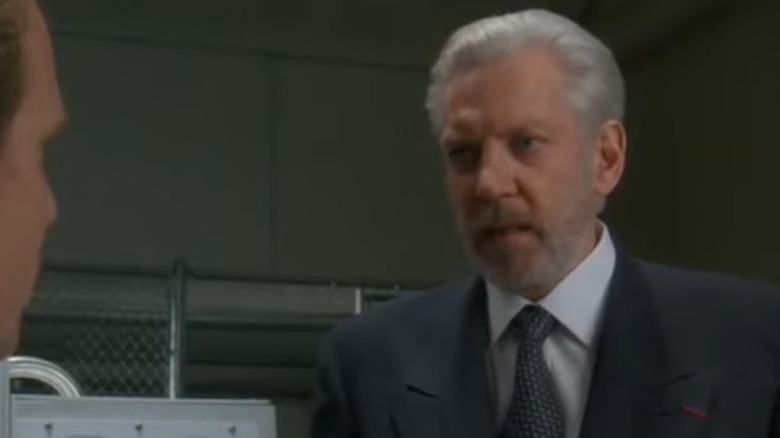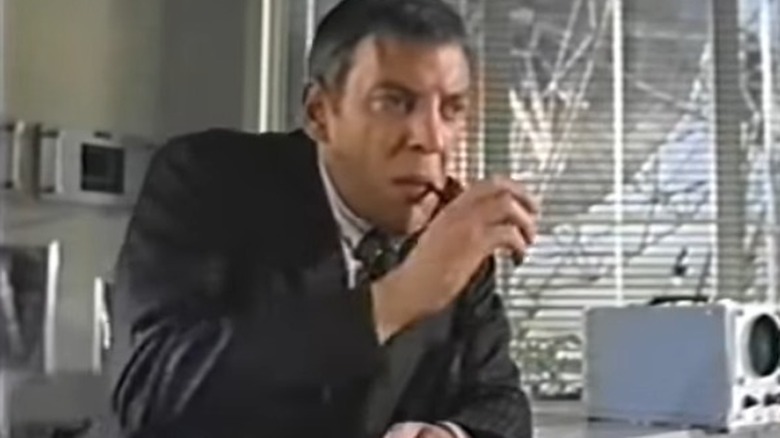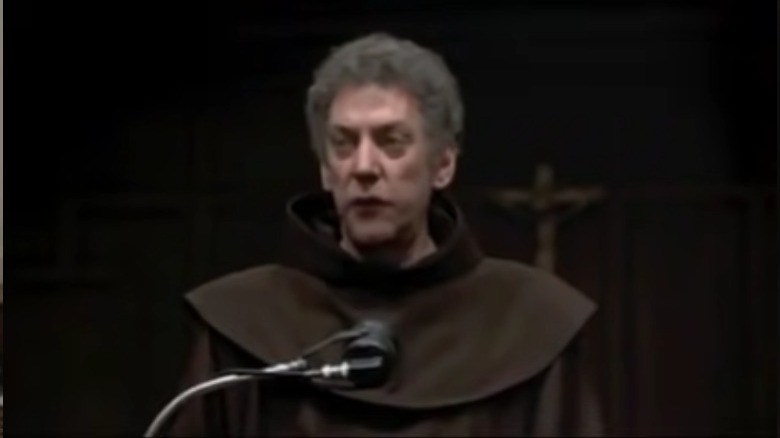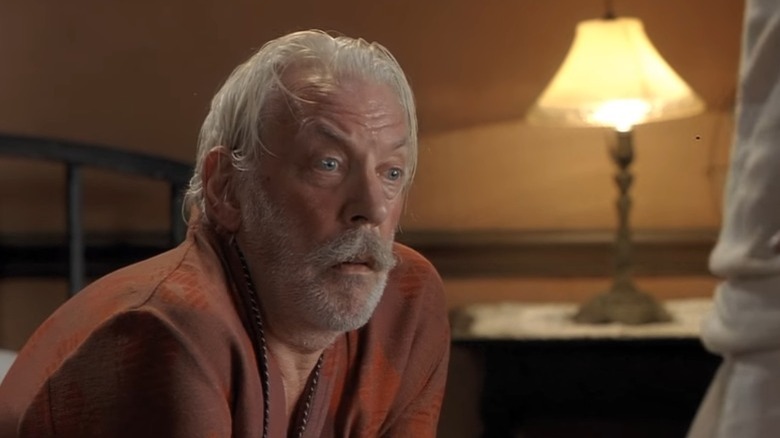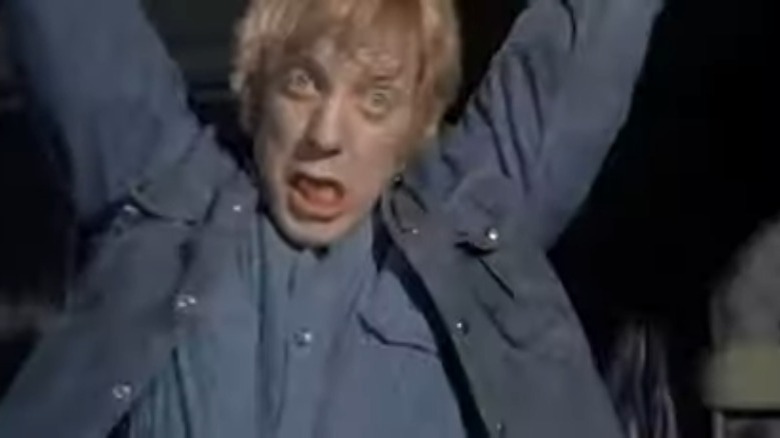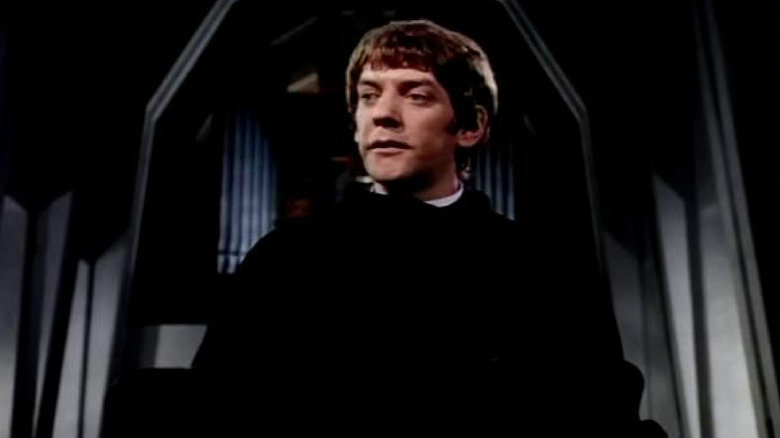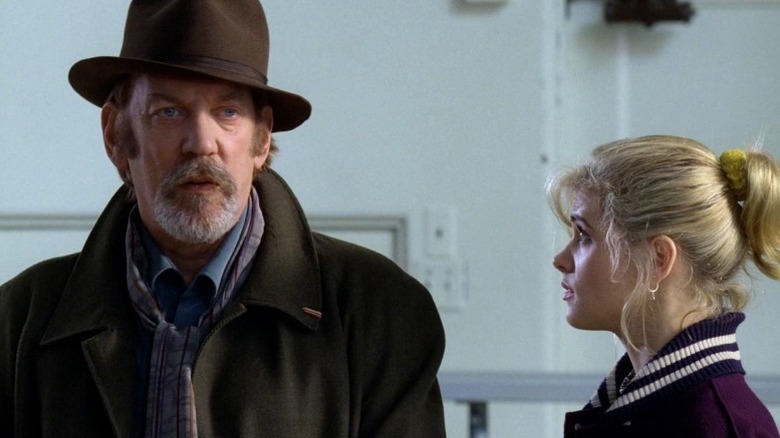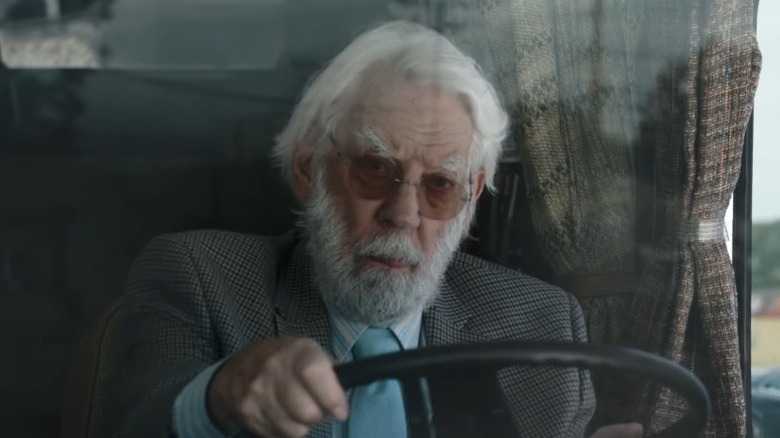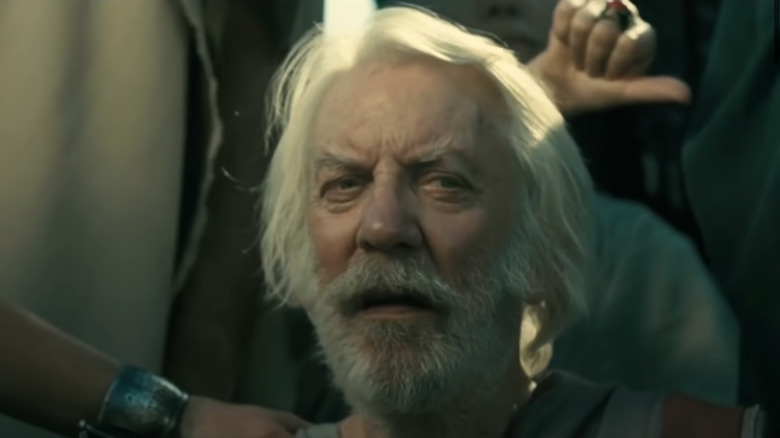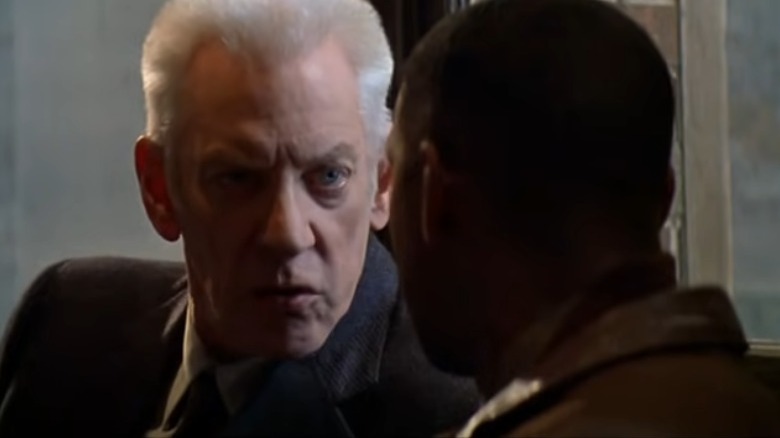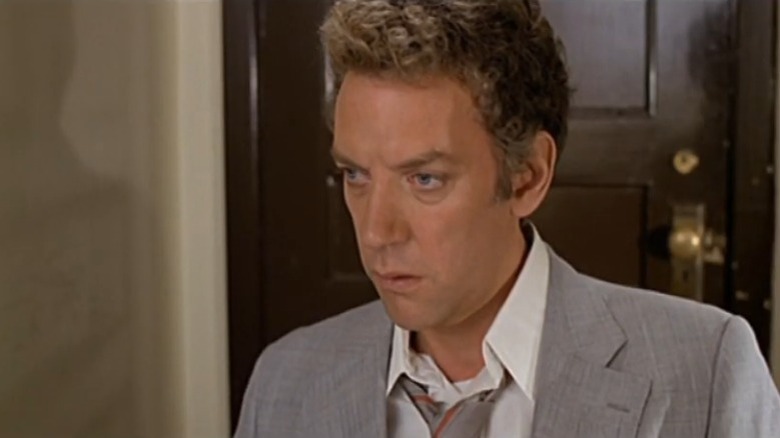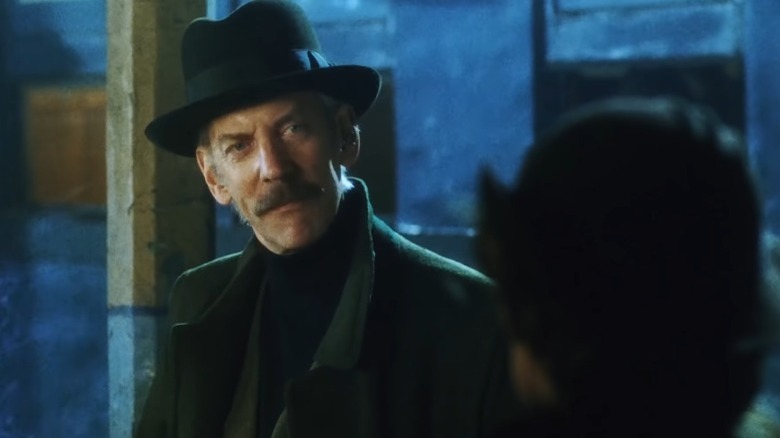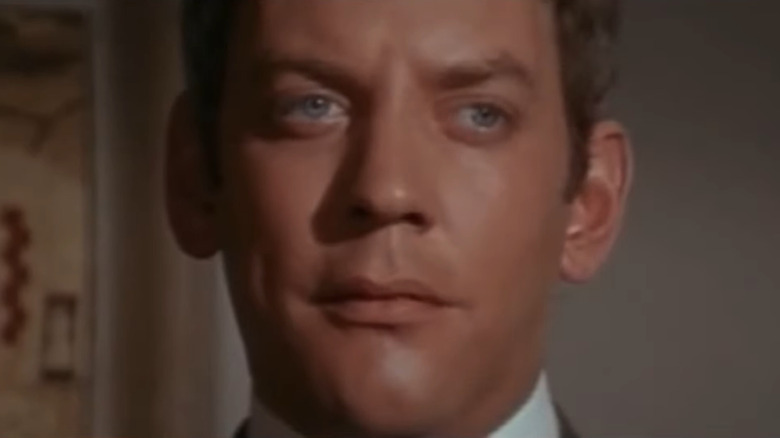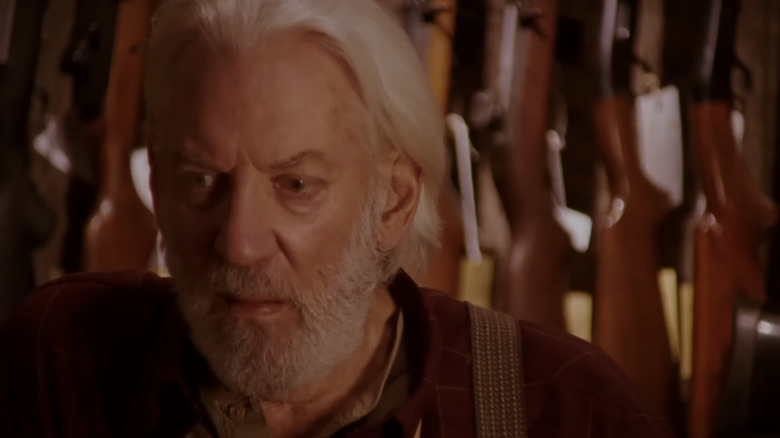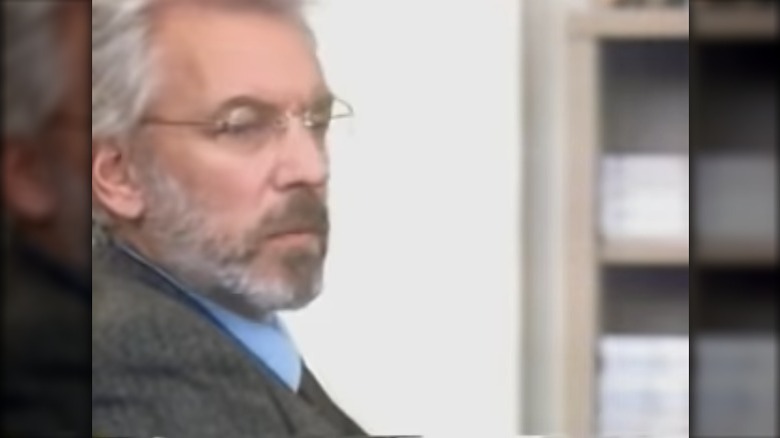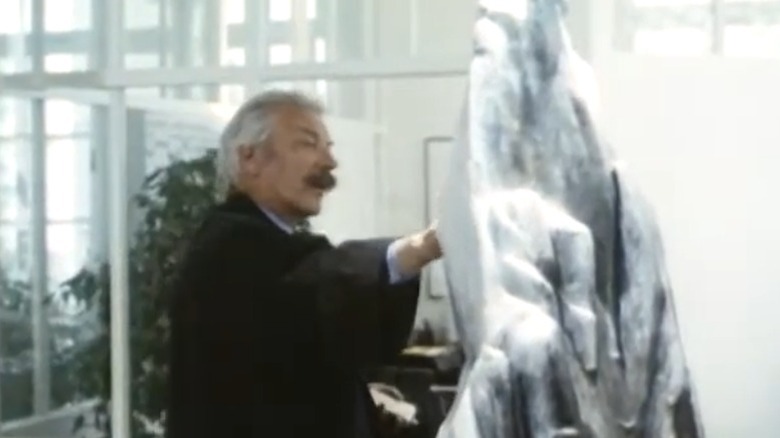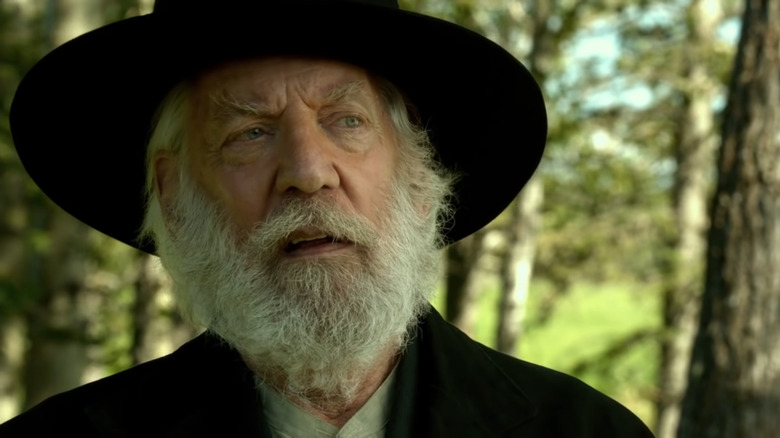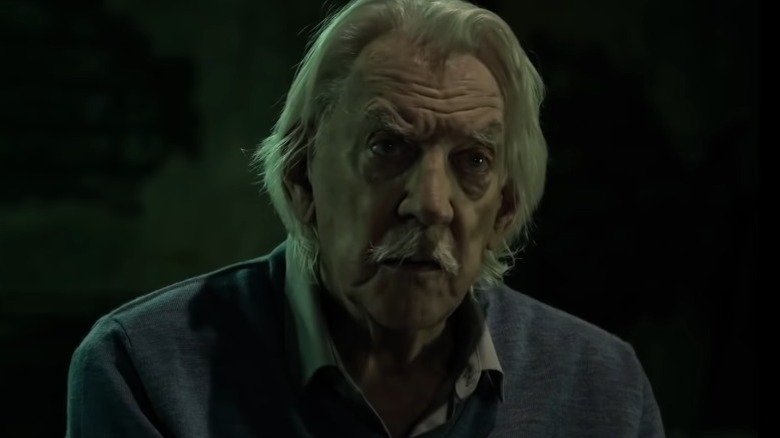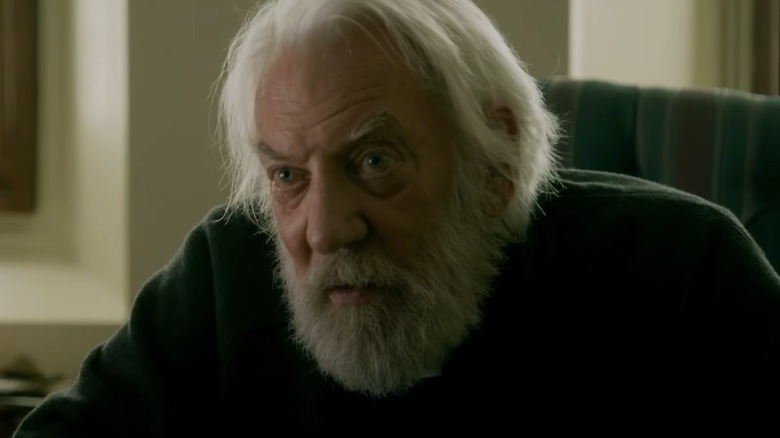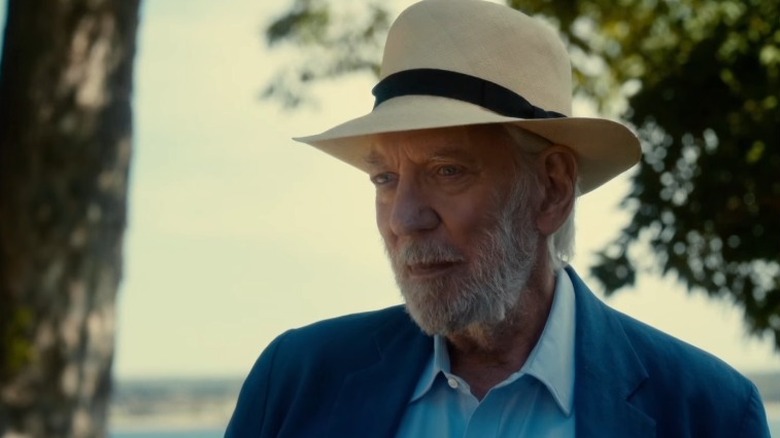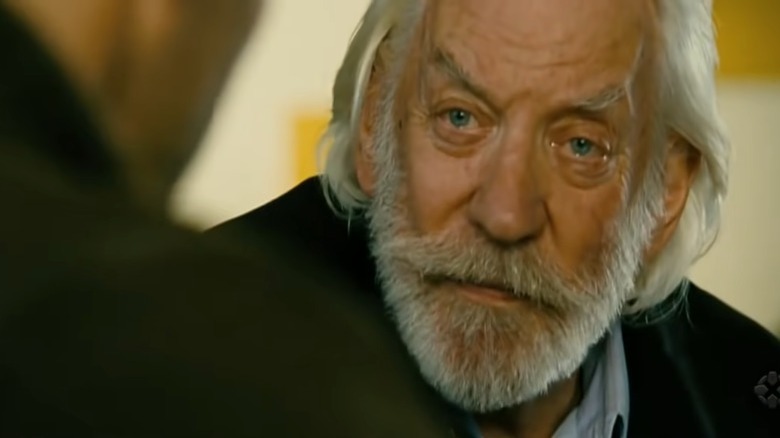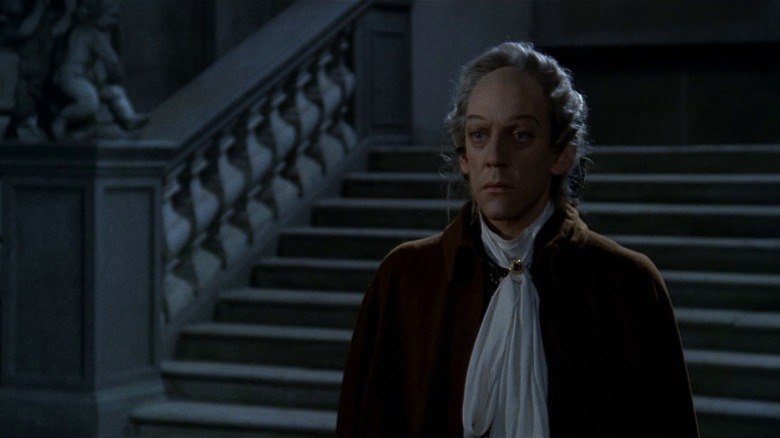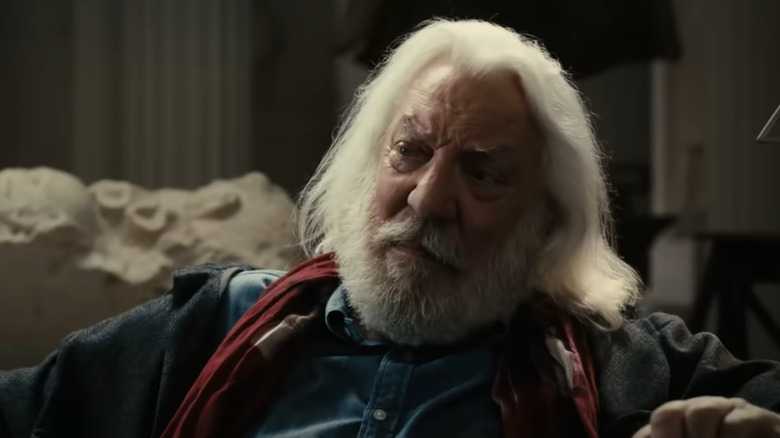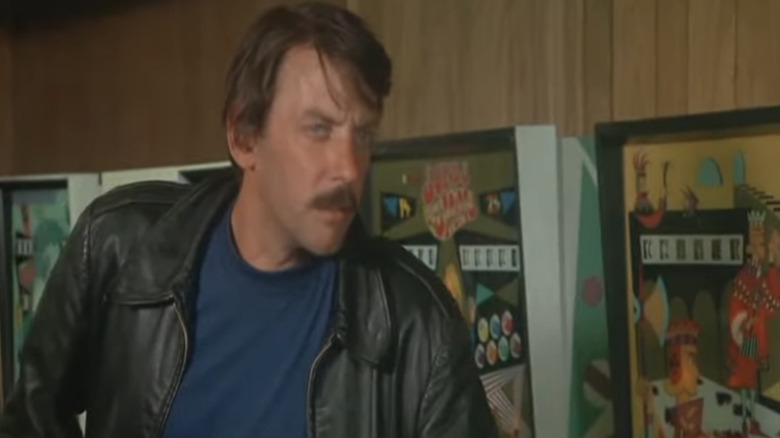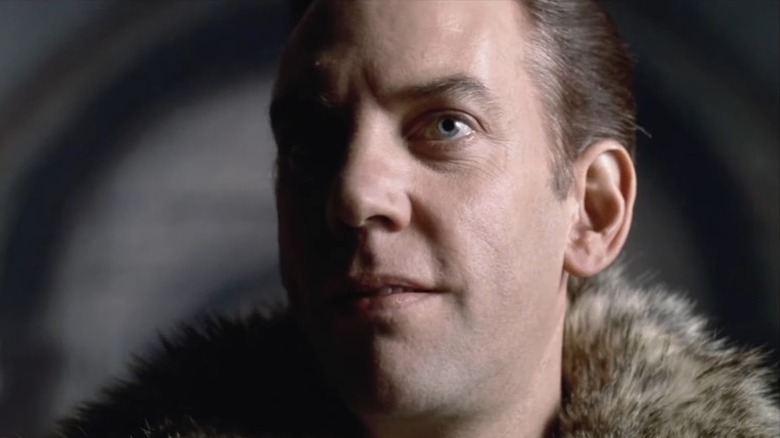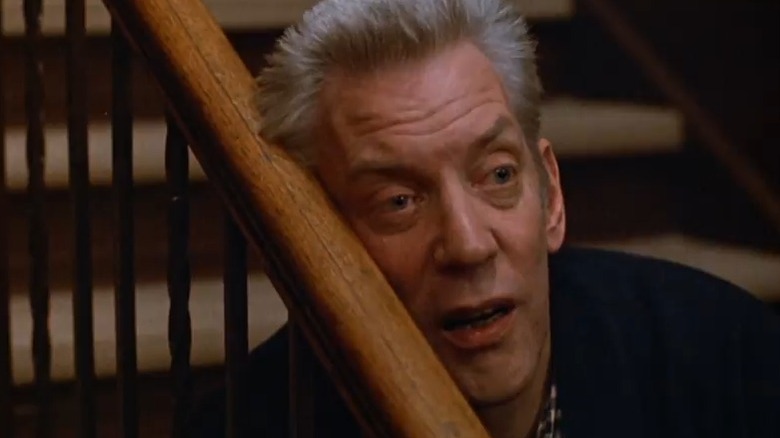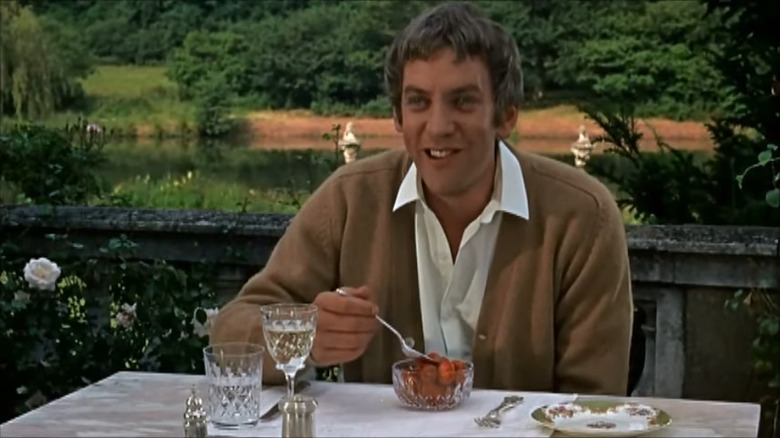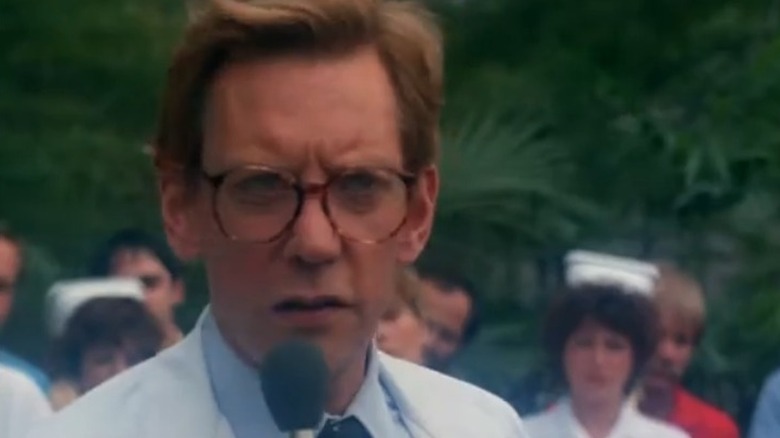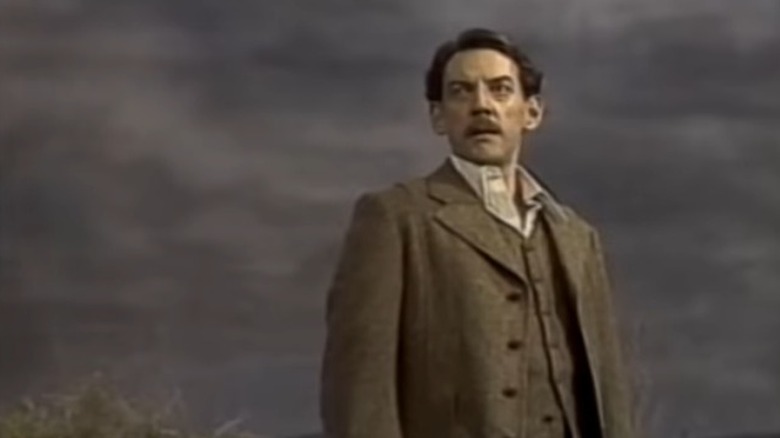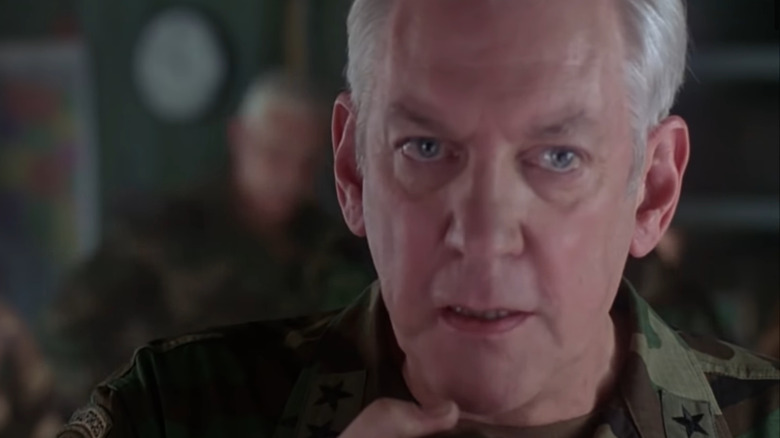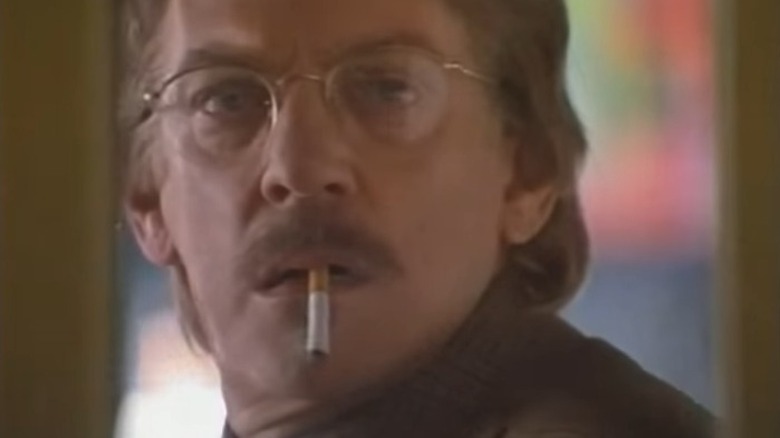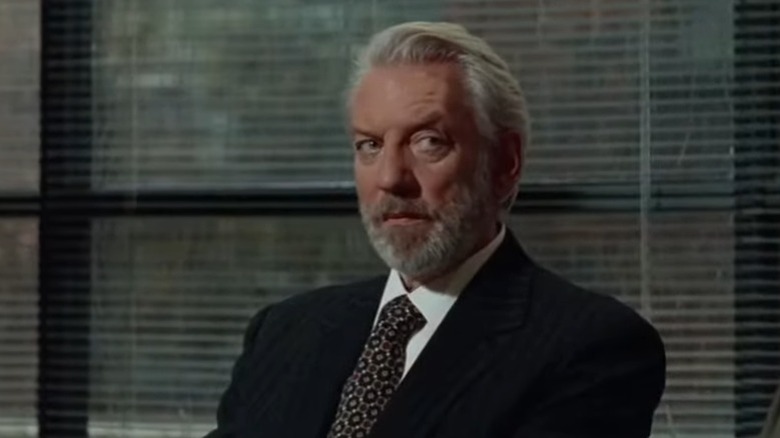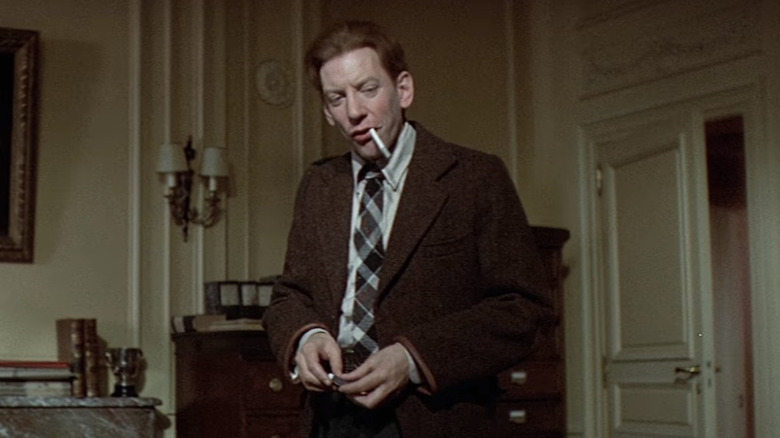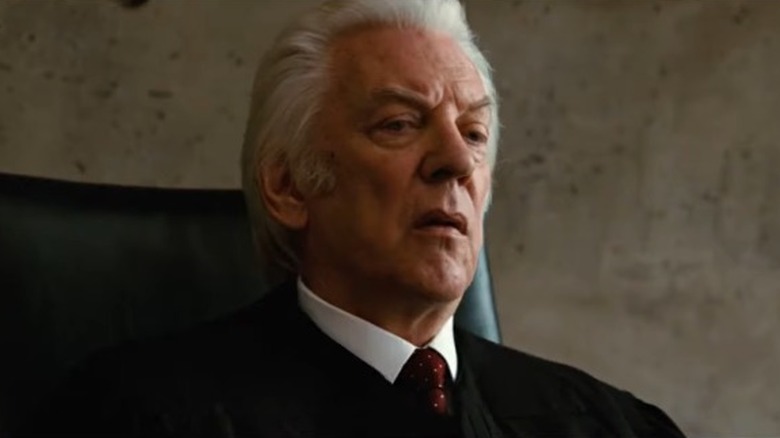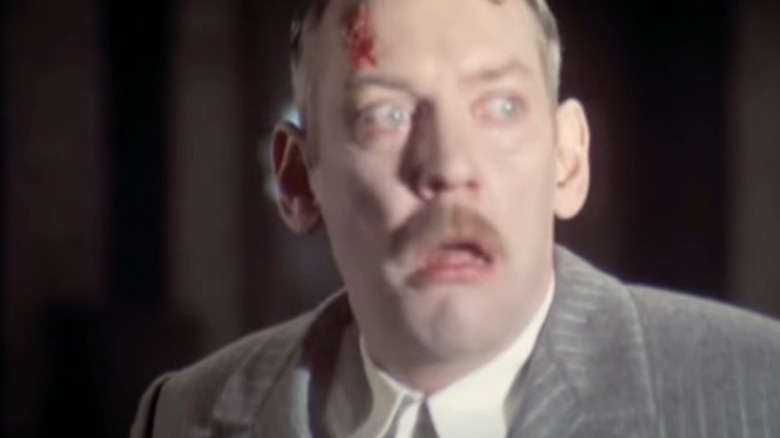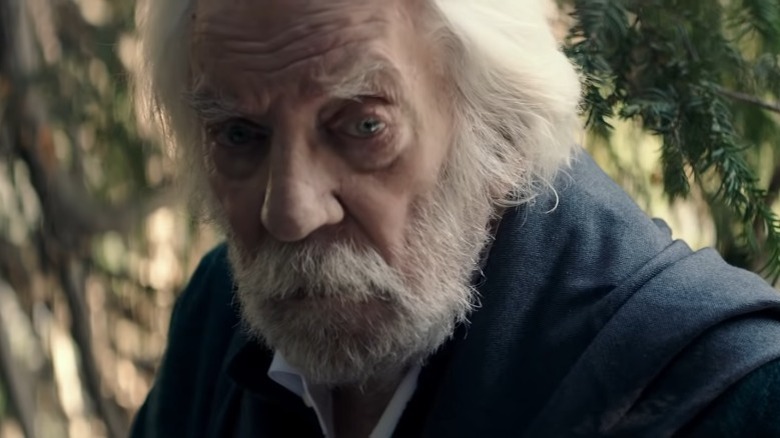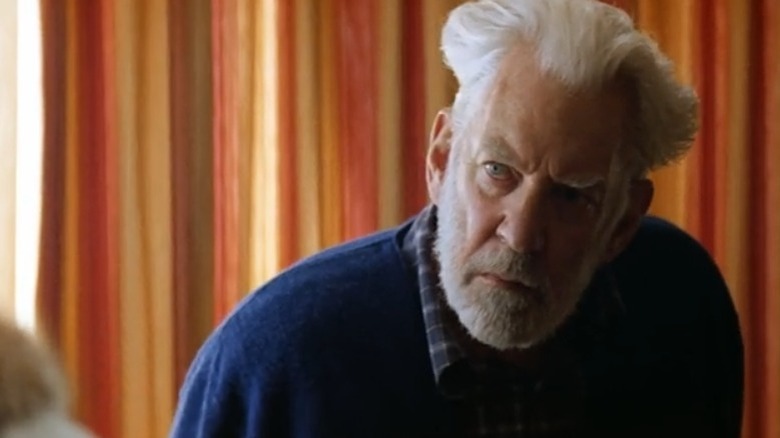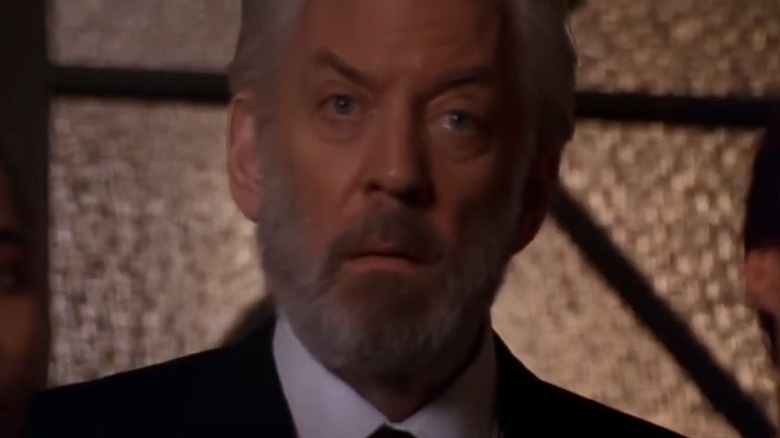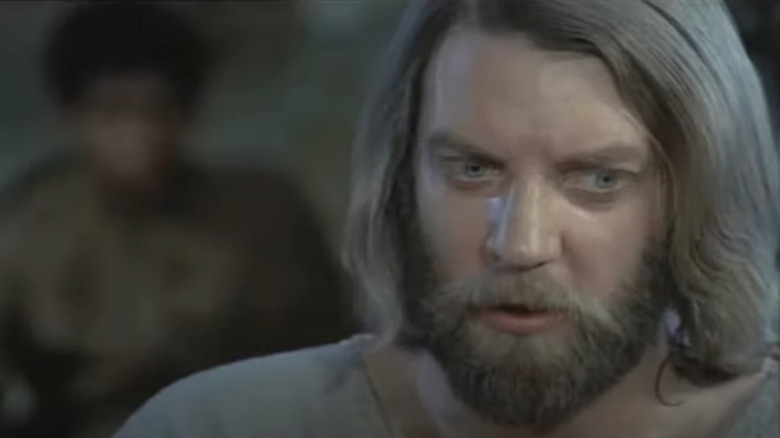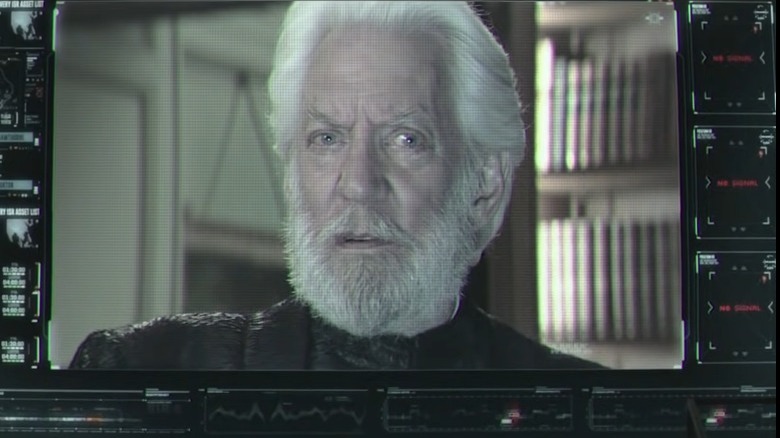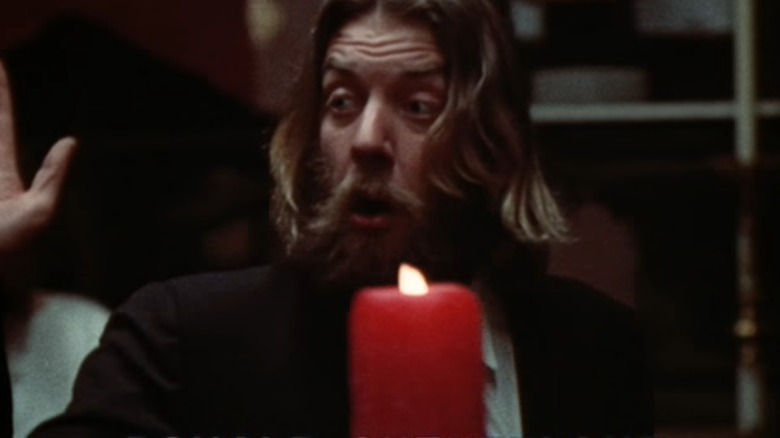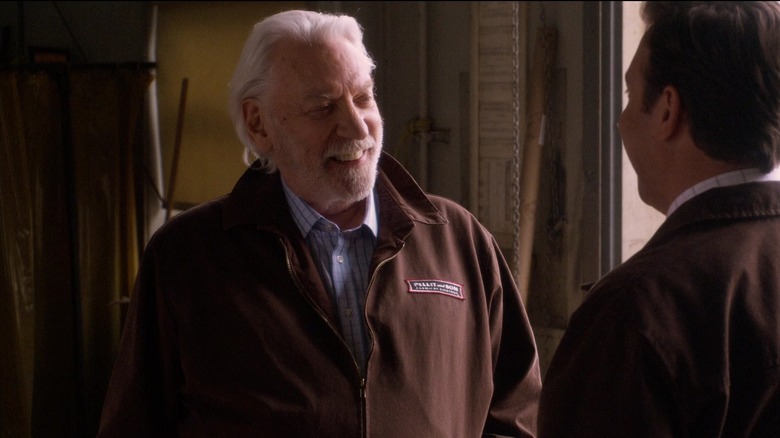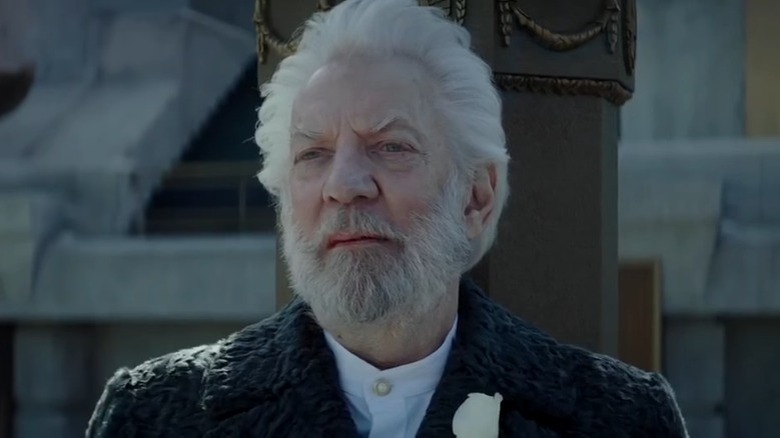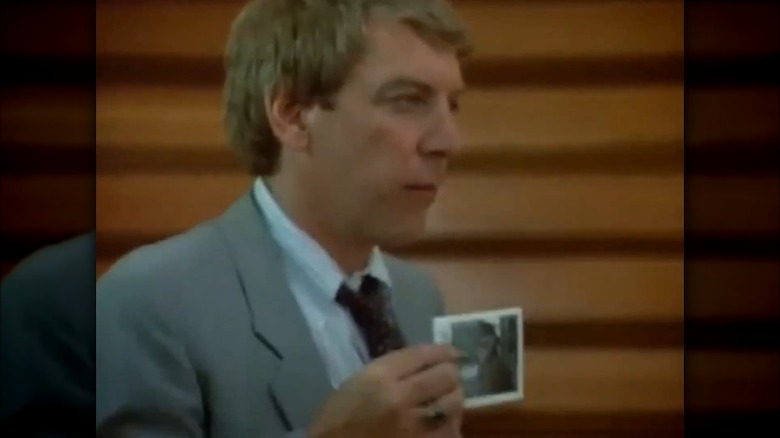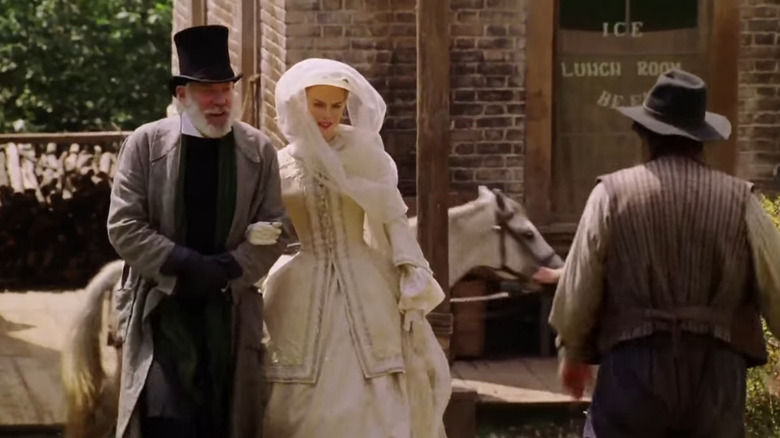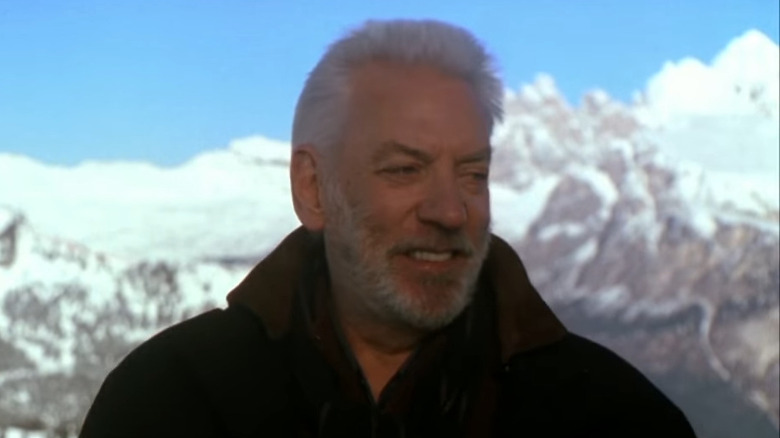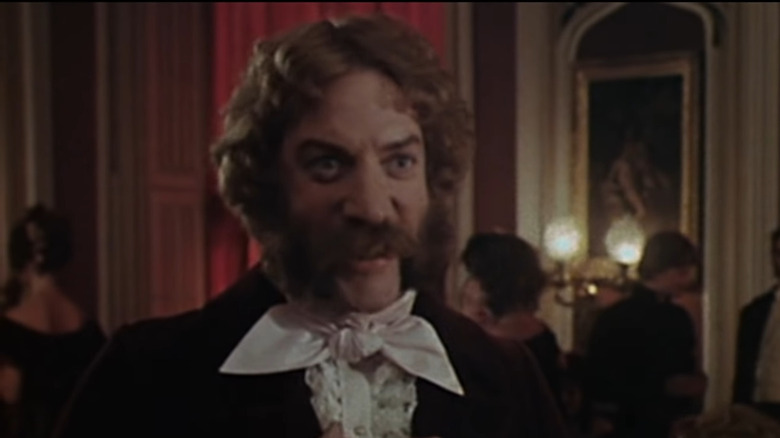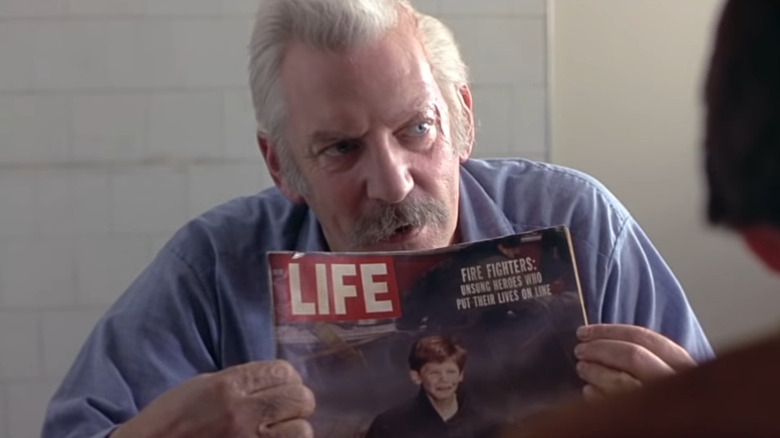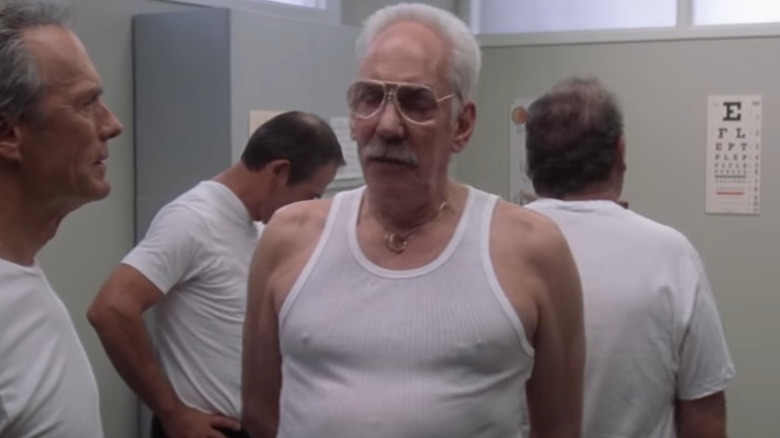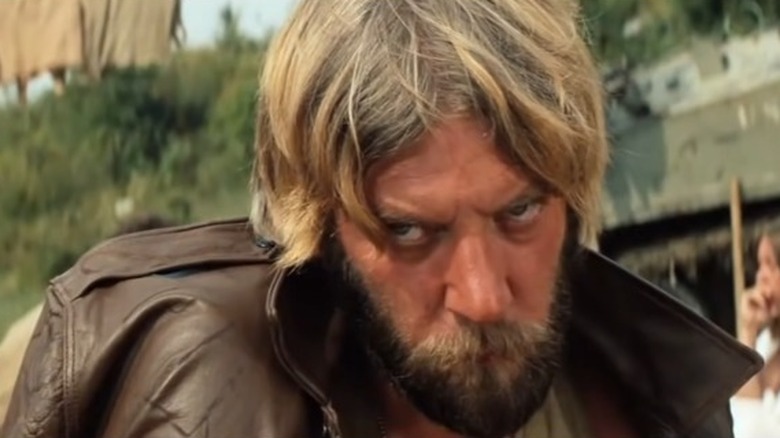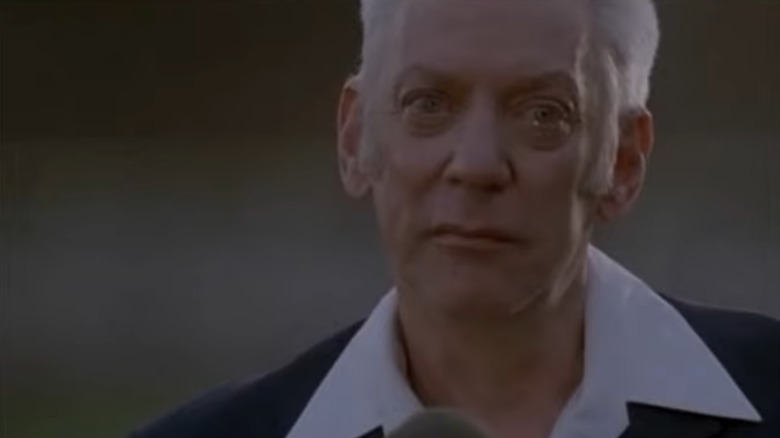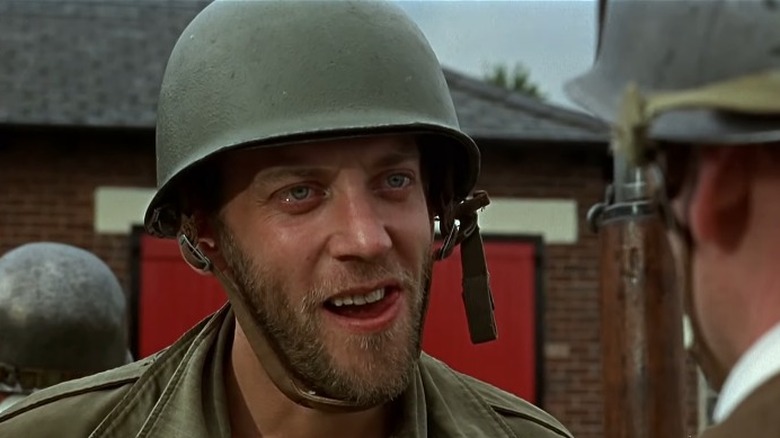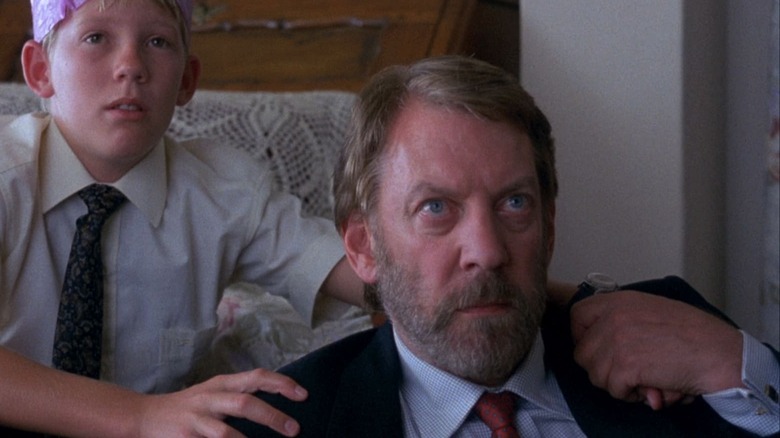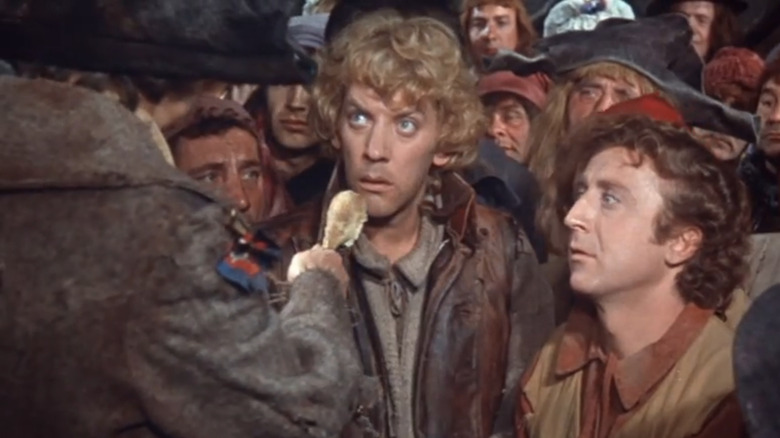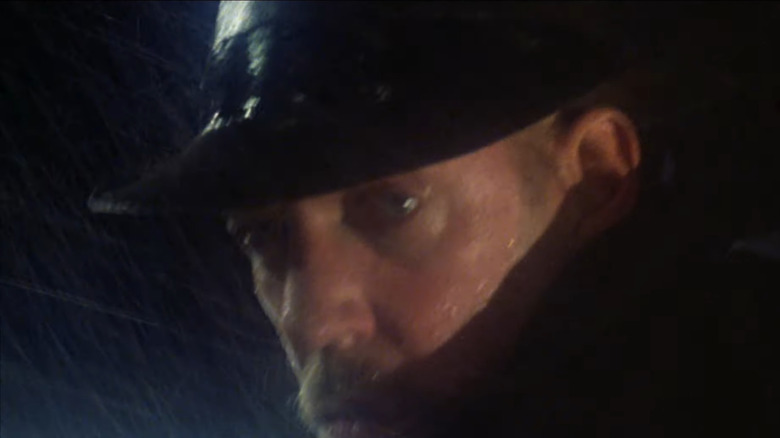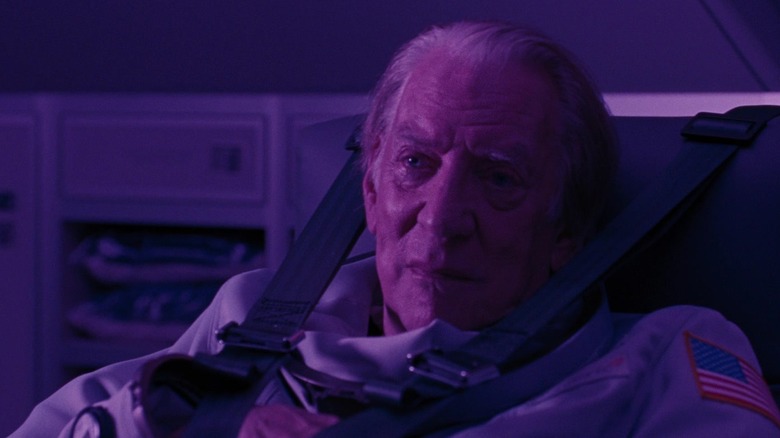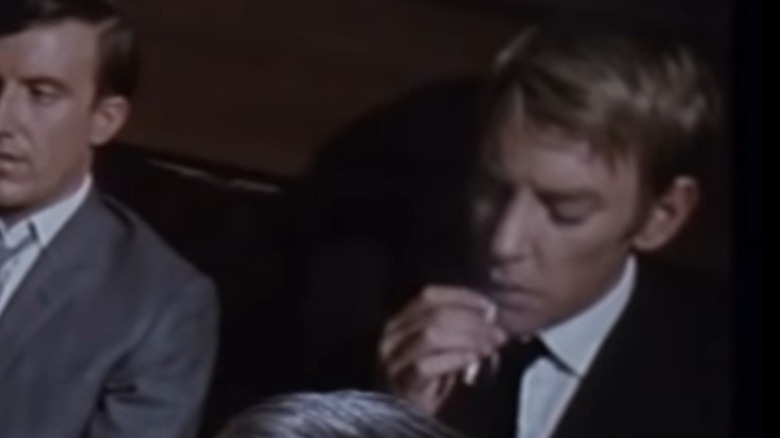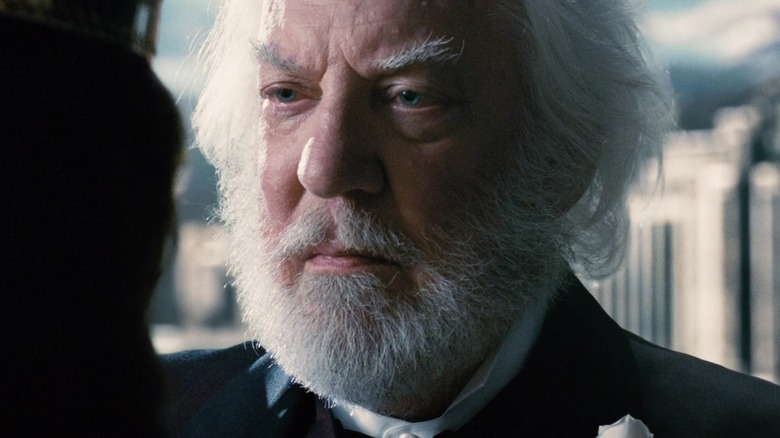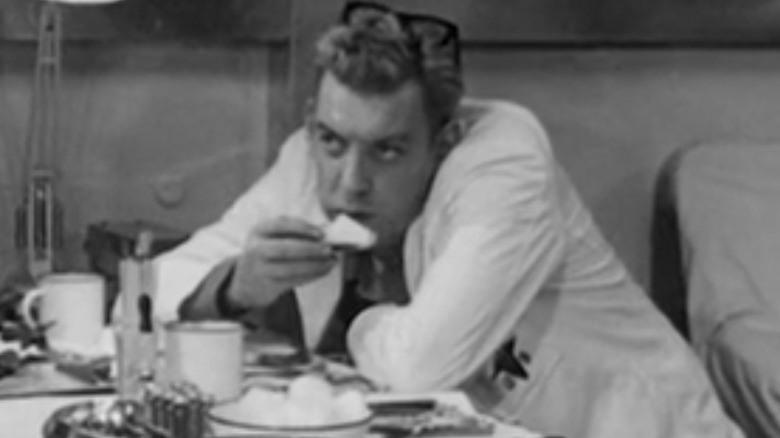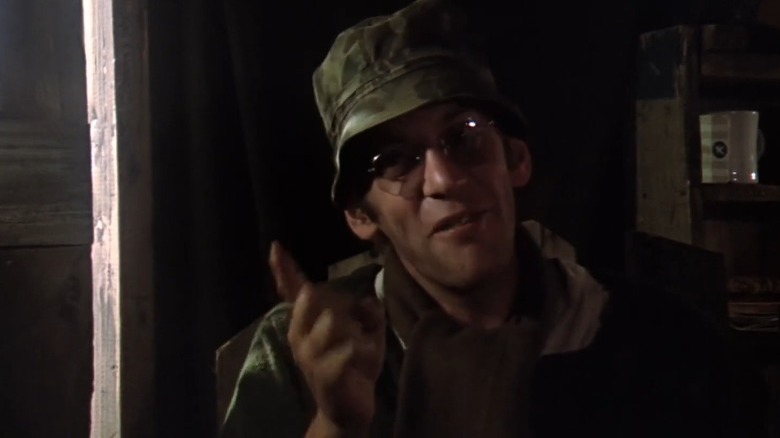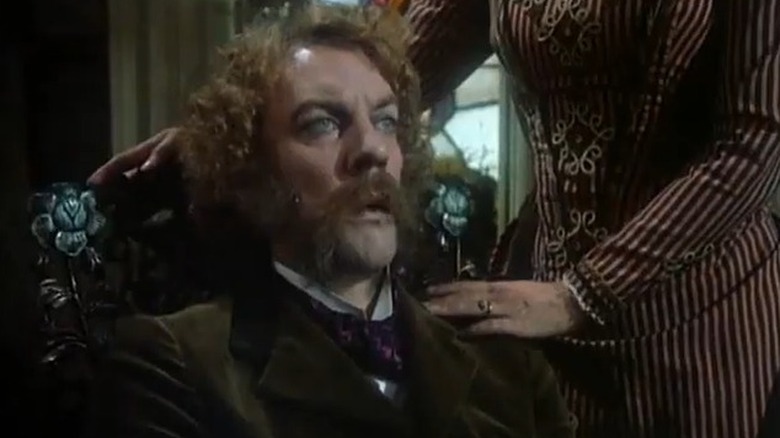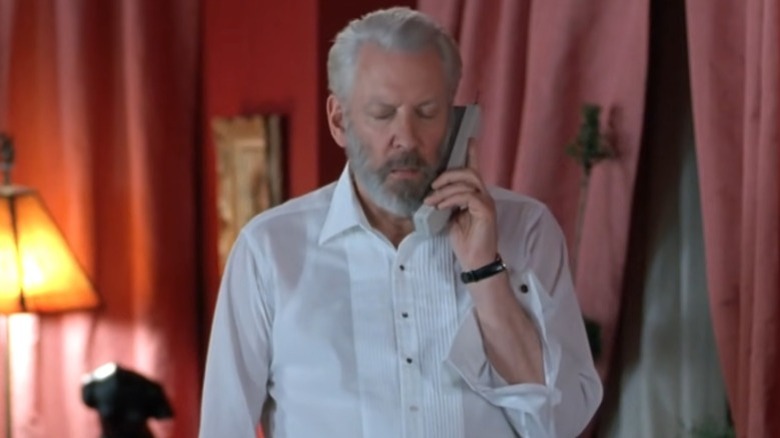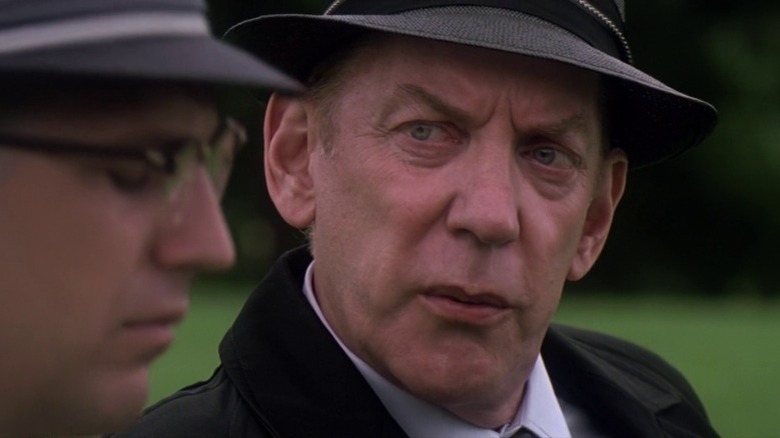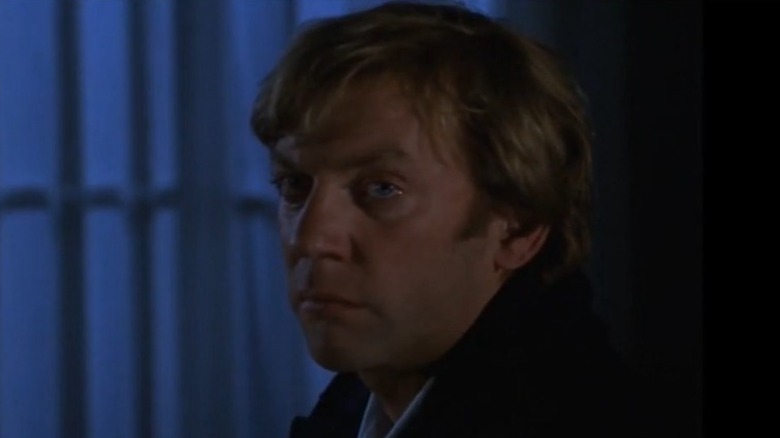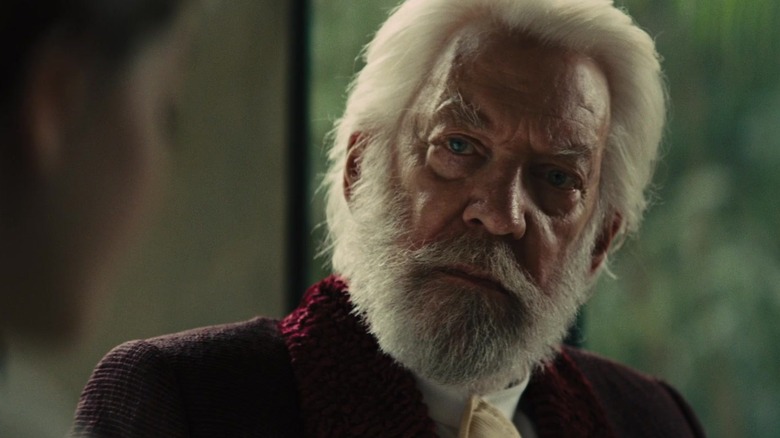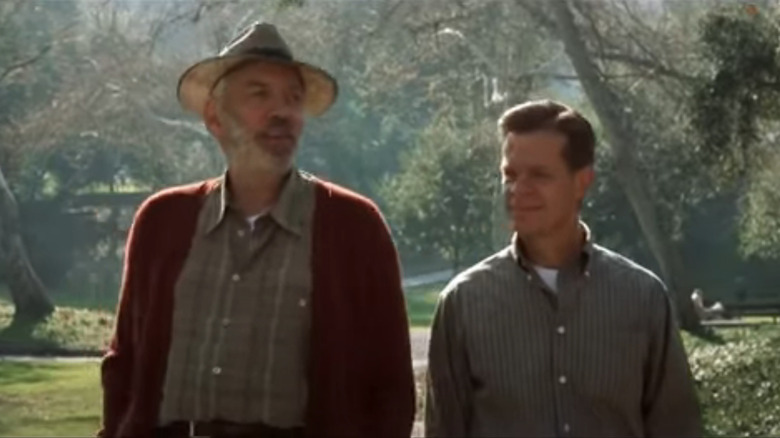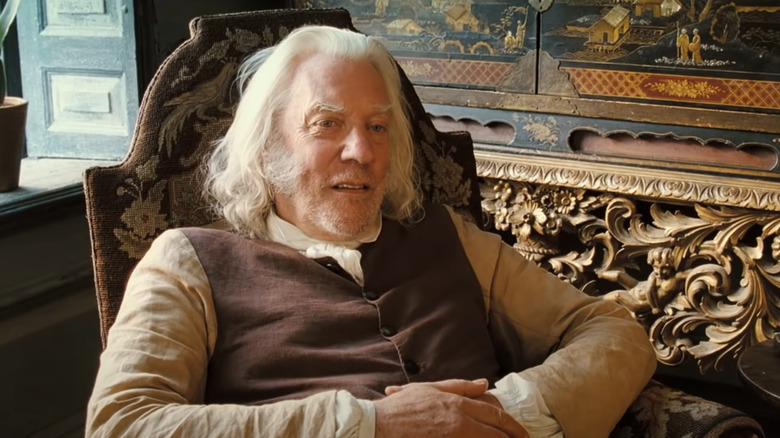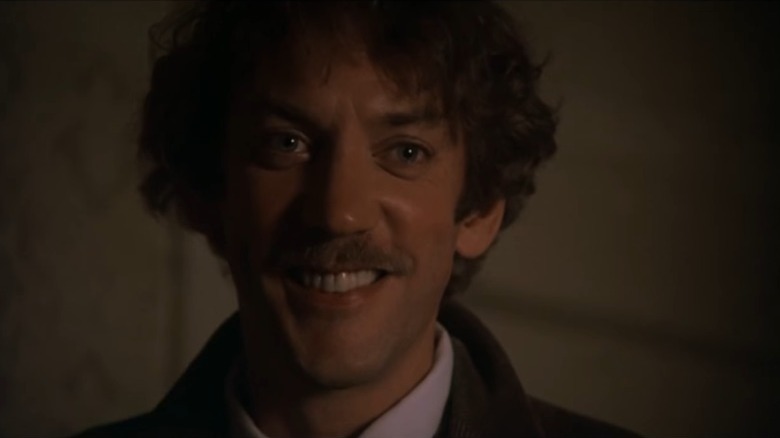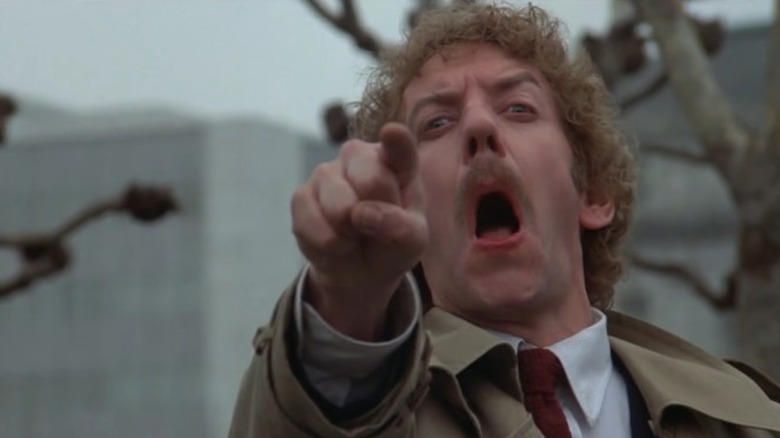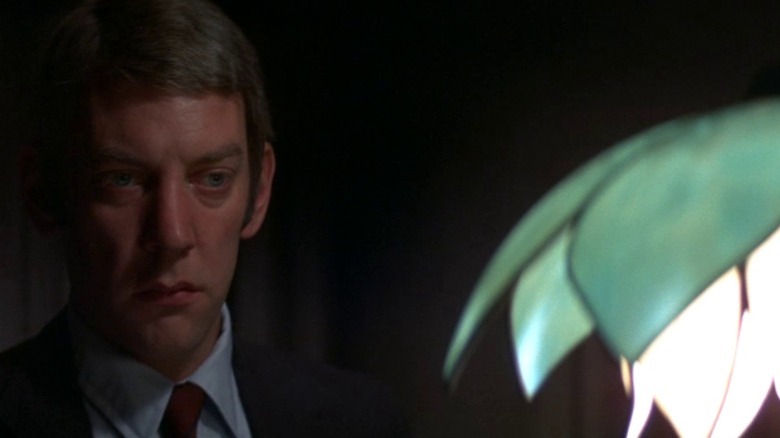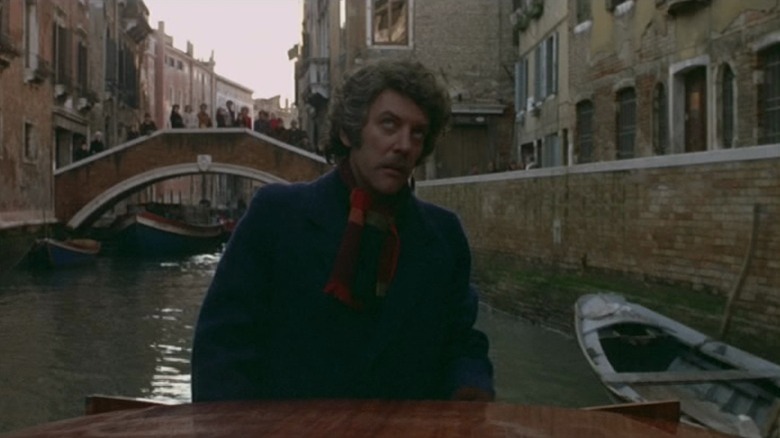Donald Sutherland's Best Movies Ranked
Donald Sutherland is one of those actors who pops up in movies so often that you almost expect to see him in just about everything. He's been working professionally since the 1960s, and throughout his long career, he's appeared in tons of feature films and television series. His first foray into the small screen came in 1962 via an episode of "Studio 4," and despite becoming a hugely successful film star, he continues to pop up on television to this day.
Whenever Sutherland strolls onto the screen, you know you're in for some grade-A acting. That said, not everything Sutherland has appeared in has been a blockbuster or critical success. Like most actors, he started small and built up a significant resume filled with the likes of "National Lampoon's Animal House," "Invasion of the Body Snatchers," "Horrible Bosses," "Pride & Prejudice," and the "Hunger Games" series. Sutherland rarely stays in one genre for long, so he's played parts in horror, drama, romantic comedies, science fiction, and everything in between.
These are all of Sutherland's movies, listed from worst to best, though some have been omitted. The movies that aren't included on this list include animated films, documentaries, shorts, and anywhere Sutherland played himself or an insignificant role (sorry, "Moonfall"). He had a few of these early in his career, so it doesn't make the cut anytime he played a corpse, a guy sitting at a computer, or provided a small voice role. What's left are 100 films that prove Sutherland is a fantastic actor with insane versatility, whether he's playing a dystopian dictator or a Jane Austen character.
100. Revolution (1985)
One of Sutherland's least successful films had everything it needed to be a brilliant period drama. Al Pacino leads "Revolution" as Tom Dobb, a fur trapper whose son (Sid Owen) joins the Continental Army as a drummer boy despite his father's wishes. Eventually, his boy is captured by British forces and is handed over to Sgt. Maj. Peasy (Donald Sutherland). He takes the boy as one of his own drummers, leaving his father to do something he wants to avoid: fight! Dobb joins up with the revolutionary forces to fight against the British so he can find and, against all odds, free his son from the tyrannical British soldier holding him captive.
With Pacino in the lead, it should have been a massive hit. And Sutherland, fresh off "Max Dugan Returns" and "Ordeal by Innocence," gets to chew the scenery as a British officer with a clunky, leaden, marble-y voice. Unfortunately, the film isn't as good as its leads. "Revolution" was a commercial and critical bomb. That's putting it lightly because when all the receipts were counted, the film only managed to make $346,761 at the domestic box office. "'Revolution' is utterly and fatally devoid of a story on which to hang its breathtaking pictures," wrote Sheila Benson for the Los Angeles Times, noting that at least its depictions of warfare are ambitious and frenetic.
99. Fool's Gold (2008)
"Fool's Gold" is a rom-com starring Matthey McConaughey as Ben "Finn" Finnigan and Kate Hudson as Tess Finnegan. Finn has been searching for a sunken Spanish galleon for eight years, and it's taken a toll on his marriage. Tess divorces and then clobbers Finn when he tells her their boat sank in his latest bid to find the ship. He manages to find a clue and winds up on Nigel Honeycutt's (Donald Sutherland) yacht, which just so happens to be the same vessel Tess is on. Eventually, they convince Nigel to help them find the treasure while, at the same time, Finn is pursued by a hip-hop artist named Big Bunny (Kevin Hart), to whom he owes a considerable sum.
As far as McConaughey's rom-coms go, "Fool's Gold" was marginally successful at the box office despite earning negative reviews from critics and audiences. On a $72.5 million budget, the film managed to rake in $109.3 million. That's far from the heights of "Failure to Launch" and "How to Lose a Guy in 10 Days," the latter of which also co-starred Hudson. Peter Travers for Rolling Stone wrote, "It's sad to see such excellent actors as Donald Sutherland and Ray Winstone trading audience goodwill for a paycheck. I could swear that Sutherland, as a tycoon with an heirhead daughter (Alexis Dziena), is trying to disguise his voice so audiences will forget it's him. Not so fast."
98. Benefit of the Doubt (1993)
"Benefit of the Doubt" is one of the weaker films of Donald Sutherland's career, affording him a duplicitous role in a suspenseful thriller that doesn't really hold up. Sutherland plays Frank, a man convicted of killing his wife 20 years earlier. He's finally out of prison and heads home to see his daughter, Karen (Amy Irving), who provided the key testimony that resulted in his guilty verdict. These days, Karen has trouble recalling the exact details of what happened, but she reluctantly lets her charming father back into her life. He gets close to his grandson (Rider Strong) and begins to isolate Karen from her family and friends. After declaring her intent to marry her boyfriend (Christopher McDonald), things take a turn.
A flurry of murders occurs, and Karen's memories are triggered, revealing the truth of her father's nature. "Benefit of the Doubt" had what it needed to make a compelling thriller. Donald Sutherland was perfectly cast into the role of Frank, but it doesn't come together in the way it should. Ultimately, there's little thrill in the events depicted on the screen. Roger Ebert wrote, "There's hardly a moment in 'Benefit of the Doubt' when we can believe the events on a psychological level, or even on the level of a manipulative thriller." Quentin Curtis with the Independent wrote that the film is pale imitation of Martin Scorsese's "Cape Fear" remake but that Sutherland as the wolf in sheep's clothing "strikes the odd note of startling menace, but each one is lost in the surrounding symphony of absurdity."
97. Crackers (1984)
Louis Malle is one of the most accomplished directors Donald Sutherland has ever worked with. The French filmmaker directed "My Dinner with Andre" and the French films "Elevator to the Gallows" and "The Silent World," the latter of which won both an Oscar and the Palme d'Or. Unfortunately, "Crackers" is not one of his best. The film remakes Mario Monicelli's Italian film, "Big Deal on Madonna Street." Donald Sutherland stars as Weslake, an employee at the neighborhood pawn shop run by Garvey (Jack Warden). When an amateur musician, Dillard (Sean Penn), arrives to buy back his guitar, he finds that he doesn't have the cash. Garvey offers him a deal: Install an alarm system, and he'll get the guitar back. Ultimately, a plan is made to rob the pawn shop, and Weslake gets in on the gambit out of fear of losing his job if an alarm system is installed. Before long, he becomes the ringleader of a small group of crooks. Of course, anything that can go wrong eventually does.
The film has its fans, but Vincent Canby of The New York Times isn't one of them. He wrote that the film "simply proves that with the right material an intelligent director of demonstrated style and a cast of thoroughly accomplished comic actors can make as painfully witless a comedy as any knucklehead on the block." With a script originally intended for John Belushi (via the Chicago Reader) and a great filmmaker at the helm, it's a shame Sutherland's outing with Malle didn't turn out better.
96. Ordeal by Innocence (1984)
Agatha Christie's "Ordeal by Innocence" was adapted in 1984 with Donald Sutherland taking the leading role of Dr. Arthur Calgary. After paying a visit to the Argyle family to return a book belonging to Jacko (Billy McColl), a hitchhiker he helped years earlier, Dr. Calgary learns the man is dead. Two years before he arrived, he was executed for the murder of his mother, but the facts of the case don't add up. In fact, it looks like Jack may have been innocent all along, and it's up to Dr. Calgary to prove his innocence. He picks up the investigation, but it isn't be a simple analysis of the facts, and he soon finds that following his leads may lead to deadly results.
"Ordeal of Innocence" is a fairly straightforward adaptation of Christie's novel — a book which, though it was also adapted into a BBC miniseries starring Bill Nighy, has been very infrequently brought to the screen. Eddie Harrison of Film Authority wrote, "There's good support here from Michael Elphick, Annette Crosbie and Brian Glover, but the real selling point is Sutherland, who is well-cast as a man out of time and place. His big coat, bog-brush hair and steely gaze make him an empathetic detective; I found his amateurism easier to relate to than Christie's super-sleuths." Performances by Sutherland, Faye Dunaway, Ian McShane, and Christopher Plummer manage to carry "Ordeal by Innocence." This is also the fifth and final screen collaboration between Sutherland and Plummer, who first shared the screen in "Hamlet at Elsinore" in 1964 — with Plummer as Hamlet and Sutherland as Fortinbras. "Ordeal by Innocence" is also their most coldly received film together, as all of their other collaborations are farther down the list. Nevertheless, "Ordeal by Innocence" boasts a strong cast and is worth watching if you're a Christie fan.
95. Alex in Wonderland (1970)
In "Alex in Wonderland," Donald Sutherland plays Alex Morrison, a feature film director whose first film is a critical and commercial success. While spending time trying to figure out what to work on next, he wines and dines with Hollywood's glitterati, who want to see what else he can do. This leaves Alex in a bit of a quandary: Should he focus on making something that's a commercial success, sacrificing his artistry to favor his family's transition from middle-class to higher? Or should he focus on his dream of telling a story, focusing solely on the artistic nature of his craft despite the meager profits from such a venture?
Interestingly, it's a dilemma that writer-director Paul Mazursky faced, making "Alex in Wonderland" somewhat quasi-biographical. The film is artsy and pretentious on its surface, but it doesn't try to hide this from the audience. That's essentially the point, and critics like Roger Ebert recognized this, writing in his four-star review, "The human story does work, remarkably well, and if the movie doesn't hold together we're not disposed to hold that against it." Audiences have been less favorable of "Alex in Wonderland" over the years, and the film is hit or miss with viewers and critics alike. Still, as a hippie '70s American send-up of "8 1/2," "Alex in Wonderland" is a treat for cinephiles.
94. The Disappearance (1977)
"The Disappearance" is based upon the Derek Marlowe novel "Echoes of Celandine" and centers around a contract killer, Jay Mallory (Donald Sutherland). When he returns home to find his wife, Celandine (Francine Racette), missing, he learns her disappearance may be related to his last contract. Mallory takes another contract in London, hoping it may lead him to his wife, but he's cautious of his employer and suspects he may be the target of another killer. He's not far off, and soon he meets the head of the criminal organization he works for (Christopher Plummer) and learns he was having an affair with Celandine.
"The Disappearance" was not a successful movie when it was released despite having an all-star cast consisting of John Hurt, Peter Bowles, David Warner, and Virginia McKenna. Plummer and Sutherland also reunite for the penultimate time here. Eddie Harrison of Film Authority said the film is a "cold-fish espionage that's decidedly unfashionable, but still pulls in old-school spy-fans." It seems more diversionary than anything, especially when Sutherland has so many better thrillers under his belt.
93. Red Hot (1993)
Academy Award-winning and recently disgraced writer-director Paul Haggis, the man behind "Million Dollar Baby" and "Crash," got his start with a little Canadian film called "Red Hot." He co-wrote the script with Michael Maurer. The film is centered around Alexi (Balthazar Getty), a student who gets his hands on contraband American rock and roll albums. He plays them for his friend, Valentina (Carla Gugino), and they're soon investigated by Gurevitch (George de la Peña), a member of the KGB. Alexi and his friends form a band and are arrested, but Valentina's father, Mr. Kirov (Donald Sutherland), intervenes, saving the children. Valentina defies her father's request to stay away from Alexi, and they put on a concert that's broken up by the Soviet military.
Like Paul Mazursky's Robin Williams vehicle "Moscow on the Hudson," "Red Hot" tries to show Western audiences the living conditions and culture of ordinary citizens in the U.S.S.R. The film doesn't get as much attention as "Moscow on the Hudson," but it is just as important. Though it's not been reviewed recently enough to have a Rotten Tomatoes score, "Red Hot" has been enjoyed by audiences since its release, and it's something of a cult classic.
92. Castle of the Living Dead (1964)
Donald Sutherland's first credited theatrical feature film appearance came in "Castle of the Living Dead," and he played three characters: Sgt. Paul, a witch, and an old man. The film is a Christopher Lee-starring French-Italian co-production shot in the midst of Lee's tenure with Hammer. Lee plays Count Drago, an unusual man who invites groups of entertainers to his castle. Drago spends his days embalming people to create what he calls his "eternal theater." He does this with a special chemical that instantly kills and embalms whatever it touches, leaving the visiting circus troupe to fear for their lives as Drago's plan unfolds.
"Castle of the Living Dead" is the kind of movie that came out all the time in the 1960s, like if Vincent Price's 1953 "House of Wax" had instead been filmed on the cheap in the Italian countryside. Stuffed with tropes like mad scientists and crazy castles, "Castle of the Living Dead" isn't exactly the most original horror out there. Films like this are often fun to watch but offer little in terms of cinematic artistry. Sutherland's done much better horror movies later in his career, but his three performances here are undisciplined and funny, so if you're a fan of his, this is a movie you absolutely must see. If you're merely curious, it's not something you need to rush out and find.
91. A Man, a Woman and a Bank (1979)
Few film titles are as on-the-nose as "A Man, a Woman and a Bank." The film stars Donald Sutherland as Reese Halperin, a thief working with a computer expert named Norman Barrie (Paul Mazursky). The two men hatch an ingenious plot to rob a bank by reprogramming the vault's complex alarm system while it's being built. All they have to do is wait, and they could walk in and out with the largest withdrawal possible! There's only one problem: Brooke Adams plays Stacey Bishop, a photographer who snaps pictures of their plans while working on the bank's ad campaign.
Reese and Stacey meet, fall in love, and complicate the scheme in ways he couldn't have foreseen. "A Man, a Woman and a Bank" premiered at the 1979 Toronto International Film Festival and has since received mixed reviews. In his two-star review, Roger Ebert wrote, "The movie bounces from one story to another and loses its way." Ebert found Sutherland droll but his chemistry with Adams believable and wholesome.
90. Shadow of the Wolf (1992)
"Shadow of the Wolf" is based on the Yves Thériault novel, "Agaguk." Lou Diamond Phillips plays Agaguk, an Inuit man who goes on the run with Jennifer Tilly's Igiyook after Agaguk kills a white trader character (Bernard-Pierre Donnnadieu). Agaguk's father, Kroomak (Toshirô Mifune), banishes him. Agaguk and Igiyook must flee through the bitter cold of Northern Quebec as they're chased by a cruel mountie named Henderson (Donald Sutherland).
The film is visually stunning, but critics have faulted it for its story. Roger Ebert gave "Shadow of the Wolf" two stars, writing, "Shot on location in the arctic north, the movie is obviously a labor of love — which makes it all the more unfortunate that the story it tells is so simple-minded." It doesn't help that of the three principal Inuit characters, only Phillips is of Native American ancestry, on his father's side. Sutherland's scenes, on the other hand, are mostly separate from the main plot. The movie was also a commercial failure, making just shy of $1.5 million at the box office on a $30 million-plus budget (via Variety). While it wasn't appreciated by all, "Shadow of the Wolf" claimed two Genie Awards for its costume design and production design.
89. Lock Up (1989)
In "Lock Up," Donald Sutherland plays Warden Drumgoole, a cruel man who takes pleasure in keeping his maximum security prison running perfectly. Only one man has ever had the nerve to escape his facility, and that's something the warden cannot forgive. Eventually, that prisoner, Frank Leone (Sylvester Stallone), is returned, and the warden doesn't hold back in having him beaten and tortured. Frank knows he's up against a wall, and there's little he can do. Still, when he learns that the warden has plans for his girlfriend (Darlanne Fluegel), Frank plots a second, desperate escape to save the woman he loves.
Sutherland's Warden Drumgoole is a character the veteran actor shined playing. For whatever reason, Sutherland plays sadistic well, but he was also nominated for Worst Supporting Actor that the Razzies for his work here. Despite the draw of Stallone, "Lock Up" was a critical and commercial failure. The film cost $24 million to make and only pulled in a hair over $22 million. While most critics tore the film apart, Andrew Gaudion of VultureHound wrote that the film might be "a little too cliched and heavy-handed to mark itself as a classic of the prison drama sub-genre, but as a piece of ['80's] action drama, it has its pleasures."
88. Hollow Point (1996)
In "Hollow Point," Tia Carrere plays Diane Norwood, an FBI agent on the hunt for an international criminal named Thomas Livingston (John Lithgow). Unfortunately, he proves incredibly difficult to catch, which is soon compounded by the inclusion of Thomas Ian Griffith's DEA Agent Max Parrish. Both are on Livingston's tail, but finding him means they'll have to work together. Despite their best efforts, they soon realize that the only way to get Livingston to come out in the open is to find a contract killer named Garrett Lawton (Donald Sutherland).
On its surface, "Hollow Point" is a by-the-numbers action comedy that didn't do well, but it wasn't a terrible film by any measure. Joe Leydon of Variety wrote, "Sutherland's flamboyant portrayal of the hit man as a mischievous, music-loving jokester is self-consciously cute but undeniably funny." Leydon complimented the film's fast pace and amusing performances, but for an actor known more for serious dramas, Sutherland has been in far better comedies than "Hollow Point."
87. Buster's Bedroom (1990)
Very few people have seen "Buster's Bedroom," a German film about Micha (Amanda Ooms), a woman absolutely in love with the life and work of silent film star Buster Keaton. She visits Nirvana House in Santa Barbara, California, believing her idol once stayed there. The villa is an asylum occupied by a plethora of unusual characters, including Dr. O'Connor (Donald Sutherland), the man in charge. Other interesting characters include a beekeeper, Warlock (David Warrilow), and a former prima donna, Serafina (Valentina Cortese). To compliment the tribute to Keaton is Diana, played by Geraldine Chaplin, the real-life daughter of Keaton's fellow silent film comedian, Charlie Chaplin.
Michael Brenson of The New York Times favorably compared "Buster's Bedroom" to the films of Federico Fellini as "largely convincing" and said that the film has a deeply sexual, surreal style. "Its flow defines the artist's sensibility," Brenson wrote — the film wasn't widely released outside of Germany, so the audiences who saw "Buster's Bedroom" saw the film at an exhibition from the film's director, visual artist Rebecca Horn. Brenson also highlighted the cinematography of Sven Nykvist, Ingmar Bergman's legendary multi-Oscar-winning collaborator. Had the film earned a release, or indeed any attention since 1991, it might have become a cult classic. Yet it seems one of Sutherland's most unusual films will remain a hidden gem.
86. Man on the Train (2011)
"Man on the Train" is an English-language remake of "L'homme du train," a French film released in 2002. In the movie, Donald Sutherland plays a retired poetry professor who meets a stranger on a train. The other man (Larry Mullen Jr., the drummer and co-founder of U2) is planning on robbing a bank, but lacking anywhere to stay, the professor offers him a room for the night. With no other options, he accepts, and the two men sit and talk about their lives. These two men couldn't be more different, but they form a bond, and by the end, they both long to live the lives of the other. The retired teacher wishes his life were full of excitement, whereas the man would have enjoyed settling down.
Sutherland reunites with his "Benefit of the Doubt" co-star Graham Greene here, and Sutherland received some praise for his performance. Not many critics have reviewed the film, but film critic and blogger Dennis Schwartz wrote that Sutherland's performance was "hammy" — but in "Man on the Train," mostly a two-hander between Sutherland and the U2 drummer, a hammy performance may be just what the doctor ordered.
85. Eminent Domain (1990)
John Irvin helms "Eminent Domain," a film purported to be based on actual events. In the movie, Donald Sutherland plays Josef Burski, a member of the Polish Politburo, the ruling Communist apparatus in Poland during the Cold War. When Burski and his wife, Mira (Anne Archer), are unceremoniously kicked out of the Communist party, they're left wondering why. Things go from bad to worse when their 15-year-old daughter is kidnapped and Mira is committed to an insane asylum. Burski's life is turned upside-down, and he has no idea why, and anyone who comes close to helping him winds up dead.
"Eminent Domain" received a two-and-a-half-star review from Roger Ebert, who wrote, "The film's weakness, however, is to graft this factual information about a bureaucratic nightmare onto an ending that could have belonged to any number of thrillers. The last scenes are contrived and less than convincing, and the focus moves from sharply seen details of everyday life inside the Polish party apparatus to sloppy thriller elements that could have come from anywhere." On Sutherland, Ebert wrote, "Sutherland is a good choice to play Burski because he has always been good at projecting intelligence, at suggesting an inner ethical strength." Ultimately, it's an interesting period piece that doesn't manifest as a compelling thriller.
84. Bear Island (1979)
In "Bear Island," an expedition of UN scientists descend on the titular location, which houses an abandoned German U-boat base. One of the scientists, Frank Lansing (Donald Sutherland), decides to check it out because his father served and died there. As he's investigating, strange "accidents" happen, killing members of the expedition. He soon discovers a large cache of gold and uncovers a plot led by neo-Nazis intent on stealing it. It's up to Lansing to find the bad guys and take them out before they can get to them in this intense thriller loosely based on Alistair MacLean's 1971 novel of the same name.
"Bear Mountain" was an expensive film that had numerous financial setbacks. According to The New York Times, the budget rose to $12 million, and the Bank of Montreal was forced to become an investor when its money became tied up in securities. Overall, the film's action sequences are well-shot and look impressive. Eddie Harrison of Film Authority wrote that despite the "stoic action" and a good snowmobile chase, the mystery element of "Bear Island" works. Graeme Clark of The Spinning Image said, "Sutherland [was] the most famous Canadian actor around" at the time of production, making him a "shoo-in for the lead," and Clark noted that the film's contrived, complicated, and, in terms of its adventure elements, stale. That said, "Bear Island" was meant to kickstart a new franchise of adaptations of MacLean's works. Ultimately, that didn't happen, and the film has languished in obscurity ever since its release in 1979.
83. Alone (2020)
Hundreds of zombie movies have been released over the years, and "Alone" is one most people probably never saw. The film stars Tyler Posey as Aidan, recording a video suicide note before the timeline jumps back about six weeks to the outbreak of an infection that transforms people into zombies called "screamers." He remains in his house awaiting his parents and spends the time frantically trying to get a hold of anyone as the zombie apocalypse rages outside. The film cuts back to the suicide attempt, but Aidan stops after seeing a woman (Summer Spiro) in an apartment across the street, giving him hope. Unfortunately, he stumbles across Edward (Donald Sutherland), another survivor who captures Aidan with the intent of "feeding" him to his wife, who became a screamer.
No part of the plot hasn't been done elsewhere better, and "Alone" didn't offer much to the already saturated zombie movie market, resulting in a pretty unremarkable reception. Two changes were made to the mythos: Screamers repeat the last thing they said before turning, and they are aware of their actions but are powerless to stop themselves. Outside of that, it's a fairly by-the-numbers zombie flick that's entertaining but not incredibly imaginative.
If you or anyone you know is having suicidal thoughts, please call the National Suicide Prevention Lifeline by dialing 988 or by calling 1-800-273-TALK (8255).
82. Milton's Secret (2016)
In "Milton's Secret," Donald Sutherland plays Grandpa Howard, whose grandson, Milton (William Ainscough), is facing a problem many have had to deal with in their youth. He's being bullied and tormented by his peers at school, and his parents aren't helping. They've got their own problems, and Milton is left seeing nothing but stressed-out adults and mean children, resulting in near-crippling anxiety for the young man. When Grandpa Howard visits, Milton learns that stressing about the future keeps you from experiencing happiness and that his life doesn't have to continue down the path he's on.
"Milton's Secret" is based on Eckhart Tolle's 2008 novel of the same name, which was adapted for the silver screen by writer-director Barnet Bain. It's one of his rare late-career leading (or co-leading here) roles — the others throughout the 2010s you can count on one hand. But while his acting in the film isn't bad by any measure, it couldn't save it from some bad reviews. Geoff Berkshire of Variety wrote, "Alas, even a prickly pro like Sutherland can't do anything to elevate a hokey self-help lecture disguised as family entertainment," saying that "There's a modest kick to seeing Sutherland essay a blissed-out seventysomething Zumba-enthusiast, but the script by Bain, Sara B. Cooper, and Donald Martin doesn't give him any notes that are particularly juicy to play."
81. Five Moons Plaza (2003)
Donald Sutherland plays retired judge Rosario Sarracino in "Five Moons Plaza," a film that details a semi-fictionalized account of the kidnapping and subsequent murder of Aldo Moro (Renato Di Pietro). In the movie, Sarracino receives a video depicting the abduction of Moro, a high-profile Italian politician. He begins an investigation, hoping to learn the truth about what happened to him. The movie constructs a timeline of the events that led the Red Brigades terrorist group to kidnap and ultimately kill Moro while suggesting a possible conspiracy behind the crime.
The film, which is sometimes titled "Piazza of the Five Moons" or "Five Moons Square," wasn't successful when it was released in 2003. Dennis Harvey's review for Variety called the film "A somewhat old-fashioned political thriller complete with graying stars and emphasis on talk over action, 'Piazza of the Five Moons' offers reasonably engrossing intrigue as easy to forget as it is to watch." While Sutherland is exceptional in the film, his dialogue has been dubbed over, which somewhat takes away from his performance. He also stars alongside recurring "James Bond" supporting actor Giancarlo Giannini and F. Murray Abraham.
80. Oedipus the King (1968)
"Oedipus the King" is a faithful adaptation of Sophocles' "Oedipus Rex," first performed in the early fifth century. The film features a large cadre of impressive actors, including Christopher Plummer in the title role, Orson Welles as Tiresias, Richard Johnson as Creon, Lilli Palmer as Jocasta, and Donald Sutherland as the Chorus Leader. Like the source, the film tells the story of a young nobleman who accidentally marries his mother, kills his father, and pays the ultimate price. The film differs slightly by showing the murder of King Laius (Friedrich von Ledebur) and Oedipus and his mother in bed ... invoking the wrath of the gods.
Sutherland's role in the film is limited compared to his other supporting characters, but as the Chorus Leader, he plays an important part. Despite accurately depicting the source, "Oedipus the King" is not a widely beloved adaptation. It was largely panned by critics, many of whom praised the cast while targeting the overproduction aspects. Leonard Maltin wrote in his book, "Leonard Maltin's 2015 Movie Guide," that the "film version of Sophocles' play is OK for students who have a test on it the next day, but others won't appreciate this version."
79. The Art of War (2000)
Neil Shaw (Wesley Snipes) is a Special Activities Division of the United Nations. He travels the globe, ensuring peace is attained by using any means necessary, including blackmail, theft of intellectual property, hacking, and more. Shaw is a ghost who operates under the direction of UN Secretary-General Douglas Thomas (Donald Sutherland). When Shaw witnesses the murder of the Chinese ambassador to the U.N. (James Hong), he leaps into action after the suspect. Before long, he's the No. 1 suspect and must go underground to protect himself while working covertly to undermine a conspiracy.
"The Art of War" was a big-budget summer release intent on building a franchise, and it did. There are two sequels, neither of which feature Sutherland, and they were released direct-to-video. The film was a critical and financial bomb, earning only a few positive reviews. Amid the sour reception was Stephen Holden for The New York Times, writing that Sutherland appears "cadaverous and bleary-eyed" and that he and co-star Anne Archer "hit new career lows with their wooden line readings of the screenplay's unreadable dialogue." Still, some critics were appreciative of its summer blockbuster schlock.
78. Land of the Blind (2006)
In "Land of the Blind," Donald Sutherland plays John Thorne, a writer-turned-terrorist guarded by Joe (Ralph Fiennes), a prison warden in charge of the facility. The unnamed nation is governed by Maximillian II (Tom Hollander), a petty and ruthless dictator who runs his county with an iron fist, where writers and intellectuals become dangerous and subversive elements of society. Thorne is in prison following acts of political violence, and he whispers in Joe's ear about the dangers of society and the horrors of Maximillian II's rule. Eventually, he helps Thorne assassinate the leader, but before long, he realizes the devil you know may be better than the one you don't.
"Land of the Blind" is a satire much in the same way as Woody Allen's "Sleeper," only not anywhere near as funny. Interestingly, Sutherland's character in "The Hunger Games" franchise is very similar to Maximillian II in "Land of the Blind," as there are numerous parallels between the two. The film was loathed by critics and enjoyed by audiences when it came out. Few critics have said anything positive outside of Kevin Carr of 7M Pictures, who compared it to Terry Gilliam's "Brazil," which similarly satirizes the dangers of a totalitarian bureaucracy.
77. Joanna (1968)
In "Joanna," Geneviève Waïte plays the eponymous character who engages in a romantic relationship with her art teacher, Hendrik Casson (Christian Doermer). Eventually, she abandons her fling with Hendrik and takes up with Dominic Endersley (David Scheuer), while her closest friend, Beryl (Glenna Forster-Jones), dates an incredibly wealthy man, Lord Peter Sanderson (Donald Sutherland), who is dying from a terminal disease. Still, he works with Hendrik to display his paintings at an art show, and Dominic dumps Joanna due to her unapologetic infidelity.
Ultimately, she dates a man who impregnates her right before killing someone, leaving her alone as he's carted off to prison. "Joanna" has been negatively received by critics — Pauline Kael and critic-turned-filmmaker Paul Schrader amongst them — and mostly appreciated by audiences since its release in 1968. The film was nominated for the Golden Globe for best English-language foreign film in 1969 (the category has since been discontinued), and while it lost to "Romeo and Juliet," it was nonetheless lauded by some. While it was a financial failure, earning only $1.9 million when it required $3.8 million in rentals just to break even, it is certainly worth watching.
76. The Railway Station Man (1992)
In "The Railway Station Man," Donald Sutherland plays Roger Hawthorne, an enigmatic American living in a small Irish town where he's refurbishing the local train station. He meets Julie Christie's Helen Cuffe, a painter and widow whose husband was killed in an attack by the IRA. The attack pushes her to take her son, Jack (Frank McCusker), to move and start their life again in a new place. Before long, Helen and Roger begin a romance while Jack gets involved with a violent Dublin terrorist group, threatening to repeat the mistakes of the tragic family's past.
The film brought Sutherland and Christie back together two decades after their initial collaboration, "Don't Look Now." Unfortunately, "The Railway Station Man" failed to achieve the same level of acclaim. John Leonard of New York Magazine described the film as "A Thomas Hardy novel with high explosives." Ray Loynd with the Los Angeles Times wrote, "As the mysterious title character with a prosthetic hand, Sutherland is weirdly robot-like when he's not lovingly restoring an abandoned railway station that, charmingly, happens to have no tracks." The movie isn't bad, but it's one you'll watch once and move on from without bothering to watch it a second time.
75. Big Shot's Funeral (2001)
In a rare appearance in a mainland Chinese film, Donald Sutherland appears in "Big Shot's Funeral." It's a black comedy starring Sutherland as a world-renowned filmmaker, Don Tyler. He's in China to film a remake of "The Last Emperor," but his health becomes an issue, and the studio replaces him. Fortunately, Tyler still has friends; only they're working to help him by marketing his preeminent funeral as a big-budget blockbuster. At the helm of planning is YoYo (Ge You), a cameraman he befriended before falling ill. Financiers step in to make a buck, but it all blows up in their faces when Tyler's reported death turns out to be somewhat exaggerated.
"Big Shot's Funeral" wasn't well received by critics, while the opposite is true of audiences. Mick LaSalle of the San Francisco Chronicle gave it one out of four stars, writing on Sutherland's performance, "Sutherland seems to be enjoying himself, as if slumming, and has a couple of nice moments at the start of the movie, funny and on the edge of tears when he can't seem to get an idea." He continued, writing, "By American standards, the satire is about 50 years behind the times, but even accounting for cultural differences, the comedy is limp and the storytelling so inept as to provoke amazement."
74. Fierce People (2005)
When Finn Earl (Anton Yelchin) winds up on the wrong side of the law, his mother, Liz (Diane Lane), decides to pick up the family and move in for the summer with a former client. This sidelines Finn's plans to study the so-called "Fierce People" living in the Amazonian rainforest in South America. Moving isn't entirely fair since he was busted for buying his mother drugs. Regardless, they move in with Ogden C. Osbourne (Donald Sutherland), a billionaire who puts them up, showing them a life of privilege they could only dream of before. Instead of studying the Yanomami people, Finn finds a new tribe to study: the grotesquely super wealthy living it up in New Jersey.
"Fierce People" is not a universally beloved film despite its unique premise of positioning the super-rich as a tribe to be studied. Disliked by critics and audiences alike, it seems the social satire failed to resonate with moviegoers. Jeff Reichert of IndieWire appreciated the premise and Sutherland's grand performance but was underwhelmed, writing, "'Fierce People' is generally watchable, and not to be too terribly morbid, but we won't have a great like Donald Sutherland around forever, so catch him while you can." It might be more interesting now because of the late Yelchin's starring role, alongside other young stars Kristen Stewart and Chris Evans.
73. Instinct (1999)
"Instinct" examines the nature of humanity through the depiction of Anthony Hopkins' anthropologist Ethan Powell. After several years, he's caught and convicted of killing poachers in the jungles of Uganda. The poachers were slaughtering the gorillas he'd been studying, but he'd done more than study them. He was accepted into the group and lived with the gorillas. He's analyzed by psychiatrist Theo Caulder (Cuba Gooding Jr.), who is helped by Professor Ben Hillard (Donald Sutherland). It quickly becomes apparent that Powell has bridged the gap between man and beast, but by the end, he will abandon one for the other.
The film was a financial failure upon release, making only $34 million off a budget of $55 million. It was also lambasted by critics who pointed out the poorly written dialogue and melodramatic plot. Roger Ebert was particularly unkind to "Instinct," giving it a one-and-a-half-star review and describing it as being thrown together from pieces of otherwise good scripts. Still, despite a critical consensus against the film, audiences have since come around. The two lead Academy Award winners (Gooding and Hopkins) play their parts well enough, given the material.
72. The Wolf at the Door (1986)
"The Wolf at the Door" tells the story of artist Paul Gauguin (Donald Sutherland) and covers his life in fascinating detail. The film is biographical and based on the events of Gauguin's life in the 19th century. The story follows Gauguin as he returned to Paris from Tahiti in 1893. When he arrives, he brings a cartload of canvases he struggles to sell. Additionally, he returns to some angry people, as he abandoned his wife (Merete Voldstedlund) and their five children and his mistress (Fanny Bastien) and the child they had together. More than that, he left his new teenage Tahitian wife behind, so there's plenty of drama throughout the film.
The movie isn't well-known outside of Denmark, where it's called "Oviri." This is unfortunate because "The Wolf at the Door" is an excellent film about a painter who's not as well known as others from the late 19th century. Sutherland, who was director Henning Carlsen's first choice for Gauguin, got mixed marks for his portrayal. His Gauguin, per the Chicago Reader's Jonathan Rosenbaum, "appears so footloose and out of control that it becomes almost impossible to fathom the stockbroker and family man he once was." Rosenbaum praised the film's themes and poeticism but wasn't quite so enamored with the misogynistic portrayals of the women in Gauguin's life. Walter Goodman in The New York Times was more effusive, writing, "Mr. Sutherland gives his all, and that's a lot, a sensitively shadowed portrait of the artist as a middle-aged man."
71. The Puppet Masters (1994)
"The Puppet Masters" is based on Robert Heinlein's novel of the same name. It features Donald Sutherland as Andrew Nivens, the leader of a secret branch of the CIA. When a UFO crashes in rural Iowa, he and his men investigate. What they find is shocking, to say the least: parasitic aliens! These aren't your typical bugs from outer space — they infect humans and control their actions, functioning as slaves to further the alien's plans to take over the planet. If Agent Nivens fails in his mission, that's precisely what will happen!
While the film has its share of fans, it was largely panned by critics upon release. As a result, it did poorly at the box office, and "The Puppet Masters" settled firmly in the realm of cheesy B-movies. A review by Stephen Holden of The New York Times reads, "Mr. Sutherland invests his role with a glowering ferocity that lends the film a psychological weight whenever he is on the screen. The rest of the cast, rather like the Iowans once their bodies have been taken over, merely go through the motions demanded by the genre." In terms of alien invasion narratives, it's far from the gold standard — and Sutherland should know since he starred in one of the best.
70. Sebastian (1968)
Dirk Bogarde takes the lead in "Sebastian," playing the title character as he operates an all-female crew of codebreakers. After hiring a promising woman named Rebecca Howard (Susannah York), Sebastian begins seeing her romantically. Another codebreaker, Elsa Shahn (Lilli Palmer), is believed to be a security threat due to her left-leaning mentality, but Sebastian supports her. This comes back to bite him in the end after she hands over some intelligence to a political organization. Sebastian returns to teach at Oxford but is recruited back to the organization to help decode a Soviet system that's proven elusive. Donald Sutherland plays Ackerman, an American working on the decoding project who helps Sebastian. They're unable to break the code until a chance occurrence gives Sebastian everything he needs. John Gielgud, Janet Munro, and Nigel Davenport also star.
The project saw Sutherland reteaming with director David Greene after appearing in a small voice role in his first film, the 1967 horror picture "The Shuttered Room." He gets a larger role in "Sebastian," but critics haven't been kind to the film over the years. In her 1970 review, Pauline Kael of The New Yorker wrote in her book "Going Steady" that she appreciated the "mannered acting of English television" that the film employs, and she said, "It's a trivial little movie, a London-set comedy-thriller about espionage and codebreakers, with not much in the way of comedy and less in the way of thrills. It's just classy pulp, but the whole thing goes by before one has time to begin to hate it."
69. Heaven Help Us (1985)
"Heaven Help Us" is a period comedy about the life of several boys attending a Catholic school in the 1950s. At the center is Michael Dunn (Andrew McCarthy), a shy boy who's taken a few gut punches throughout his life. He makes some friends and soon falls for Danni (Mary Stuart Masterson), a girl working at a nearby diner. There's a fine mix of comedic elements reminiscent of a teen sex comedy, but they are interrupted by brutal moments of tragedy, and corporal punishment doled out by the school's teachers: Brother Thadeus (Donald Sutherland) and others.
"Heaven Help Us" features an ensemble cast that includes members of the '80s brat pack, and like most of those movies, audiences loved it. Unfortunately, critics disagreed and dinged the film for straying into tired tropes of the genre. Roger Ebert wrote, "The strange thing about the movie is the way the moments of inspiration raise our hopes, and then disappoint them." Despite this, "Heaven Help Us" remains a popular brat pack film that offers some nostalgia amidst the comedy.
68. Ask the Dust (2006)
"Ask the Dust" is based on John Fante's 1939 novel of the same name and stars Colin Farrell as Arturo Bandini, a first-generation Italian immigrant. He wants nothing more than to find a beautiful blonde, blue-eyed woman and become a successful writer, but fate has other plans. Camilla Lopez (Salma Hayek) meets him at the café she works at. Camilla wants to marry a wealthy white American but falls for Arturo, and the feeling is mutual. They don't marry, and Camilla ghosts Arturo when her tuberculosis infection proves fatal.
Donald Sutherland's part is small but essential to the story, as he plays Hellfrick, one of the lodgers in Arturo's building. "Ask the Dust" was a critical and commercial failure, earning only $742,614 at the box office. Keith Uhlich of Slant Magazine wrote that Sutherland checks in "now and again to mark time on the queue in paycheck purgatory."
67. Die! Die! My Darling! (1965)
Donald Sutherland continued working in horror in his third film, "Die! Die! My Darling!" aka "Fanatic." In the movie, Patricia Carroll (Stefanie Powers) is preparing to marry but takes the time to check in on Mrs. Trefoile (Tallulah Bankhead), the mother of her former fiancé, Stephen, who was killed in a car accident several years ago. Instead of finding a kind and sympathetic woman, she's met with someone who blames her for Stephen's death, and she's out for vengeance! Mrs. Trefoile holds her captive with the intent of exorcising her soul and killing her, but eventually, her current fiancé, Alan (Maurice Kaufmann), steps in and saves the day. Sutherland plays Joseph, who lives with Mrs. Trefoile and her servants, Harry (Peter Vaughan) and Anna (Yootha Joyce).
Even by Hammer Horror standards, the film isn't very good, despite its imaginative title. "Die! Die! My Darling!" has had mixed reviews over the years, with more negative reviews upon its release. While it has some issues, some may find it a surprisingly good horror film that features the final feature film performance of Bankhead. "Although she towers above the cast and story, her present effort adds little to her record," reads a review by A.H. Weiler of The New York Times. As for Sutherland, his character is implied to be mentally disabled, but in this rather graceless film, this translates to Joseph being a well-meaning, lumbering, clumsy man. It's not a generous portrayal, and his performance was described by Weiler as "properly oafish as the dimwit of the household."
66. The Act of the Heart (1970)
In "Act of the Heart," Donald Sutherland plays Father Michael Ferrier in one of his many priestly roles. Father Michael is an Augustinian monk who catches the eye of Martha Hayes (Geneviève Bujold), a devout nanny who moves to Montreal to care for a young boy named Russell (Billy Mitchell). She first meets Father Michael when she signs up for the church choir, but things take a turn when Russell suddenly dies. This leads her to Father Michael's arms, and the two decide to carry their romance forward. The result is a great deal of religious guilt, and their life together is cut short in a shocking way.
"Act of the Heart" wasn't a huge hit when it was released, but it managed to garner some significant award nominations. It was nominated for best English-language foreign film at the Golden Globes, and Bujold won Best Performance by a Lead Actress at the 1970 Canadian Film Awards. Reviews have been mixed over the years. In his review for The New York Times, Vincent Canby praised the film's navigation of complex religious and sexual themes. He wrote, "Mr. Sutherland is absolutely right as the fairly mod monk," although, like other critics, Canby decried the film's denouement, in which Bujold burns herself alive for her supposed sins.
65. Buffy the Vampire Slayer (1992)
When most fans think of "Buffy the Vampire Slayer," they likely picture Sarah Michelle Geller as the titular hero. While she led an amazing television series, that show was based on a feature film that debuted five years earlier. In the movie, Kristy Swanson plays the eponymous slayer opposite Luke Perry, Paul Reubens, and Hilary Swank. The plot is slightly similar to the series with some significant deviations in tone and execution, as Joss Whedon's original script wasn't followed the way he wanted. Sutherland plays Merrick, a Watcher who tells Buffy she is a slayer destined to hunt down and kill vampires. He functions as the inspiration Buffy needs to jump into action and save the day, and he does it well.
Whedon also hated working with Sutherland. "I was there almost all the way through shooting," he said in an interview with The AV Club. "I pretty much eventually threw up my hands because I could not be around Donald Sutherland any longer. It didn't turn out to be the movie that I had written." Whedon — who has had his own share of problems on- and off-set (via Vulture) — alleged that Sutherland rewrote his lines often and improvised constantly and that the director, Fran Rubel Kuzui, allowed him to interpret the character freely.
"Buffy the Vampire Slayer" managed to earn twice its budget at the box office. It's since become a cult classic thanks to the popularity of Geller's television series and the enduring love for the character. Critics have had a mixed reception to "Buffy," with Kenneth Turan of the Los Angeles Times calling it a light, fun summer movie and Charles Leerhsen of Newsweek writing, "As a comedy, 'Buffy' is a horror show and vice versa." Sutherland didn't return for the "Buffy" TV series, and the character Merrick was replaced by Anthony Stewart Head's Rupert Giles.
64. The Leisure Seeker (2017)
"The Leisure Seeker" is the name given by John (Donald Sutherland) and Ella Spencer (Helen Mirren) to their RV, which is arguably a perfect name for such a vehicle. In the film, the ailing couple takes one final road trip to the Florida Keys from their home in Boston. John has Alzheimer's disease, while Ella's cancer ensures this will be their final trip. Their destination is the Hemingway House, which holds a great deal of sentimentality to the couple. Their journey isn't as easy as it once was, and the specter of death looms on the horizon as the miles pass them by.
"The Leisure Seeker" is the second time Sutherland and Mirren appeared in a film, having worked together 27 years earlier on "Bethune: The Making of a Hero." Both players brought their remarkable talent together to make "The Leisure Seeker" a genuinely thoughtful and entertaining story. That said, the comedic elements aren't as well-placed as they could be, and critics have picked it apart for being uneven in this respect. The film didn't make a lot of money, but it earned some impressive awards and nominations, including a Golden Globe nomination for Mirren. It's notable for being one of Sutherland's late-career leading roles, besides "American Hangman" and "Mr. Harrigan's Phone."
63. The Eagle (2011)
"The Eagle" is based upon Rosemary Sutcliff's 1954 novel "The Eagle of the Ninth" and stars Channing Tatum, Jamie Bell, and Donald Sutherland. Set in Britannia in the second century, the film follows Marcus Flavius Aquila (Tatum), a Roman centurion who lives with his uncle (Sutherland) at his estate. Though his career has been glorious, his name suffers because of his father. He disappeared two decades earlier when the Ninth Legion went missing. To clear his father's name and restore his honor, he sets out on an expedition to recover the eagle standard lost by the Ninth. He heads north to the Picts' territory (modern Scotland), accompanied only by his slave, Esca (Bell).
"The Eagle" was not a hugely successful film when it was released, grossing only $38 million on a $25 million budget. Reviews have been mixed to negative since its release, but it has its fans. Abbie Bernstein, one of the critics who liked the film enough to earn it its 39% Rotten Tomatoes score, wrote for Assignment X, "With its visceral action and simple but powerful points about how good and evil are largely in the eye of the observer, 'The Eagle' is a superior representative of the historical adventure genre."
62. Fallen (1998)
"Fallen" begins with the execution of Edgar Reese (Elias Koteas), a serial killer who was brought to justice by Detective John Hobbes (Denzel Washington) and his partner, Jonesy (John Goodman). Despite being dead, it doesn't take long for a new string of homicides to be committed in precisely the same style, leading the detectives to assume a copycat is at work. Their investigation turns up some surprisingly supernatural conclusions, and before long, Det. Hobbes' boss, Lt. Stanton (Donald Sutherland), tells him he's a suspect in one of the murders he's investigating.
"Fallen" was shot on a budget of $46 million, and it barely made more than half that amount. It was also heavily criticized, but the film didn't disappear like many box office bombs, and it's gone on to become a cult classic with a decent fanbase. Some aspects of "Fallen" bring it closer to a similar narrative seen in "Se7en" but with overtones reminiscent of "The Exorcist" and other supernatural thrillers, making for a compelling film that features one of Washington's most varied performances.
61. Blood Relatives (1978)
"Blood Relatives," or, as it's called in French, "Les liens de sang," is based on the Ed McBain novel of the same name. Unlike the book, it's set in Montreal, Canada, but otherwise follows the source's narrative. Donald Sutherland plays homicide Detective Steve Carella, a man desperate to solve the brutal murder of a teenage girl. Her cousin, Patricia (Aude Landry), survived the attack and provided some clues as the only witness to the crime. The investigation takes Detective Carella down a winding path of half-truths, and lies, and when he finds the killer, a shocking twist!
McBride's work was often adapted numerous times throughout the 1960s and '70s by talented directors. Akira Kurosawa adapted McBride's "King's Ransom" into his 1963 film, "High and Low," and here the legendary French New Wave filmmaker Claude Chabrol takes a swing at McBain. A review in Variety found the cast strong but the plot middling, and a review with Time Out concurred, calling the film an "Uneasy and only partly successful thriller, taken from one of Ed McBain's 87th Precinct novels, with Sutherland overshadowing the rest of the cast as the detective investigating the assault and murder of a young girl in Montreal."
60. Bethune: The Making of a Hero (1990)
"Bethune: The Making of a Hero" tells the real-life story of Dr. Norman Bethune (Donald Sutherland). Dr. Bethune gained attention by taking part in the Chinese Civil War as a combat surgeon, and the film depicts much of his life in China. This was the first Canadian film to shoot in China as a co-production and features several notable scenes in the country. The film underwent a notoriously difficult production due to a conflict between Sutherland and the movie's screenwriter, Ted Allan. Both men clashed over their interpretation of Bethune's life, which ultimately influenced the final cut of the film (via the Los Angeles Times and TV Guide).
The resulting movie wasn't well received upon release in 1990. Attempts were made to salvage the film the following year via a re-edit. "Bethune: The Making of a Hero" was altered and edited into a four-hour TV miniseries, but it still wasn't able to recoup its costs. Interestingly, this wasn't the first time Sutherland played Dr. Bethune — apparently he had a strong physical resemblance. He took on the doctor's story in another TV movie released in 1977. "Bethune: The Making of a Hero" is a much larger production, though it's often viewed as inferior to his earlier portrayal. A review in Variety said, "The film belongs to Donald Sutherland, who delivers a stunning performance as the complex and controversial surgeon. [...] It's a relief that the film is better than expected and a disappointment that it is not as good as hoped."
59. The Split (1968)
"The Split" is a heist film featuring a fantastic all-star cast, including Jim Brown, Ernest Borgnine, Diahann Carroll, Gene Hackman, Warren Oates, Jack Klugman, and Donald Sutherland. A professional thief, McClain (Brown), sets his sights on the take from a sold-out football game and assembles a crew to pull off the job. Sutherland plays sharpshooter Dave Negli, Oates plays safecracker Marty Gough, Klugman is driver Harry Kifka, and Borgnine brings the muscle as Bert Clinger. Everything goes well, and they make off with more than half a million, but when a corrupt cop, Detective Lt. Walter Brill (Hackman), steals the cash, the crooks turn on one another.
The cast makes the film work well enough, but it follows a predictable outcome by the final act. "The Split" holds an interesting distinction, as it was — though it's hard to verify this — the first feature film released in the United States to carry an R-rating. "Filmmaker Gordon Flemyng delivers a fairly brisk thriller that benefits quite substantially from the efforts of an impressively stacked cast, with Brown's solid work as the movie's tough-as-nails hero certainly matched by an eclectic roster of periphery players," wrote David Nusair for Reel Film Reviews.
58. American Gun (2005)
"American Gun" offers an analysis of guns in America by taking a look at three different people and how guns impact their lives. Donald Sutherland plays Carl, the owner of a gun store in Virginia. He's joined in the cast by Marcia Gay Harden's Janet Huttenson, a mother whose son shot several of his fellow students on campus a few years earlier and was then killed. Forest Whitaker plays Carter, a high school principal in Chicago who sees more and more guns showing up on his campus, not necessarily for violence at the school; instead, the children needed the guns to protect themselves as they walked to and from the school through the dangerous neighborhoods of the Windy City.
Ultimately, "American Gun" is an anti-gun movie that attempts to depict the different ways guns impact people's lives in the United States. While there's plenty of anti-gun sentiment in the country, there are far more people on the other side. For whatever reason, IFC Films gave "American Gun" a microscopic release, in just six theaters, so its message wasn't exactly widely spread, and many didn't get the chance to see the film for itself. The film received mixed reviews, though Roger Ebert enjoyed the film, its approach, and its message, writing, "Donald Sutherland's gun dealer seems like one of the nicest people you would ever want to meet."
57. Lost Angels (1989)
In "Lost Angels," Adam Horovitz — aka Ad-Rock of the Beastie Boys — plays Tim "Chino" Doolan, a young man with a lot of problems. He's been tearing up Los Angeles, California, engaging in various minor crimes, and his parents aren't around much to set him straight. This changes when Chino gets into trouble with the LAPD, resulting in his folks sending him to a juvenile detention facility. Often misunderstood, Chino is treated like any other dangerous criminal, but he's much more than he appears. He finds help in Dr. Charles Loftis (Donald Sutherland), a psychologist with his own issues who works to help the young man through his troubles and fight against the system that's labeled him a criminal.
Despite the draw of Ad-Rock, "Lost Angels" wasn't a successful film upon release, earning a fraction over $1 million at the box office. It wasn't a favorite of critics either, with Roger Ebert giving it two-and-a-half stars. He described the movie as "an intelligent, well-crafted picture. And yet, while I was watching it, I remained strangely unmoved. There was a certain coldness and anger that had nothing to do with the characters, that was directed almost at life itself, that seemed to say the dedicated people were only fooling themselves." He did praise Sutherland and the dignity he brought to his role. Fans of the Beastie Boys may want to check this one out — you might discover a gem.
56. Scream of Stone (1991)
In "Scream of Stone," two world-famous mountain climbers get together with a journalist (Donald Sutherland), resulting in a wager to see which is the better climber. One (Stefan Glowacz) is experienced and knows what he's doing, while the other (Vittorio Mezzogiorno) is a free climber and follows a much riskier path. Their expedition takes them to Argentina's Cerro Torre, a massive vertical peak stretching 3,128 m above sea level. The film is not based on an actual event but takes inspiration from the mountain's first purported summit in 1959.
"Scream of Stone" is a Werner Herzog film, but the legendary German director has expressed his dislike of the movie, saying he doesn't consider it one of his own. In his book, "Herzog on Herzog," he explains that he was given almost no creative control over the dialogue or any of the characters. Since he typically writes what he shoots, this left him without any actual influence. "It needed more changes very badly, but because I was prevented from doing so, I cannot even say that 'Scream of Stone' is my film." Reviews were mediocre, highlighting the on-location shooting and gorgeous scenery while criticizing the half-baked script. A review in Variety concluded, "Pic is poorly, sometimes laughably acted by an international cast playing uniquely dour, shallow, self-absorbed characters. But once the cameras get above ground level, Herzog offers quite a bit worth looking at."
55. Forsaken (2015)
Donald Sutherland teams up with his son Kiefer in "Forsaken," and the two men play father and son. Set in Wyoming in 1872, Kiefer's John Henry Clayton is a former soldier who fought during the Civil War and spent the following decade drifting as a gunslinger who's estranged from his father, Reverend William Clayton. When John Henry returns to town, he learns of Brian Cox's James McCurdy, a ruthless saloon owner who is scaring ranchers off their land in a land-grab scheme. Eventually, the Claytons get into a fight with McCurdy's men, leading to a classic Western-style shootout.
The Sutherlands are joined by Demi Moore, Michael Wincott, and Aaron Poole. "Forsaken" received mixed reviews from critics and a positive reception from audiences. It was nominated for several awards from the Canadian Screen Awards, the Alberta Film & Television Awards, the Director's Guild of Canada, and the Edinburgh International Film Festival. Some positive critiques include Lou Lumenick's write-up for the New York Post: "'Forsaken' greatly benefits from the poignant teaming of its father-and-son stars — as well as Michael Wincott as an especially elegant and eloquent gunfighter who has great respect for John."
54. American Hangman (2019)
"American Hangman" is a thriller centered around the U.S. justice system, featuring Donald Sutherland as Judge Straight, a man who finds himself in a sticky situation when he's chained up alongside another man (Paul Braunstein) in a basement. No, it's not "Saw," but it is similar. Judge Straight botched a trial, and now it's his turn to face a jury of his peers ... on the internet. A live feed is being broadcast online, and it soon becomes apparent that the judge is on trial for his life.
While it sounds like a highbrow "Saw" or a riff on similar captive-killer stories like "Untraceable" or "The Call," "American Hangman" isn't quite ahead of the pack. Todd Jorgenson of Cinemalogue wrote, "Sutherland's understated performance is terrific, but the film becomes so wrapped up in its cynicism about media sensationalism and the criminal justice system that it loses its dramatic conviction." Its mixed reception found critics divided, but they all agreed Sutherland's performance was great, usually above the material. "Sutherland must have worked on this modestly budgeted production just a few days, and yet, he's featured substantially and delivers powerfully," wrote Jonathan W. Hickman for The Daily Film Fix. "This is not a throwaway cameo intended to help sell the movie, it's a full-bodied role and Sutherland bites hard enough to keep us watching."
53. The Calling (2014)
Donald Sutherland played many men of the cloth in his later career. Like "The Rosary Murders," "The Calling" is a crime-thriller starring Sutherland as a priest with a troubled conscience. It's a snowy small-town murder mystery along the lines of "Fargo" that stars Susan Sarandon and Topher Grace as two cops on the hunt for a serial killer. "The Exorcist" star Ellen Burstyn plays Sarandon's mother. Based on a Michael Redhill novel, the film follows Inspector Hazel Micallef (Sarandon) as she consults with Father Price (Sutherland) to learn that the killer is targeting the terminally ill, attempting to complete a resurrection prayer with each killing. Micallef has to race against the clock to stop the killer before he completes his unholy work.
The film is a quasi-supernatural thriller that offers few thrills and even fewer chills. The acting is good all around, but the story, for some, fails to deliver. The film has mixed reviews, with a 52% standing on Rotten Tomatoes. Kate Muir of The Times wrote, "However, the Canadian serial-killer-hunt script is less satisfying and heavily signposted throughout, so that even Sarandon's Detective Hazel Micallef seems a bit bored by it and sends out her new deputy [...] to do most of the legwork." Roger Ebert, in a particularly sour review, bemoaned that Sutherland's scenes are only there for exposition. While it wasn't a hugely successful film, "The Calling" manages to trudge along to completion, ending somewhat ambiguously.
52. Measure of a Man (2018)
"Measure of a Man" tells the story of Bobby Marks (Blake Cooper), a teenager who begrudgingly joins his family for its annual vacation at Rumson Lake in 1976. Being insecure about his weight and from out of town places Bobby in the disadvantageous position of being the target of a local towny bully. While trying to make his way through the vacation, Bobby works a demanding job at Dr. Khan's (Donald Sutherland) estate. Eventually, he learns how to stand up for himself and make it through the summer, understanding the true measure of a man along the way.
"Measure of a Man" received positive attention from audiences and a mixed reception from critics. Richard Roeper of the Chicago Sun-Times wrote in his three-and-a-half-star review, "It's a sweet and knowing and lovely and funny story, but occasionally the spell of warm nostalgia is broken by painful moments of family heartbreak and cruel bullying." The film's story isn't anything new. Still, it's played brilliantly by all involved and offers a wonderfully nostalgic look back at something most people had to deal with at one point or another in their adolescence.
51. The Mechanic (2011)
Jason Statham takes over the role of "The Mechanic" in this remake of the 1972 Charles Bronson film of the same name. Statham's Arthur Bishop is a killer for hire who specializes in making his hits look like accidents. He's the best in the business, but things change for Bishop when his mentor, Harry (Donald Sutherland), is killed. Harry's son, Steve (Ben Foster), teams up with Bishop to learn his trade and mete out vengeance for his father's killing, but he's not entirely on the up and up with his new mentor.
Statham's "The Mechanic" of course is better than the original — Statham has 10 times the charisma and charm that Bronson did. But it still couldn't reach the heights of Sutherland's other action remake, "The Italian Job," and ultimately critics were mixed on the action film. Statham scored a sequel, "Mechanic: Resurrection," released five years later. It wasn't the greatest film (certainly not as good as the first), but like "The Mechanic," it was a huge financial success. Of course, Sutherland wasn't in the sequel on account of his character dying in the first. Such is the fate of the mentor character in an action film.
50. Fellini's Casanova (1976)
Federico Fellini's adaptation of Giacomo Casanova's memoirs, "Fellini's Casanova," features Donald Sutherland as the eponymous lead, and he's joined by Tina Aumont's Henriette, the so-called love of his life. The film tracks Casanova as he tours Venice to engage in some Victorian debauchery that lands him in an Italian prison. After recounting some tales of his exploits, he escapes and travels to Paris, London, Rome, Dresden, and other notable places to practice alchemy and falls into a deep pit of despair. By the end, he's left with visions of his past lovers and little else to his name.
"Fellini's Casanova" has attained a mixed bag of reviews, some positive and some negative, and before long, it was earning all kinds of awards and nominations. It took home the Academy Award for its costume design, the BAFTA for the same, as well as best production design/art direction, and much more. Sutherland, like the film, got mixed reviews. A less-than-positive review in Variety read, "Donald Sutherland, forced to carry the film, gives the gallant Venetian a measure of dignity and momentarily succeeds in overcoming the mechanics of Fellini's direction." Yet a review in Time Out is the polar opposite, reading, "Sutherland's performance is the most astonishing piece of screen acting since Brando's in 'Last Tango in Paris.'"
49. The Best Offer (2013)
"The Best Offer" is centered around Virgil Oldman (Geoffrey Rush), an eccentric man who runs a respected auction house. He's hired by a young woman named Claire Ibbetson (Sylvia Hoeks) to auction off a collection of antiques and paintings she received as a bequeathment from her parents. Before long, Virgil falls for the young woman, who has agoraphobia. They overcome this, and it's revealed that Virgil has a side hustle going on with his friends Robert (Jim Sturgess) and Billy Whistler (Donald Sutherland) to devalue art as forgeries and then purchase them at a steal. Over the years, this has netted Virgil an impressive collection. When he returns home one day, he finds that the collection and Claudia have vanished. Realizing he's the victim of a con, he cannot go to the police and is left reeling from the loss of his love and the paintings that made him happy.
The film is stuffed with gorgeous imagery and enjoys brilliant acting from everyone involved. The film has a 56% score on Rotten Tomatoes — not one of Sutherland's biggest hits, nor one of his largest roles, but the film was enjoyed by audiences. "Both the good-humored Sutherland and young Sturgess pack a lot into their offbeat characters, giving Virgil somebody to talk to and fight with, while reflecting him in their own dark mirrors," reads a review with The Hollywood Reporter. The film cost $18 million, earning only $20.5 million at the global box office. While the film was scarcely released in the U.S., it was a large success in Europe, particularly in Italy and Spain.
48. Steelyard Blues (1973)
In "Steelyard Blues," Donald Sutherland, Peter Boyle, and Jane Fonda play a small band of misfits who want to improve their lot in life. Sutherland's Jesse Veldini is an ex-con who loves smashing cars in demolition derbies, Fonda's Iris Caine is his on-again-off-again paramour and prostitute, while Boyle's Eagle Thornberry works to repair a Consolidated PBY Catalina airplane so they can find freedom outside of their typical haunts.
As a comedy film, "Steelyard Blues" works rather well. Sutherland, who also executive-produced the film, is charming and exemplary in his role, as are his co-stars. The film didn't do well with audiences, but it has gotten decent reviews. Chris Petit of Time Out wrote, "Perhaps the best American comedy since 'The President's Analyst,' mainly because its humour is never imposed, but allowed to develop from the situations in which the characters find themselves." Conversely, David Nusair of Reel Film Reviews called "Steelyard Blues" an "absolutely worthless, interminable piece of work," lamenting that Sutherland and his affable costars play such sarcastic, unpleasant people.
47. 1900 (1976)
"1900" is set during the first half of the 20th century in the Emilia region of Italy. At the film's center are two men: Alfredo Berlinghieri (Robert De Niro) and Olmo Dalcò (Gérard Depardieu). Both men were friends throughout their childhood despite coming from entirely different classes of Italian society. As they age, they drift apart, one leaning toward the growing movement of fascism while the other champions workers' rights. These diametrically opposed points of view lead these childhood friends into direct conflict with one another as the political situation in Italy marches ever closer to war.
Donald Sutherland plays Attila Mellanchini, a man who takes to fascism fairly quickly. He's joined by an ensemble cast of actors from Italy and the rest of the world in Bernardo Bertolucci's epic film. "1900" has been favored more by audiences than critics, though some have noted the brilliant performances of the cast. "1900" was the recipient of several award nominations and wins, including winning Best European Film at the Bodil Awards in 1977. The film has since become a cult classic following a restoration of the original version, which premiered at the 74th Venice International Film Festival under the title "Novecento."
46. The Rosary Murders (1987)
"The Rosary Murders" is set in Detroit, Michigan, where a series of murders of Catholic nuns and priests puts the city on edge. Each murder victim is left clutching a black rosary in their hand. Father Robert Koesler (Donald Sutherland) soon finds himself sitting in a confession box, hearing from the murderer. This puts him in a difficult position, as he's wary of breaking the Seal of Confession, but he wants to protect the lives of his flock ... and his own. Joining Sutherland in the cast are Charles Durning, Belinda Bauer, and Josef Sommer.
The film received mixed reviews, with positive words coming from Kevin Thomas of the Los Angeles Times: "'The Rosary Murders' is low-key yet can jolt you out of your seat — even on a second viewing. Sutherland, his hair silvered and close-cropped, radiates intelligence in one of the most substantial, reflective roles of his career." Unfortunately, the best of critics can't save a movie if nobody is willing to see it. According to The Numbers, "The Rosary Murders" made a minuscule $1.7 million at the box office upon release.
45. Interlude (1968)
"Interlude" tells the story of Sally (Barbara Ferris), a young reporter who scores an interview with Stefan Zelter (Oskar Werner), a famous orchestra composer. During their interview, he becomes a bit too cavalier with his thoughts and winds up taking a leave of absence from work. Despite being married with a family, he begins a romantic affair with Sally, much to the dismay of Lawrence (Donald Sutherland), his friend who attempts to talk him out of potentially throwing his marriage away but fails to convince him. Eventually, the complications of their union grow, jeopardizing everything for everyone involved.
"Interlude" is a remake of a 1957 movie of the same title, which is set in the United States, whereas this film takes place in London, England. While not a bad movie, it's not well known and has largely dropped off people's radars over the years. A criticism levied at "Interlude" by Renata Adler of The New York Times suggested that the biggest problem with the film was that it's hard to understand why the main characters are attracted to one another. Variety was more generous, writing, "Strong writing, superior acting and [first-rate] direction make this a powerful, personal drama."
44. Threshold (1981)
These days, artificial hearts are successfully transplanted into patients, keeping them alive for months or years as they await a heart transplant. In 1981, the technology was untested, though well into development, when "Threshold" was released. The film stars Donald Sutherland as Dr. Thomas Vrain, a cardiologist working against the clock to save a woman's life by transplanting the first artificial heart. He's joined by the heart's inventor, Jeff Goldblum's Dr. Aldo Gehring, in a film that's technically science-fiction despite the presence of well-understood and available technology. When news of their success breaks, the two doctors become media celebrities. Still, the attention brings accusations of ethics violations — an issue that did occur as the technology was researched and implemented in the real world.
Interestingly, the first successful artificial heart transplant took place in 1982, so the technology was almost at the human trial stage when this film was released. "Threshold" was nominated for and won several awards, including two Genie Awards. Sutherland took home the Best Performance by an Actor in a Leading Role prize at the Genies and the best actor award at the Karlovy Vary International Film Festival, though he tied with Henry Fonda for "On Golden Pond." Some critics may see the film's drama as dull and clinical, as Graeme Clark did for The Spinning Image, but it's a straightforward medical drama — of course it's going to be clinical. "It's a neat, modest movie about the professional life of a good doctor, played with unexpected warmth, wit and restraint by Mr. Sutherland," wrote Vincent Canby for The New York Times, who appreciated the movie's lack of soap opera shenanigans and its focus on the science.
43. Bethune (1977)
Donald Sutherland's first portrayal of Dr. Norman Bethune came in 1977 when he played one of Canada's most celebrated historical figures from the 20th century in a broadcast on "Witness to Yesterday." The series presented historical figures played by guest actors throughout much of the 1970s, with each beginning with Patrick Watson interviewing them before their story was played. Sutherland's Bethune is arguably one of the series' best television films, as it's both comprehensive and entertaining, thanks to Sutherland's incredible portrayal alongside Kate Nelligan's Frances Bethune.
In the film, Dr. Bethune's life in Montreal, Canada, is shown to be difficult, as he's run out of the city and country for his particular approach to medicine. He eventually meets and marries Frances before making his way to China in the 1930s. He helps restore the health of the soldiers fighting for the Communists. The film sticks close to the historical account of Bethune and doesn't suffer from the same issues as 1990's "Bethune: The Making of a Hero." As such, it's a much better film that serves as a great introduction to Dr. Bethune and his many noteworthy accomplishments.
42. Outbreak (1995)
When an illegally imported monkey spreads a deadly disease in "Outbreak," it's up to Col. Sam Daniels (Dustin Hoffman) of the U.S. Army's Medical Research Institute of Infectious Diseases to stop it. What he doesn't know is that the virus he's fighting has been captured, experimented on, and developed as a potential biological warfare weapon by his friend and mentor, Brig. Gen. Billy Ford (Morgan Freeman), and his superior officer, Maj. Gen. Donnie McClintock (Donald Sutherland). Daniels must race against the clock to save a small town before McClintock can bury it beneath a pile of rubble via the largest non-nuclear weapon in the nation's arsenal.
"Outbreak" was a successful and influential film, placing it in the same realm as "The Andromeda Strain" and other similar disease fiction classics, even if it strays considerably from its influence, Richard Preston's nonfiction work "The Hot Zone." The term "Outbreak Monkey" took on the meaning of someone who infects others in a small space like a classroom or office, so "Outbreak" permeated the zeitgeist. On top of that, it's always enjoyable seeing Sutherland play a villain, which he does brilliantly in this film. "Outbreak" was also a commercial success, earning an impressive $190 million off a budget of $50 million. The film also, of course, got a huge surge in popularity as COVID-19 swept across the globe (via Business Insider).
41. The Assignment (1997)
In "The Assignment," Donald Sutherland plays Henry Fields, a CIA agent who witnesses a terrorist bombing carried out by a man named Carlos. Fields later changes his name to Jack Shaw and recruits Lt. Cmdr. Annibal Ramirez (Aidan Quinn) to impersonate Carlos, who looks identical to the man. Ramirez takes on the mission, which aims to get the KGB to target Carlos. Things go sideways, and Amos (Ben Kingsley), a Mossad Agent, is killed. Soon, Ramirez's family comes under fire, and the only way to protect them is to find Carlos and take him out of the equation.
"The Assignment" is a thrilling, action-packed spy drama that abandons the traditional formula for the genre by upending expectations to keep the audience guessing. Roger Ebert gave the film three-and-a-half stars in his 1997 review, writing, "The Assignment" gives us ensemble work by fine actors, it has a villain of great complexity (developed through the process of imitating him), and at the end, there is a tantalizing situation for us to unravel as we leave the theater." Unfortunately, despite good reviews, "The Assignment" wasn't a box office success.
40. Disclosure (1994)
"Disclosure" is one of the many films adapted from the inimitable Michael Crichton. The film stars Michael Douglas and Demi Moore in a sexual mystery-thriller, with Douglas taking the lead role as Tom Sanders, an executive at a tech company. His boss, Bob Galvin (Donald Sutherland), is putting together a potentially profitable merger. Just when things are looking to proceed without a hitch, Meredith Johnson (Moore), a woman from Sanders' past, returns to take his promotion. She sexually harasses him in her office, and when he rejects her advances, she sues him for sexual harassment, turning his world upside down.
With a 41% audience score and 60% critics' score on Rotten Tomatoes, "Disclosure" divided both critics and audiences. Nevertheless, the film was a hit, continuing Sutherland's winning streak that stretched across the '90s and early '00s. 1994's "Disclosure" marks the highest-grossing film Sutherland had ever made at that point, earning $212 million worldwide from a budget of $55 million. That would be the most money one of Sutherland's films brought in until the "Hunger Games" franchise.
The film was also the recipient of two awards: Screenwriter of the Year at the 1996 London Critics Circle Film Awards (Paul Attanasio also wrote the Oscar-nominated "Quiz Show"), and Douglas won the Modern Master Award at the Santa Barbara International Film Festival for his performance. Mal Vincent of The Virginian-Pilot described "Disclosure" as "glossy and hokey, but it is also good storytelling. More importantly, within its aims, it's a lot of fun."
39. The Eagle Has Landed (1976)
"The Eagle Has Landed" is based on Jack Higgins' 1975 novel of the same name, which it follows closely. The film is centered around a Nazi plot during WWII to capture U.K. Prime Minister Winston Churchill. The mission is given the go by Heinrich Himmler (Donald Pleasance) and led by Col. Max Radl (Robert Duvall). Two men aid him: Col. Kirt Steiner (Michael Caine) and Liam Devlin (Donald Sutherland). Devlin is an Irishman who hates England so much that he has no problem helping the Nazis capture Churchill, but the plan doesn't work out the way they hoped.
Critics have lauded the movie, including Matt Brunson of Film Frenzy, who wrote, "Crafted with meticulous precision and infinite patience [...] the film unfolds like a good novel, with compelling exposition eventually giving way to thrilling action." It's an exceptional spy thriller mixed into a war movie, resulting in something incredibly entertaining.
38. Reign Over Me (2007)
In "Reign Over Me," Adam Sandler takes on the most dramatic role of his career as Charlie Fineman, a broken man who lost his family in the 9/11 attack. He's a shadow of the man he once was, but he's brought back slowly after running into an old college friend, Alan Johnson (Don Cheadle). Eventually, he suffers a breakdown and attempts suicide by cop, which lands him in a court run by Judge Raines (Donald Sutherland). It's up to his in-laws to determine whether or not Charlie needs to be committed for his own safety, and they make the difficult decision, hoping to help Charlie move on with his life.
"Reign Over Me" is nothing like Sandler's typical fare, and it proves he's more than a comedic actor. Sandler is joined by a lot of veteran talent, including Jada Pinkett Smith, Saffron Burrows, and Liv Tyler, in a film that many Americans can sadly relate to. Unfortunately, despite being enjoyed by critics and fans, "Reign Over Me" wasn't a box office success. It made back its budget of $20 million, but that's about it.
If you or anyone you know is having suicidal thoughts, please call the National Suicide Prevention Lifeline by dialing 988 or by calling 1-800-273-TALK (8255).
37. The Day of the Locust (1974)
"The Day of the Locust" is based on Nathanael West's 1939 novel of the same name. The film is set in Hollywood, California, in the 1930s, when the film industry was in its golden age and the surrounding town was quite the opposite. At the film's center are several people all trying to make it in Hollywood, including an aspiring actress, Faye Greener (Karen Black), accountant Homer Simpson (Donald Sutherland) — no, not that Homer Simpson — and painter Tod Hackett (William Atherton). The city outside the studios is teeming with prostitution, drugs, and societal decay, which all come to a head when the glitz and glitterati are juxtaposed alongside the reality of Hollywood at the film's dramatic conclusion.
"The Day of the Locust" has long been a celebrated film for its meta-commentary on the film industry. It's been recognized by various award agencies, including the Academy Awards, the BAFTA Awards, the Golden Globes, and the National Board of Review. The film also earned good reviews from critics, particularly for its impeccable cast. Sutherland's portrayal of Homer and his actions at the end of the film brings everything into focus in a horrific and arguably necessary way, making "The Day of the Locust" a truly memorable film.
36. The Burnt Orange Heresy (2019)
"The Burnt Orange Heresy" is based on the Charles Willeford 1971 book of the same name. Donald Sutherland plays Jerome Debney, a painter whose work becomes the target of an art dealer intent on acquiring it. The art dealer, Joseph Cassidy, is played by Mick Jagger, who nails his performance. He tasks James Figueras (Claes Bang) and his girlfriend, Berenice Hollis (Elizabeth Debicki), with stealing one of the enigmatic artist's masterpieces. The caper doesn't go according to plan, and things spiral out of control in this fascinating thriller starring an eclectic cast of talented performers.
After its debut in 2019 at Venice, its scheduled release hit a snag thanks to the COVID-19 pandemic. It was ultimately delayed for a few months and came out in mid-2020 when the world wasn't ready to see films in theaters. As a result, "The Burnt Orange Heresy" only made $702,376 in ticket sales domestically, only playing in 139 theaters max. Despite these setbacks, the film has been enjoyed by critics and audiences since its release, with a 66% critic score on Rotten Tomatoes. David Jenkins with Little White Lies wrote, "Sutherland doesn't really have to work his muscles too much to bring a moustache-twirling intellectual painter into being."
35. Aurora Borealis (2005)
In "Aurora Borealis," Donald Sutherland plays Ronald, the grandfather of the film's central protagonist, Duncan (Joshua Jackson). When Duncan learns that his grandfather is seriously ill with Alzheimer's disease, he gets a job working as a handyman at his grandparents' apartment complex. This gives him more time to spend with his ailing grandfather, who believes he can see the Northern Lights from his balcony. Eventually, Duncan falls for Kate (Juliette Lewis), a nurse working in the building. As Ronald's health continues to deteriorate, Duncan and Kate's relationship grows, but her desire to move puts Duncan in a tough spot.
"Aurora Borealis" tells a touching story about relationships and the damage done by Alzheimer's disease, which is something many people can relate to. This makes the film especially engrossing, and it showcases Sutherland's incredible talent in playing a comprehensive and detailed character. A great deal of sensitivity is given to the subject matter, ensuring that "Aurora Borealis" can be enjoyed by anyone. The film has been well-received and enjoyed numerous award nominations and wins, including three for Sutherland from the AARP Movies for Grownups Awards, the Ft. Lauderdale International Film Festival, and the RiverRun International Film Festival.
34. A Time to Kill (1996)
"A Time to Kill" opens with the brutal rape of the young daughter of Carl Lee Hailey (Samuel L. Jackson), a desperate man who takes the law into his own hands. He's put on trial for murder after he kills the two men who hurt his little girl. Jake Brigance (Matthew McConaughey) comes to his defense, and he builds his case with the assistance of Ellen Roark (Sandra Bullock) and his former mentor, Lucien Wilbanks (Donald Sutherland). The film deals heavily with the disparities of justice between the racial divide in America and the need for vengeance when the justice system fails to protect its people.
"A Time to Kill" is based on John Grisham's novel of the same name, and it was a critical and commercial success, making over $152 million off a budget of $40 million. Kiefer Sutherland joins his father in the cast by playing as antithetical a character as possible. As one of the murdered men's brothers, he's out for blood and enlists the Ku Klux Klan in his effort. The film did well with critics, many of whom pointed to the powerful performances of the leads. "A Time to Kill" also received numerous award nominations and wins.
If you or anyone you know has been a victim of sexual assault, help is available. Visit the Rape, Abuse & Incest National Network website or contact RAINN's National Helpline at 1-800-656-HOPE (4673).
33. Johnny Got His Gun (1971)
"Johnny Got His Gun," Timothy Bottoms plays Joe Bonham, a soldier severely wounded in World War I. He's left without his limbs, sight, speech, sense of smell, and hearing, leaving him nothing but the nightmares of his ordeal to keep him company. In many ways, he's trapped within his own body, devoid of any input from the outside world except for his ability to feel and think to himself. The film plays out as a series of memories Bonham experiences from his hospital bed, with one vision depicting Donald Sutherland as Christ. As Bonham communicates via Morse code by tapping his head, he can do little more than beg for death from the people around him, none of whom can or will comply.
"Johnny Got His Gun" is a decidedly anti-war movie with a message that cannot possibly be any clearer. When Sutherland spoke during his tours with the FTA Show, as chronicled in his film, "F.T.A.," he recounted the tale of Joe Bonham, so it was something that was near and dear to his heart. The film scored positive reviews, including from Roger Ebert, who gave it a rave four-star review. Interestingly, "Johnny Got His Gun" was largely forgotten until Metallica incorporated it into its music video for "One," ultimately making the film into a cult classic.
32. The Hunger Games: Mockingjay – Part 1 (2014)
The first part of Katniss Everdeen's (Jennifer Lawrence) conclusion, "The Hunger Games: Mockingjay — Part 1," picks up immediately following the events of "Catching Fire." Katniss has been rescued by District 13, which recruits her to the cause as a propaganda piece designed to embarrass President Snow (Donald Sutherland) and bring his government to its knees. The only problem: Snow has captured Peeta Mellark (Josh Hutcherson), and he's been brainwashed against Katniss. She'll only go along with the planned rebellion so long as they help rescue Peeta, but it's an impossible task that threatens everything the rebels have fought and died for to liberate Panem.
"The Hunger Games: Mockingjay — Part 1" was the second-highest-grossing film in Katniss' story. The film made $846.7 million in ticket and video sales off a budget of $125 million. The film was critically praised and enjoyed by audiences. This film was all about setting up the finale, and it easily achieved that goal. One of the best critiques out there comes from Jason Bailey of Flavorwire, who wrote, "It may be the franchise's third movie, but it plays like [it's] 'Empire Strikes Back.'"
31. Little Murders (1971)
"Little Murders" is based on Jules Feiffer's play of the same name, and it brings together Donald Sutherland and Elliott Gould in the second of their three collaborations. The film centers around Patsy Newquist (Marcia Rodd) and her boyfriend Alfred (Gould), whom she takes home to visit her family. At this time in New York City, there are numerous murders, blackouts, and a garbage strike, compounding the already tense situation. It doesn't help that Alfred is devoid of any emotion and rarely speaks, but Patsy finds a way to mold him into a proper husband.
The film is primarily a commentary on gun violence in America and the post-John F. Kennedy sociopolitical situation. "Little Murders" interweaves humor and incredibly dark content into a true black comedy. Donald Sutherland plays Rev. Henry Dupas in one of his many portrayals of the clergy, and he's perfectly cast. Roger Ebert praised the film's hysterical, "barely controlled" performances, particularly "Donald Sutherland's brilliant cameo as a progressive minister who uses the concept of love as a bludgeon." The film has been praised for Alan Arkin's superb directing and Feiffer's writing, which earned him a nomination for a Writers Guild of America Award.
30. Horrible Bosses (2011)
"Horrible Bosses" features a slew of terrible employers who make their employees' lives a living hell. That is, of course, except for Jack Pellit (Donald Sutherland), whose employee, Kurt Buckman (Jason Sudeikis), loves working for him. Pellit is more of a father figure than a boss, but when he suddenly dies, his son, Bobby (Colin Farrell), takes his place, and it's downhill from there. This leads Kurt and his buddies to hatch a plan to take out their bosses so they don't have to suffer them anymore. Of course, hijinks take over almost immediately in this hilarious comedy everyone can relate to.
"Horrible Bosses" was a massive success when it was released, managing to take in more than $244.6 million in ticket and video sales. It's Sutherland's highest grossing non-"Hunger Games" film and his best-performing comedy since "Animal House." Unsurprisingly, that success led to a sequel released a few years later — sans Sutherland, of course. "Horrible Bosses" has enjoyed audience and critical praise, with many noting how its high-energy hilarity balances the film from one scene to another. It's been compared to "Nine to Five" but for a modern generation, and it's easily just as funny if not as poignant in picking apart the societal problems of sexual harassment.
If you or anyone you know has been a victim of sexual assault, help is available. Visit the Rape, Abuse & Incest National Network website or contact RAINN's National Helpline at 1-800-656-HOPE (4673).
29. The Hunger Games: Mockingjay – Part 2 (2015)
"The Hunger Games: Mockingjay — Part 2" is the final film in "The Hunger Games" franchise centered around Katniss Everdeen (Jennifer Lawrence). The last book was split into two parts, with "Part 2" bringing the story to a close. As he did in the previous films, Donald Sutherland plays President Snow, an unapologetically malicious leader of the Capitol who takes what he wants from the Districts and enjoys the slaughter of children at the Hunger Games. In the final film, he's captured, affording Katniss one last conversation with the man who tormented her for years. He's set for public execution, with folk hero and resistance icon Katniss chosen to deliver the final blow.
While fans of the franchise doubtless enjoy this final and essential part, the bifurcation of the last book into two parts diminishes the story. Each installment is undeniably overbaked, and the story could have been appropriately told in a single film. Splitting it into two parts seemed like a cash grab by the studio, and whether that's true or not, it worked. "The Hunger Games: Mockingjay — Part 2" cost $160 million to produce, and it earned $648.9 million. That's a lot of money, but it's also the lowest amount made by a "Hunger Games" film. Critics were about as kind to the film as its forerunner, but each was a ways off from the highly regarded first two installments.
28. Max Dugan Returns (1983)
In "Max Dugan Returns," Jason Robards plays the titular character, who learns he has one foot in the coffin. Hoping to reconcile with his estranged daughter, Nora (Marsha Mason), Max visits and meets his grandson, Michael (Matthew Broderick). He hadn't seen his daughter since she was a little girl, and he had no relationship with Michael, but the boy quickly takes to the new man in his life. While everything seems to be going well, given the circumstances, Nora's boyfriend, Brian (Donald Sutherland), isn't too happy with Max's return. Being a cop, he immediately suspects Max may be up to something.
The film is notable for being the first film role for Broderick, which he'd follow with "WarGames," making him a star. In addition to Broderick, "Max Dugan Returns" is Kiefer Sutherland's feature film debut, though his role is little more than a credited extra named Bill. The film was critically successful, though reviews were initially mixed. Gene Siskel and Roger Ebert each gave "Max Dugan Returns" two-and-a-half stars out of four, with Ebert noting in his 1983 review that the film was "watchable and sort of sweet. ... When the movie is over, however, it seems to evaporate."
27. Cold Mountain (2003)
"Cold Mountain" is a civil war drama based on Charles Frazier's 1997 novel of the same name. Nicole Kidman takes the lead as Ada Monroe, the wife to a Confederate soldier named W.P. Inman (Jude Law). When he deserts from his unit and travels home while wounded, he finds his journey fraught with peril. Meanwhile, Ada struggles to keep their farm afloat as the Civil War rages on throughout the nation. She's helped by Ruby Thewes (Renee Zellweger), but the reality of the conflict casts an ever-present shadow over the struggling women and the man fighting to make it home. Donald Sutherland plays Reverend Monroe, Ada's father, who had to move to combat his ailing health.
"Cold Mountain" was a hit upon release, making $165 million at the global box office from a production budget of $80 million. It was equally successful with critics and various award agencies. Renee Zellweger won the Academy Award for best actress in a supporting role, which was one of seven nominations "Cold Mountain" earned from the Academy. It was nominated for and won a plethora of similar awards for all aspects of the film's production.
26. The Italian Job (2003)
"The Italian Job" is a remake of the 1969 film starring Michael Caine. In this Americanized version, Steve Frezelli (Edward Norton) turns on his crew after a successful heist, killing his safecracker, John Bridger (Donald Sutherland). When the dust settles, the remaining crew bands together under the leadership of Charlie Croker (Mark Wahlberg), vowing to get revenge for Steve's betrayal. Of course, the only proper way to do so is to launch an even bigger heist against their former partner. The ensemble cast of thieves includes Charlize Theron, Seth Green, Jason Statham, Mos Def, and many other talented players.
"The Italian Job" was a critical and commercial success upon release. It earned more than $176 million internationally off a budget of $60 million. Neil Norman of The Evening Standard wrote, "It is smart, funny, [well-plotted] and performed and as slick as a Vaselined eel. If you have to remodel a classic for a new age, this is the way to do it."
25. The Great Train Robbery (1979)
"The Great Train Robbery" is about what the title implies: a significant train robbery based on an actual event. In the film, Sean Connery plays Edward Pierce, a Victorian gentleman of means who spends most of his time working as a master thief. In 1855, he decides to rob a train carrying gold from London to Folkstone, England. The train holds two large safes, so he'll need the help of master safecracker Agar (Donald Sutherland) and others if he's going to pull off the greatest heist of all time.
The film has long been considered an oft-overlooked gem of Connery's filmography, and it stands the test of time. "The Great Train Robbery" is based on Michael Crichton's novel of the same name, and Crichton penned the adaptation himself, lightening the tone and heightening the adventure for Hollywood. Connery manages to convey a great sense of comedy alongside the action, earning praise from the likes of Roger Ebert, who wrote, "Connery is one of the best light comedians in the movies, and has been ever since those long-ago days when he was James Bond." David Nusair of Reel Film Reviews similarly praised the film as well as "Connery and Sutherland's exceedingly charismatic and magnetic performances." The film was a critical and commercial success, earning more than twice its budget at the worldwide box office, per BoxOfficeMojo.
24. Backdraft (1991)
When a string of fires involving oxygen-fueled explosions called backdrafts strike Chicago, it's up to the arson unit to find and catch whoever is responsible. Brian McCaffrey (William Baldwin) begins his investigation under the tutelage of Donald "Shadow" Rimgale (Robert De Niro). Before long, he heads to prison to ask an arsonist, Ronald Bartel (Donald Sutherland), if he has any idea about who could be responsible. He toys with Brian for a bit but ultimately gives him a clue that points him in the right direction: Only a firefighter could set such fires that control backdrafts so perfectly.
"Backdraft" features an all-star cast, including Kurt Russell, Jennifer Jason Leigh, Rebecca De Mornay, and J.T. Walsh. The film features some spectacular practical effects and visual effects provided by Industrial Light & Magic that make the flames come alive. "Backdraft" was a critical success, and it did exceptionally well at the global box office. On a budget of $40 million, the film managed to earn $152.3 million. At the time, the film was Sutherland's highest-grossing film, though it would be eclipsed months later by "JFK." Sutherland returned for the sequel, though it didn't make this list.
23. Space Cowboys (2000)
"Space Cowboys" sees Clint Eastwood direct, produce, and star alongside Donald Sutherland, Tommy Lee Jones, and James Garner. Back in the 1950s, they all worked as pilots for the U.S. Air Force, and while they worked hard to become the first group of astronauts, they were replaced when NASA took over spaceflight operations. Fast-forward to the present, an ex-Soviet satellite threatens to crash into the planet, and the only people capable of repairing the relic are now relics themselves. All four men return to fly in the Space Shuttle and complete a journey they began decades earlier.
All four veteran actors bring their A-game to "Space Cowboys." Sutherland's role is more comical than Eastwood's or Jones', and he fits right into it in much the same way his character fits back into his spacesuit. "Space Cowboys" was both a commercial and critical success, primarily due to the grounded nature of the somewhat outrageous story. The film also managed to earn nearly twice its production budget of $65 million. Overall, it's an entertaining space adventure as well as a heartfelt and funny look at how society devalues the elderly despite their ability to contribute well past their prime.
22. Kelly's Heroes (1970)
"Kelly's Heroes" is all about a crew of American soldiers who go AWOL during World War II so they can steal a cache of Nazi gold from a French bank. The bank is behind enemy lines, so it's a bit more complicated than a typical robbery, and because it's a comedy, it's a lot funnier than most bank heist movies tend to be. The film features an all-star cast centered around Clint Eastwood's Kelly, Telly Savalas' "Big Joe," Don Rickles' "Crapgame," Donald Sutherland's "Oddball," and many others. They don't make it there all in one piece, and getting the gold means working with the enemy, but it's a lot of gold, so maybe it's worth it.
"Kelly's Heroes" has become a classic comedy beloved by many, with a 78% critical score on Rotten Tomatoes. Still, one of the best critiques regarding Sutherland's performance comes from Richard R. Harmetz of the Los Angeles Free Press' review, "Even with Eastwood in the title role, this poorly scripted film would surely have fallen apart under the weight of its own heavy-handedness were it not for the presence of Donald Sutherland." Believe it or not, "Kelly's Heroes" is loosely based on a true story.
21. Without Limits (1998)
"Without Limits" tells the true story of Steve Prefontaine (Billy Crudup) and his coach, Bill Bowerman (Donald Sutherland), one of the co-founders of Nike, Inc. The film begins with Prefontaine running track for the University of Oregon. His coach, Bowerman, doesn't like his running style, but the two form a strong bond over time as Prefontaine trains to compete in the 1972 Olympics in Munich, Germany. The film also explores Prefontaine's romantic relationship with Mary Marckx (Monica Potter), whom he began dating during his freshman year.
When "Without Limits" was released in 1998, almost nobody but the critics saw it. It only made $777,000 at the box office in a limited release, making the $25 million film a substantial financial failure. Despite this, it's long been lauded by critics, with many pointing to Sutherland's performance as a standout aspect of the film. Sutherland was honored by the Golden Globes with a nomination for Best Performance by an Actor in a Supporting Role in a Motion Picture for his work in "Without Limits," so it stands as one of his better performances around the turn of the century.
20. The Dirty Dozen (1967)
"The Dirty Dozen" is a world war II film led by Lee Marvin's Maj. John Reisman. When he's tasked to lead a suicide mission across German lines into France to assassinate high-ranking officers, he recruits his team from an unlikely source. Choosing only condemned men, murderers, rapists, and criminals, Reisman builds his "dirty dozen." The men successfully parachute behind enemy lines and find their way to a château housing numerous Nazi officers. Their assault is perilous, but they manage to carry out the mission with heavy losses resulting in at least one man's redemption.
The film's cast includes Ernest Borgnine, Charles Bronson, Jim Brown, John Cassavetes, Telly Savalas, and Donald Sutherland, among others. Sutherland has a particularly hilarious scene where he pretends to be a U.S. Army general inspecting a squad of troops. "The Dirty Dozen" won an Oscar for its sound effects at the Academy Awards and was recognized with other distinctive honors from the Laurel Awards and the American Cinema Editors awards. The film enjoys a rapturous 81% critical score on Rotten Tomatoes, with one critic, George Bourke of the Miami Herald, noting at the time that each cast member is given a perfect opportunity to steal the spotlight. It's often considered to be one of the best WWII films and a favorite of action enthusiasts. Each cast member delivers a memorable performance that will have you rewatching this movie time and time again.
19. A Dry White Season (1989)
Donald Sutherland joins heavyweights Marlon Brando, Susan Sarandon, Zakes Mokae, Jürgen Prochnow, John Kani, and Winston Ntshona in "A Dry White Season." The film is based on André Brink's novel of the same name, with Sutherland playing Ben Du Toit, a school teacher in South Africa during apartheid. His class is entirely made up of white children, but when a young Black child asks him for help, he finds himself in trouble with the police. He becomes involved in the broader movement of anti-apartheid social change that sees him targeted by powerful people. Brando, who scored an Oscar nomination for his work, plays a lawyer who argued Ben's case before the courts.
"A Dry White Season" earned numerous award nominations and wins when it was released, and it's also been lauded by critics and audiences alike. Roger Ebert, who admired the direction of Euzhan Palcy and the performances of her cast, wrote a four-star review. "At the center of the film, Donald Sutherland is perfectly cast and quietly effective as a man who will not be turned aside, who does not wish misfortune upon himself or his family, but cannot ignore what has happened to the family of his friend."
18. Start the Revolution Without Me (1970)
Orson Welles narrates "Start the Revolution Without Me," a comedy set during the French Revolution. At the center of the tale are two sets of identical twins played by Gene Wilder and Donald Sutherland. Wilder plays the roles of Phillipe DeSisi and Claude Coupé, while Sutherland takes on Pierre DeSisi and Charles Coupé. The former are aristocrats, while the latter are a couple of poor peasants mistaken for the Corsican Brothers. On the eve of the Revolution, both pairs of twins become entangled in hilarious mishaps of high society.
"Start the Revolution Without Me" doesn't try to be anything more than what it is: a slapstick farce with little in the way of a plot and plenty of humor. The film satirizes everything from swashbuckling movies and "A Tale of Two Cities" to Alexandre Dumas' classic, "The Corsican Brothers." When it was released, the film was a box office bomb. Fortunately, it didn't languish in limbo for long because as Wilder's popularity grew alongside the VHS rental market, "Start the Revolution Without Me" found new life as a cult classic. While Sutherland has appeared in better-received projects, the film sits pretty at 83% on Rotten Tomatoes, making it Wilder's seventh-highest-rated film on the site.
17. Eye of the Needle (1981)
"Eye of the Needle" is based on the novel of the same name by Ken Follett. It features Donald Sutherland as Henry Faber, a German sleeper agent known as "the Needle." After collecting intelligence on the forthcoming D-Day invasion, he's stranded on Storm Island with two people: Lucy (Kate Nelligan) and David (Christopher Cazenove). The married couple has no idea the man they are stranded with is a killer who has a penchant for taking people out with a stiletto, hence the name. Without realizing it, Lucy begins to fall for the mysterious stranger's charm, but the subterfuge will only last for so long.
"Eye of the Needle" does a superb job of injecting tension throughout its runtime, and while some may criticize its pacing, it's all the better for it. In his three-star review, Roger Ebert wrote, "Some people will find the movie slow going. I preferred to think of it as deliberate. It is effective, I think, to develop a plot like this at a deliberate pace instead of rushing headlong through it." Janet Maslin of The New York Times wrote that Sutherland plays his role "with chilling calm": "Mr. Sutherland turns Faber, who might easily have seemed a one-note heavy, into a complex and fascinating figure." The film is not only beloved by critics — George Lucas was so impressed with the film when he first saw it that he hired its director, Richard Marquand, to direct "Return of the Jedi."
16. Ad Astra (2019)
In "Ad Astra," Brad Pitt plays Roy McBride, an astronaut whose father, H. Clifford McBride (Tommy Lee Jones), has been missing for 30 years. He embarked on a mission to find intelligent life, and now Roy must fly to Neptune in search of answers about his missing father with his former associate, Colonel Thomas Pruitt (Donald Sutherland). There hasn't been any word from his father's mission for 16 years, but unusual power surges are hitting the Earth from an unknown source, and picking up where his father left off may be the only way to save all life in the solar system. Sutherland's part is minor, and he vanishes from the film once Roy reaches the Moon. But between this and Sutherland's other recent ensemble sci-fi drama, "Moonfall," we can pretty confidently say that "Ad Astra" is the worthier film.
"Ad Astra" was a critical success upon release, though it was somewhat buried due to the Disney-Fox acquisition. The film took in more than $135 million in box office receipts and $9.5 million in video sales off an $80 million budget. Numerous critics praised the visual effects, acting, and story. In his four-and-a-half-star review, M.N. Miller of Ready Steady Cut wrote, "'Ad Astra' is as much about the void we create in our personal lives as it's about space travel; we are more honest with complete strangers than we are with ourselves and the ones we love."
15. Dr. Terror's House of Horrors (1965)
"Dr. Terror's House of Horrors" is an anthology film that kicks off with five strangers in a train car joined by Dr. Schreck (Peter Cushing). He tells the fortunes of the other passengers via a deck of tarot cards. There are five stories centered around monsters and horror themes, including the werewolf, creeping vine, voodoo, a disembodied hand, and a vampire, which is the segment starring Donald Sutherland as Dr. Bob Carroll.
Instead of returning home to his wife, he finds that she's become a vampire, leaving him no choice but to dispatch the horrific monster. In true EC Comics fashion, this doesn't work out incredibly well for the good doctor. Sutherland is joined by Christopher Lee, Ann Bell, and many other veterans of the era in a film that's done incredibly well with critics. Its reviews on Rotten Tomatoes are uniformly positive, and while it never made a ton of cash, it is considered a cult classic of the genre, and a standout where anthology films are concerned.
14. The Hunger Games (2012)
"The Hunger Games" is the first cinematic adventure of Jennifer Lawrence as Katniss Everdeen, a young woman who presents herself as tribute at the annual Hunger Games to save her sister's (Willow Shields) life. Doing so puts her life at significant risk as she fights her way through the games, killing to stay alive. Fortunately, she's good with a bow and has an attitude to match, so she's an early standout. As she fights, she grows close to Peeta Mellark (Josh Hutcherson), the male tribute from her District, who is good at hiding. Eventually, the only two people standing are Katniss and Peeta, as every other tribute has died. What they do next infuriates President Snow (Donald Sutherland), making them mortal enemies from that point forward.
"The Hunger Games" was based on Susan Collins' novel of the same name, which was incredibly successful. This film already had a dedicated fanbase before it saw a single premiere, and it did exceptionally well with critics and at the box office. The financial success of "The Hunger Games" led to three sequels and a prequel series in the works, ensuring Katniss' story was told in full and then some.
13. The Bedford Incident (1965)
"The Bedford Incident" is centered around the USS Bedford, a Navy destroyer sailing in the Arctic Circle during the Cold War. Ben Munceford (Sidney Poitier), a reporter working on a profile of the ship's captain, Eric Finlander (Richard Widmark), is aboard when the captain directs his crew to begin shadowing a Soviet submarine in the area. A game of cat and mouse harries the crew until the captain's mad obsession results in an inevitable confrontation. After firing an anti-submarine missile at the vessel, the sub retaliates, drawing their game to a close in the worst way possible.
Fortunately, "The Bedford Incident" is not based on a true story, but it does take inspiration from the Cuban Missile Crisis and Herman Melville's "Moby Dick." The so-called "white whale" is the submarine to Captain Finlander's version of Captain Ahab, and Donald Sutherland has a relatively small part as a hospitalman working alongside the captain. The film, particularly Poitier, gained a moderate amount of critical praise. The intense film ramps up the tension as it progresses, making for an exceptionally compelling thriller that demonstrates the dangers of brinksmanship that were a constant concern throughout the Cold War.
12. M*A*S*H (1970)
These days, when most people think of "M*A*S*H," they likely recall the television series starring Alan Alda. While that show was immensely popular, it wouldn't have come about had it not been for Robert Altman's 1970 film based on Richard Hooker's novel, "MASH: A Novel About Three Army Doctors." In the movie, Donald Sutherland plays Capt. Benjamin Franklin "Hawkeye" Pierce Jr. (Alda's role on the TV show) opposite an impressive cast that includes Elliott Gould, Tom Skerritt, Sally Kellerman, Robert Duvall, and the only actor to make the jump to the show, Gary Burghoff as Cpl. "Radar" O'Reilly.
"M*A*S*H" was an incredible success upon release, managing to do remarkably well at the box office. The film cost only $3.5 million to produce, and it earned a whopping $81.6 at the box office, earning more than 23 times its budget. It was also a critical success and earned praise for Sutherland, Gould, the writing, direction, and more. Honored with numerous awards and nominations, including winning the Palme d'Or at Cannes, "M*A*S*H" also earned an Oscar for Ring Lardner Jr.'s screenplay. Two years after "M*A*S*H" hit theaters, the TV show dominated households across America — albeit without Sutherland.
11. Murder by Decree (1979)
"Murder by Decree" is a Sherlock Holmes tale based on the mystery surrounding the Whitechapel murders in 1888. History's greatest detective is played by Christopher Plummer, while his trusty assistant, Dr. Watson, is played by James Mason. While this is a Holmes film, it isn't an adaptation of Sir Arthur Conan Doyle's work. The story is derived from multiple sources but honors Doyle's characters so well that it's often considered to be one of the best Sherlock Holmes movies ever made. In the film, Holmes is on the hunt for none other than Jack the Ripper!
Donald Sutherland plays a psychic, Robert Lees, who assists Holmes in his quest by pointing him in the right direction. The film explores conspiracy theories, the macabre, and much more. "Murder by Decree" has been lauded by audiences and critics alike, with pacing issues being the only negative criticism with any consensus. Numerous awards agencies have recognized the film with multiple awards and nominations, including the Genie Awards, the Edgar Allan Poe Awards, and the National Society of Film Critics Awards.
10. Six Degrees of Separation (1993)
"Six Degrees of Separation" is based on John Guare's Pulitzer-nominated play of the same name, first performed in 1990. In the film, Will Smith plays Paul, a con man who shows up one night at the Upper East Side home of Ouisa (Stockard Channing) and Flan Kittredge (Donald Sutherland). He claims to be a friend of their children and also the son of Sidney Poitier, so they let him in. Of course, it's all a con, and despite Paul's refined tastes and knowledge of intellectual pursuits, he's not what he appears to be. Eventually, the scam is realized, but not before Paul makes an impact on the Kittredges in ways they couldn't have imagined.
"Six Degrees of Separation" was Smith's first major film role, hot on the heels of his series, "The Fresh Prince of Bel-Air," and it effectively made him a star. His next film was "Bad Boys," so it's likely "Six Degrees" opened doors for him. The film is notable for featuring a scene Smith refused to do, involving kissing another man, which is something he now regrets not having shot. Regardless, critics lauded the film. While it didn't make much headway at the box office, it was nominated for numerous awards, including an Academy Award nomination for Channing.
9. JFK (1991)
The assassination of John F. Kennedy has long been a point of historical contention among conspiracy theorists, and Oliver Stone brought it into the 1990s with his acclaimed film "JFK." In the movie, Kevin Costner plays New Orleans district attorney Jim Garrison, the man investigating the assassination. As his investigation progresses, he starts to identify patterns and clues that defy conventional thinking, which puts him at odds with the government. When Lee Harvey Oswald (Gary Oldman) is killed, Garrison closes the case ... for a while. Eventually, he reopens it and begins uncovering evidence of a massive conspiracy that could shake the country to its knees.
In the film, Donald Sutherland plays the mysterious "Mr. X," and he's joined by a massive cast of talent that includes Kevin Bacon, Tommy Lee Jones, Michael Rooker, Vincent D'Onofrio, Sissy Spacek, Joe Pesci, and many more. "JFK" was an incredible success, earning two Academy Awards from its eight nominations. It received many more awards and nominations and did well commercially, earning $205 million off a production budget of $40 million. "JFK" is Oliver Stone's highest-grossing movie to date, and it stands as one of the best political thrillers ever made.
8. Ordinary People (1980)
"Ordinary People" is the directorial debut of Robert Redford, though he doesn't star in the film. That job falls to Timothy Hutton, who plays Conrad Jarrett, a young man who's struggling after the loss of his brother, Buck. After spending some time recovering at a psychiatric hospital, Conrad comes home to try and make peace with his parents. His father, Calvin (Donald Sutherland), and mother, Beth (Mary Tyler Moore), have both grown cold and angry, leaving psychiatrist Dr. Tyrone C. Berger (Judd Hirsch) to try and help rebuild this broken family following its tragic loss.
"Ordinary People" was a monumental success, both critically and commercially. It took home four Academy Awards — for Best Picture and Best Director as well as awards for Hutton and the film's screenplay. While he didn't win any significant awards for his portrayal of Calvin, Sutherland received a Golden Globe nomination for the role. At the box office, "Ordinary People" made over $52 million on a $6.2 million budget, so calling it a success is something of an understatement.
7. The Hunger Games: Catching Fire (2013)
"The Hunger Games: Catching Fire" is the second story in Katniss Everdeen's (Jennifer Lawrence) quest for freedom from President Snow (Donald Sutherland) and his oppressive government. After winning the Hunger Games and infuriating Snow, Katniss finds herself cast back into the games via the Quarter Quell, a game featuring all the survivors of previous games. Katniss and Peeta (Josh Hutcherson) are thrust back into the fire, but not before Snow threatens her personally by showing up at her home in District 12. His threats only serve to drive Katniss toward victory, but more is at stake than she knows of as the rest of Panem works to overthrow the Capitol and Snow's cruel government.
Of the four movies in the franchise, "The Hunger Games: Catching Fire" is widely considered to be the best. It was also the highest-grossing film in the franchise, earning $864.8 million, which is nearly $100 million more than the next-highest performing film, "The Hunger Games: Mockingjay — Part 1." Given the amount of screen time he's given, "Catching Fire" is also Sutherland's best film of the four, as it gives him ample time to stand out and play the bad guy.
6. Panic (2000)
In "Panic," Donald Sutherland plays Michael, the father, and mentor of Alex (William H. Macy). Michael trained his son from an early age to do one thing: kill people for money, and he's gotten very good at it. Now that he's middle-aged, Alex takes a look at his life and decides he needs therapy. He gets help from Dr. Parks (John Ritter) and falls for a woman in his waiting room named Sarah (Neve Campbell). It all leads to a great deal of suspicion from Michael, who is worried his son will turn him over to the police.
The all-star cast shines in "Panic," which received a great deal of positive critical attention upon release. The film was only given a limited release, so its worldwide box office earnings amount to only $1.4 million. That said, the film cost only $1 million to produce, making "Panic" a modest commercial success. While this is primarily a drama, it has some good comedic moments, narratively placing it somewhere between "The Sopranos" and "Grosse Pointe Blank." Marjorie Baumgarten, writing for the Austin Chronicle, praised the film and its cast and wrote that Sutherland's performance in the film is one of the actor's best.
5. Pride & Prejudice (2005)
There are many adaptations of Jane Austen's novel, "Pride and Prejudice," but the film released in 2005 is often considered the best. In this adaptation, Keira Knightley takes the role of Elizabeth Bennet, a young woman facing societal pressure to marry. She soon meets Mr. Darcy (Matthew Macfayden), and while they hit it off, his reservations about taking the relationship forward keep Elizabeth at bay. Eventually, he comes around, and with her father, Mr. Bennet's (Donald Sutherland) permission, she's able to marry.
Adaptations of Jane Austen's works often prove to be critical hits if not commercial ones as well, and "Pride & Prejudice" is no exception. The film was lauded by critics upon release, with many pointing to Knightley's brilliant performance as the centerpiece of a charming movie. It was also a huge commercial success, earning a combined $200 million via box office and video sales. Since its production budget was only $28 million, that made "Pride and Prejudice" the second-highest-earning Austen adaptation since 1995's "Sense and Sensibility" where box office receipts were concerned. Additionally, the film netted four Oscar noms and many other awards.
4. National Lampoon's Animal House (1978)
"National Lampoon's Animal House" is the quintessential college party movie, based on Harold Ramis' experiences attending college (via NPR). The story is focused on the Delta Tau Chi fraternity at Faber College in 1962, and the fraternity is home to the campus' most degenerate students (if the dean, played by John Vernon, is to be believed). It includes John Belushi as "Bluto," Time Matheson as "Otter," Tom Hulce as "Pinto," and numerous other ne'er-do-wells. They prove that partying and smoking pot with a professor (Donald Sutherland) is more important than studying and acting properly.
"Animal House" is widely regarded as one of the funniest movies ever made. It didn't just tell a funny gross-out comedy story — it set the standard for them. Among the toga party, the reckless drinking, and everything else packed into this comedy, and you've got what it takes to make a perfect film. Critics, surprisingly, actually enjoy the film, earning it a 91% score on Rotten Tomatoes. Decades after its release, "Animal House" earned a place on Broadway with a theatrical adaptation.
3. Invasion of the Body Snatchers (1978)
"Invasion of the Body Snatchers" is an adaptation of Jack Finney's novel, "The Body Snatchers." In the film, San Francisco health inspector Matthew Bennell (Donald Sutherland) begins to notice that people are observing strange moods in their significant others. As the complaints rise, he's led to a corpse and a conspiracy that ultimately reveals an alien invasion has been slowly taking place on Earth. The aliens remake themselves as duplicates of the humans they replace, with a lack of emotions being the only thing separating them from the people they copy.
The film is a semi-remake of the original 1956 movie starring Kevin McCarthy, though it's more based on the source material than the film that came before it. Still, Sutherland's "Invasion of the Body Snatchers" is a rare example of a remake performing far better than the movie that came before it. The first film released in 1956 was remarkable, but ask any critic, and they'll likely direct you to the '78 remake over the original, as it's a better film that's brilliantly cast and beautifully shot (via Den of Geek). The closing scene, of a converted Sutherland pointing and screeching to camera, is now a classic sci-fi horror image that has been copied numerous times over the years.
2. Klute (1971)
In "Klute," one of his finest starring roles, Donald Sutherland plays Detective John Klute, whom an executive (Charles Cioffi) hires to find a man (Robert Milli) who's been missing from his company. Bree Daniels (Jane Fonda), a call girl at the center of his investigation, spends her days looking for acting work and modeling gigs. Before long, the two begin a romantic relationship, but her place in the investigation quickly puts a target on her back. Klute's job switches from finding a man to protecting the woman he loves, and if he can't figure out who's targeting her, he may be unable to save her.
"Klute" was a massive critical and commercial success upon release in 1971. Jane Fonda took home the Academy Award for Best Actress, and that was one of many awards the film earned. Sutherland won an Image Award for Outstanding Actor in a Motion Picture for "Klute." The film boasts a 93% critical score on Rotten Tomatoes. Roger Ebert gave the film three-and-a-half stars, writing, "With Fonda and Sutherland, you have actors who understand and sympathize with their characters, and you have a vehicle worthy of that sort of intelligence."
1. Don't Look Now (1973)
"Don't Look Now" is centered around the tragic loss of Christine (Sharon Williams), the daughter of John (Donald Sutherland) and Laura Baxter (Julie Christie). After their daughter's death, the couple moves to Venice, Italy, where John takes a job to restore a church. Before long, Laura meets two sisters who claim to be in contact with Christine, which she takes seriously. John is more skeptical, but after seeing his daughter in the streets of Venice, he comes around to the sisters' point of view.
Nicholas Roeg's "Don't Look Now" is an analysis of grief and how it impacts our lives. It's particularly poignant as it examines the loss of a child while delving into the impact it has on a couple's relationship. The film uses careful editing to keep the audience guessing as to the events playing out on screen. This is made all the more engrossing via foreshadowing, the use of flashbacks, and flashforwards. "Don't Look Now," which has received rapturous acclaim from critics, is visually stunning, unnerving, and incredibly suspenseful, making it a standout thriller that has become a classic of the genre.
